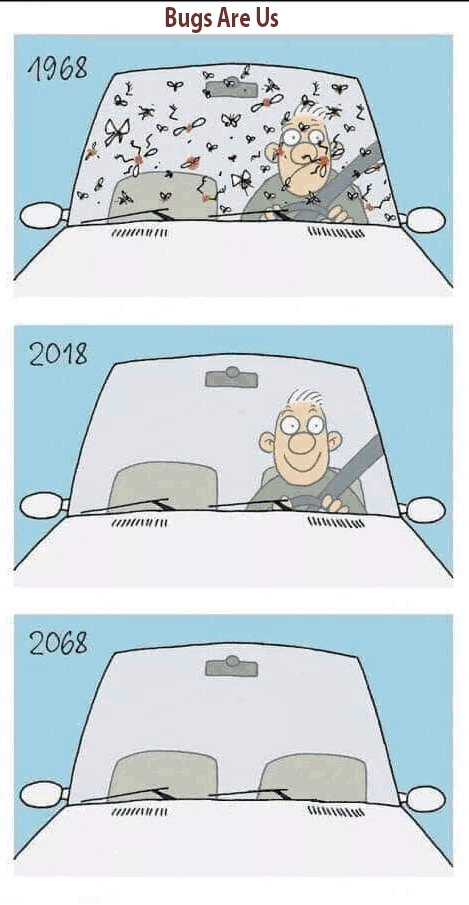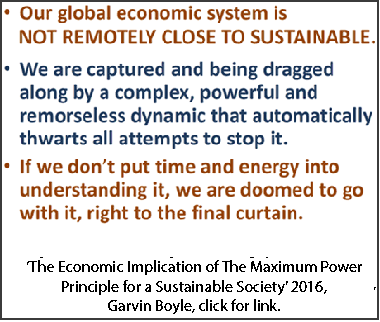.

MONDAY, SEPT 13, 2021: NOTE TO FILE

Quora Q&A 6
More info offered
Eric Lee , A-SOCIATED PRESS
TOPICS: QUESTION EVERYTHING, FROM THE WIRES, TENATIVE ANWSERS
Abstract: So another fifty pretend answers offered. Few comments and no corrections offered, so I only learned from such research as I did for each answer. The number of views is of unknown meaning. The number of upvotes may be interpreted to mean at least that many peple read the answer. Quora changed the graphics, so the series ends .

COOS BAY (A-P) — So answers starting with 251 follow and may be of interest to someone someday. Answers are not really mine. I reference some human sources. If the source, the data, is correct and the interpretation is valid, then Nature answers the question. As 'people would rater believe than know', answers that few or none Like or Share will be ignored, obfuscated, denied, and if necessary the messenger will be vilified, demonized, or killed. But 'my' answers are ignored, so I'm in no danger.
Questions:
251. How much population can Earth sustain, and what happens if there were too many people?
252. What should be the major contribution to tackle climate change, short-term or long-term?
253. Why do so many people believe the natural human carrying capacity of Earth is less than 1 billion people?
254. What has happened to discussions of population control, given that historically humans numbered around 1 billion but now are in excess of 7 billion?
255. What is the point of looking for cures for some of our biggest killers such as cancer, and researching ways of extending life-expectancy? This will only result in further use of resources and subsequently speed up Climate Change.
256. How do we avert an insect apocalypse?
257. Does it really matter if the human species continues to exist and will be able to create a new earth? I came here to help the human species to evolve, but I have troubles seeing the point of it and be motivated.
258. Why is technological innovation treated as a given in future predictions?
259. How would the clash of civilization be in World War 3?
260. Will the starvation rate rise with the population increase?
261. Why is the political process so slow to respond to our ecological crisis?
262. Why did the Rapa Nui civilization collapse?
263. What is the core of human problems, and can science and technology handle it?
264. Are the elites right about the Earth being overpopulated, or is it a hoax?
265. What is modern industrial and urban civilization?
266. What is the most ethical way to reduce the (growth of the) human population?
267. How can we control the human population because animals are in danger?
268. What is the greatest threat to mankind in its environment?
269. What should the people of developed nations do to help stem starvation in underdeveloped areas of the world?
270. What is the basic need for humans, and how do you find the resources?
271. How can we eradicate poverty and corruption in the world?
273. What are the biggest threats/issues to humanity today?
274. How did humans exist for 200,000 years but it took all the way until the final 10,000 year for real progress?
275. How much is overshooting our planet’s bio-capacity?
276. What is the most effective way of world population control?
277. Why can't the human race live in peace?
278. What's a world order, and how do politicians intend to make this a better place?
279. To what extent are we going through the last chance to save the Earth?
280. As a result of technological advancement, nature is being destroyed in some ways like deforestation, ocean pollution, air pollution, plastic wastes. Does it mean that technological advancement is detrimental to humans and animals?
281. North America and Europe have made-up about 10% of the global population historically and yet they have accounted for anywhere from 40% to 80% of global GDP over the past 300 years. Why is this?
282. Why do people say Earth is experiencing overpopulation when there's still so much land on Earth that is uninhabited?
283. Is our planet threatened with complete degradation and pollution of agricultural land? Is our food production capacity actually diminishing?
284. Why is it that the world is going through alot of big problems and challenges and there were no solutions to solve the problems?
285. What's mankind's biggest, relevant, detrimental, and important problems?
286. Why can't this world be a global village without boundaries?
287. Why is moral decadence on the increase in our society today despite technological advancement?
288. Which empire is the most successful throughout history overall?
289. What is going to happen to the world when the planet Earth could no longer sustain its population?
290. Why is life so unfulfilling for the majority of the human population?
291. Do you think humanity is capable of achieving equalibrium with nature? If yes, then when?
292. Why are we divided by country? Is it important?
293. Where were the first human civilizations born?
294. Can technology save us, or is it our end?
295. Would it be better for humanity if the rate of change, especially in technology, slowed down?
296. You must cause the end of the world as we know it, with as much loss of human life as possible. No budget, what is your plan?
297. Who is going to emerge to lead all Nations to save the planet for our children and grandchildren? Will we be generation that failed all of mankind? We ignored and denied ourselves into extension? That is unforgivable.
298. How and why can human rights not be used to solve the problems in the world?
299. What would you use to change the world for the better?
300. What percent of life on Earth is human?
Assume humans come up with an energy source “too cheap to meter”. We can hollow out Earth’s mantel for materials to cover the surface, including the oceans, with cities kilometers deep. And artificial grow lights will light up the tunneled out mantle. We’ll desalinate the oceans and build cites out of salt. The only life on Earth will be humans, pets, livestock, crops, and some plants and animals kept in zoos or gardens to amuse humans. There will be no weeds, no annoying pests or diseases. Humans will build a Dyson sphere that could sustainably support billions of trillions of transhumans by turning all matter in the Solar System into human habitat and using all energy production of Sol to empower humans. We Build a Dyson Sphere: Zero and counting
Earth alone could only support maybe a trillion humans. But most experts think Earth can only support fewer. Some think fewer than 2 billion. That’s why you should believe in the ignorance of experts. If there were too many people on Earth, they would move to the Dyson sphere.
\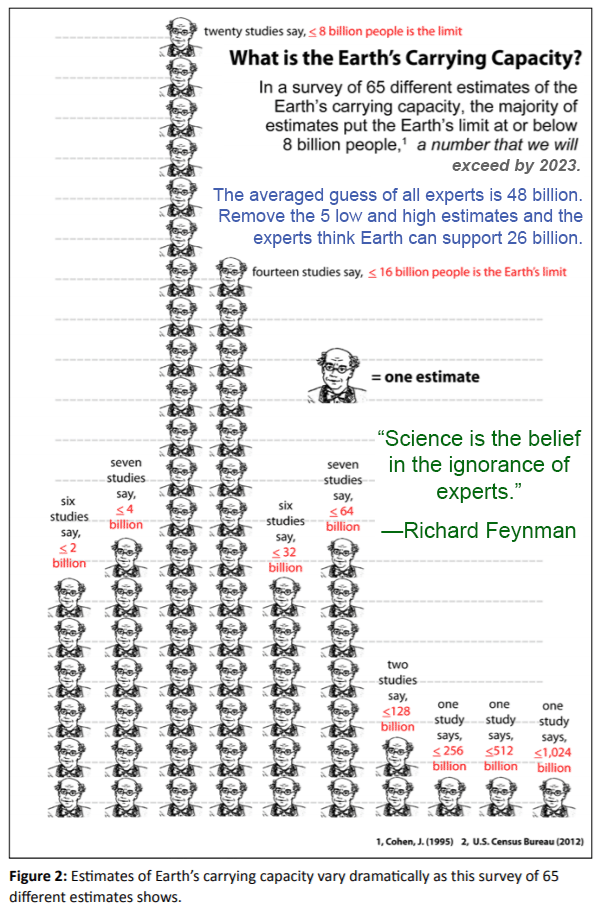
Of course, asking how many humans the planet can support implies that all environmental productivity of the biosphere should support humans (and their pets, livestock, crops, and organisms that entertain humans). This is the view of modern techno-industrialized humans. It was not the view of your ancestors for 300+ thousand years. From their POV, we are a pathological form of anti-life presiding over the greatest mass extinction since the late Cretaceous. But they were just a bunch of ignorant know-nothings who only knew how to live in a state of nature, in harmony with the natural world, as the millennia passed.
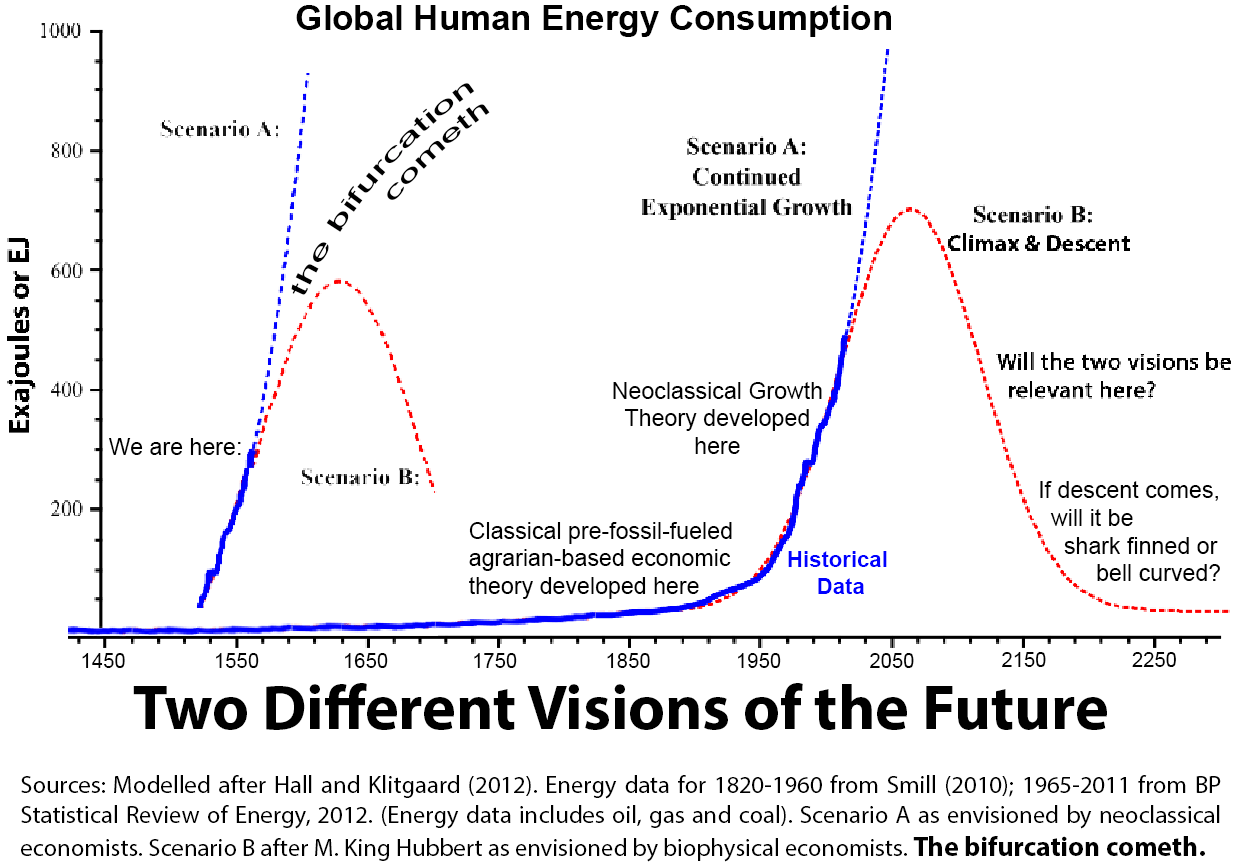
Tackling climate change, focusing on one environmental stressor, is a distraction even if the issue has not been politicized and hence made impossible for political animals, the 99%, to think about objectively. Whether you believe in anthropogenic climate change, whether you are for or against it, is to ignore the bull in a rampage in the planetary china shop. Why? Because we are the bull whose subjective view is that we are magnificent beings who can and will decouple from nature, i.e. we are superior to all other lifeforms (at least on his planet).
The rate of anthropogenic species extinction is now over 1,000 times baseline, heading towards 10,000 times higher by the end of this century. Humans exceeded carrying capacity when the population of our Anthropocene enthusiast ancestors (regionally causing megafauna extinctions on five continents) exceeded a few million. We, evidently, are far more enthusiastic now than they were.
When a species bumps up against the limits posed by the environment’s objective carrying capacity, its population begins to decline. Humanity is now at the uncomfortable point when objective observers have detected our overshoot condition, but the population as a whole has not recognized it yet. As we push harder against the limits of the planet’s objective carrying capacity, things are beginning to go wrong. More and more ordinary people are recognizing the problem as its symptoms become more obvious to casual onlookers. The problem is, of course, that we've already been above the planet’s carrying capacity for quite a while.
One typical rejoinder to this line of argument is that humans have “expanded our carrying capacity” through technological innovation. “Look at the Green Revolution! Malthus was just plain wrong. There are no limits to human ingenuity!” When we say things like this, we are of course speaking from a subjective viewpoint. From this experiential, human-centric point of view, we have indeed made it possible for our environment to support ever more of us. This is the only view that matters at the biological, evolutionary level, so it is hardly surprising that most of our fellow species-members are content with it.
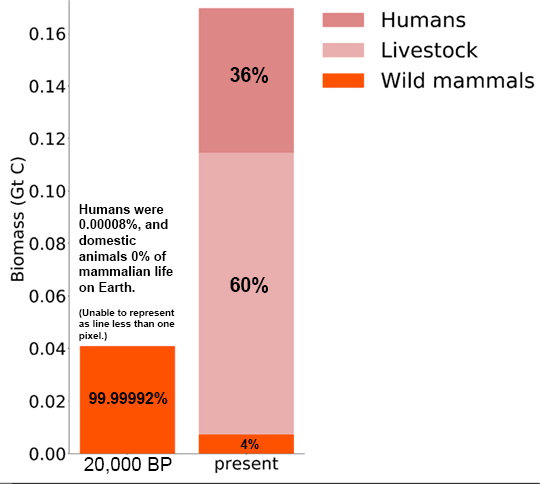
The problem with that view is that every objective indicator of overshoot is flashing red. From the climate change and ocean acidification that flows from our smokestacks and tailpipes, through the deforestation and desertification that accompany our expansion of human agriculture and living space, to the extinctions of non-human species happening in the natural world, the planet is urgently signaling an overload condition.
Humans have an underlying urge towards growth, an immense intellectual capacity for innovation, and a biological inability to step outside our chauvinistic, anthropocentric perspective. This combination has made it inevitable that we would land ourselves and the rest of the biosphere in the current insoluble global ecological predicament.
The solutionatique for our overshoot problematique would be rapid degrowth of the human population and per capita consumption, the major driver of species extinction (and climate change). Oh, but Anthropocene enthusiasts don’t like that answer, so put solar panels on your McMansion and drive a Tesla.
It is entirely possible to graduate with highest honors from a top university and know essentially nothing about overshoot, carrying capacity, sustainability, or that there are limits to growth even if you are a STEM/STEAM/STREAM major. The more inconvenient truth is that most people would rather believe than know. Those who would rather know than believe, who question everything, who reevaluate all values and assumptions, who are abelievers, are some fraction of one percent. This is true for denizens of Facebook echo chambers and most think tanks to which only PhDs who have written at least several books are invited. Because the number of people who understand that we can't grow ourselves out of overshoot (the exact opposite being the case), e.g. via sustainable development, a Green New Deal, or more nuclear (and fusion and Dyson Dots at L1...), is so small and because they're just not listened to, it looks like overshoot will run its course as usual. Carrying Capacity, Overshoot and Sustainability
Our collective inability to think about the possibility that there are or ever could be ‘too many people’ on the planet has a long history that goes up to the time I am typing this. Ouora is one source of evidence. There are several questions on human ‘over’ population with over a hundred answers. Pick all of them and spend some hours scanning the answers and sorting them into sets of essentially the same answer. Do it as a citizen science project. Instead of watching another movie, updating Facebook, or going shopping..., do it.
Assume that most of those who answer questions on Quora think they know enough to have an opinion—not that they do, just think they do. So the data reflects the opinions of experts, whether academy vetted or not (as part of your study, note whether the answerer has a background in a field at all relevant to the question). Some people are more likely to know enough to have an opinion. For example, Richard Feynman is viewed pretty much by everyone who knows enough to do advanced physics as no ordinary genius. Feynman said, “Science is the belief in the ignorance of experts.”
Was he talking about self-accredited know nothing experts from the hood like me? No, he was talking about academy vetted experts like he worked with. My suggestion is that you listen to those who endeavor to listen to Nature who has all the answers. Then ask Nature questions and listen to the still small voice her data speaks. To be a bit more helpful, here’s a short, readable intro:
World scientists’ warning to humanity — Rex Weyler
Rex Weyler ends by noting: "As an ecologist, I feel compelled to ask myself: if the last 50 years of environmental action, research, warnings, meetings, legislation, regulation, and public awareness has proven insufficient, despite our victories, then what else do we need to do? That question, and an integrated, rigorous, serious answer, needs to be a central theme of the next decade of environmentalism."
The Fundamental Failure of Environmentalism — David Suzuki
On his 80th birthday, scientist and environmental activist extraordinaire David Suzuki noted that despite some victories of the David Suzuki Foundation and other efforts by environmentalists over the decades, that meanwhile "the pace of planetary destruction has not slowed ". Maybe there are no political solutions. Maybe any "integrated, rigorous, serious answer" will be wholly outside humanity's (including political activists to full-on eco-fascist revolutionary environmentalist's) current Overton window of thinkable discourse—for a time—yet know that things change, "this too, shall pass away", so learn now while access to viable information is still out there.
And always vet the source first (e.g. Weyler, Suzuki and who, if anyone, is publishing them, media bias/fact checkers are your friend and so is Wikipedia if you understand its limitations and bias). ALL UNVETTED SOURCES ARE NOT. Could a source know more than you do? Maybe. If so, maybe resist letting screens distract you and consider that:
WE WERE WARNED
(longer list here)
Harrison Brown, The Challenge of Man's Future 1954
Aldous Huxley, TV Interview 1958
Population, Evolution & Birth Control 1964, A Collage of Controversial Readings [from Han Fei to Garrett Hardin]
A Blueprint for Survival 1972
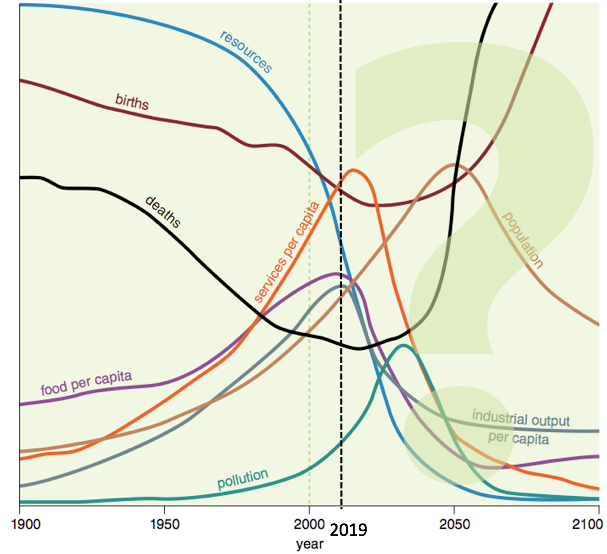
Overshoot: The Ecological Basis for Revolutionary Change 1980
A Planet for the Taking 1985
An Appeal for Joint Commitment in Science and Religion 1990
Elder Brothers' Warning 1990
World Scientists' Warning to Humanity 1992
Joint statement by fifty-eight of the world's scientific academies 1993
The Anthropocene: conceptual and historical perspectives 2011
Aluna: Elder Brothers' Second Warning 2012
Consensus Statement from Global Scientists 2013
World Scientists’ Warning to Humanity: A Second Notice 2017
Worsening Worldwide Land Degradation Now ‘Critical’ 2018
Living Planet Report of 59 global scientists & overview 2019
The State of the World's Biodiversity for Food and Agriculture 2019
Nature’s Dangerous Decline ‘Unprecedented’ (IPBES) 2019
World Scientists’ Warning of a Climate Emergency 2019
A Discussion and Call to Action on Global Catastrophic Risks 2020
(38 in roundtable, Part 1: Warning. Part 2 and 3: no 'real solutions' considered as consensus limits thinking.)
Wildlife in 'catastrophic decline' due to human destruction, scientists warn 2020
Limits to Growth Updated, Harvard & Yale 2020
Tim Garrett's Audio Warning 2020
International Scholars Warning on Societal Disruption and Collapse 2020
Underestimating the Challenges of Avoiding a Ghastly Future 2021
Freshwater fish in 'catastrophic' decline 2021 BBC summary
FINAL REPORT- Delivering the Human Future 2021 No real solutions
(The world needs a ‘survival revolution’ on a scale far larger than the ‘industrial revolution’)
Global Trends 2040 (2020 may look like the good old days) 2021
WORLD SCIENTISTS’ WARNINGS INTO ACTION, LOCAL TO GLOBAL 2021
(Now yelling and swinging the 2x4 against blindered heads harder)
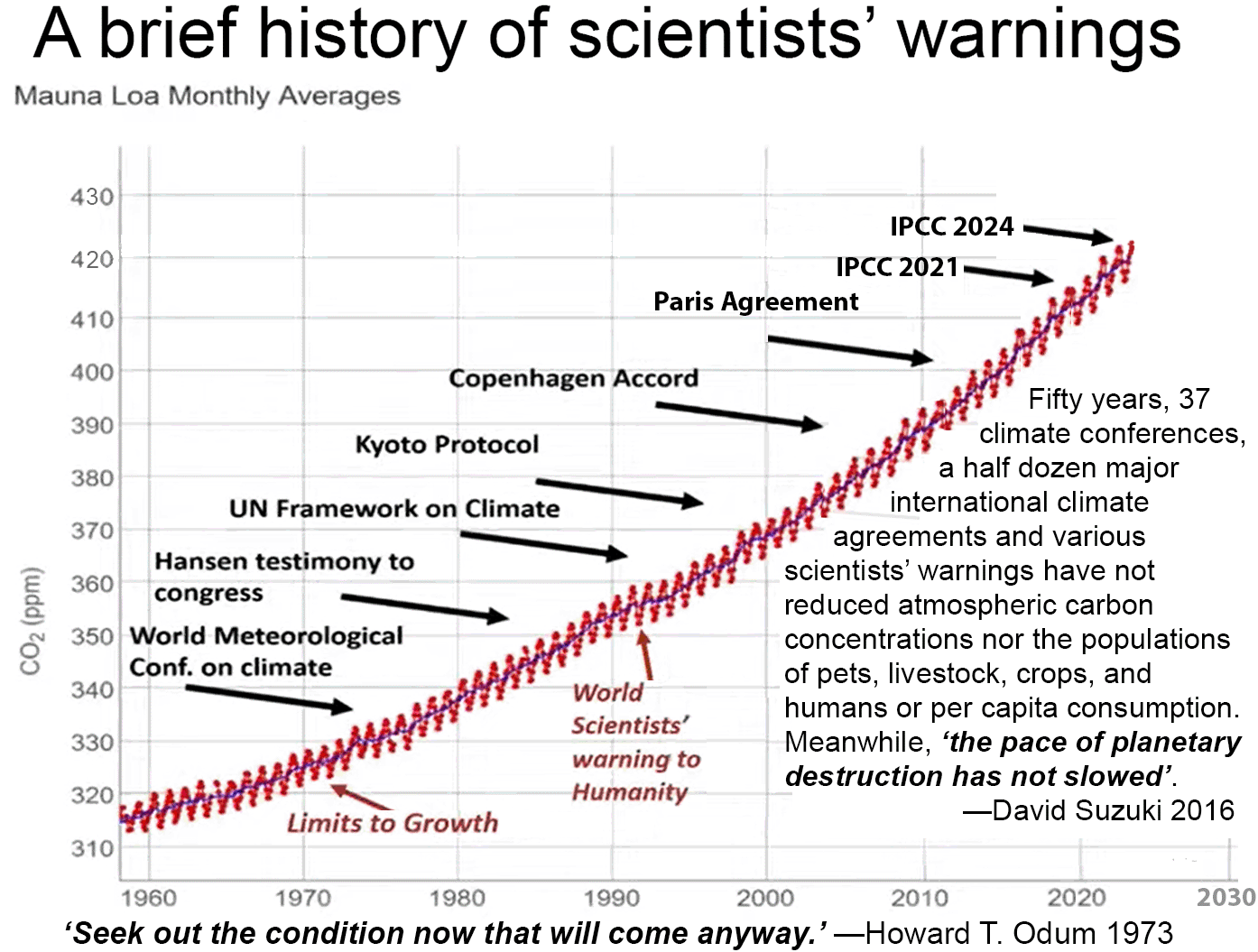
[Imagine that a world scientists' warning has a different outcome (maybe) than all prior ones. A month passes, a button is pressed and 20,736 world leaders (from top down) become unstuck in time. They have no distractions, no need to sleep, eat, breathe, have sex, or garner social approbation. For a timeless period they are intensively educated. Everything every world scientist has to teach is assimilated. The ether they inhabit is incompatible with error, and so all error associated with the warnings has been filtered out and as they now know everything that matters that every scientist had to teach, each leader far exceeds any of their individual teachers in understanding the human predicament. In the end all have triumphed over their inability to understand the implications of the exponential function. There is nothing more to learn about thermodynamics, the energetics of complex systems, carrying capacity, or overshoot. That humans are subsystems of Gaia from whom no decoupling is possible is as mother's milk to them. Thinking in systems has become child's play. In less than a heartbeat they find themselves back in their positions of power, privilege, and prestige as top government, business, media, NGO, military, university and religious leaders. All receive an invitation to join a Zoom meeting of 20,735 other leaders to discuss coming up with a plan of action to turn MTI (modern techno-industrial) society (that automatically thwarts all attempts to change its trajectory) into its opposite. The newly educated world leaders are 0.0001939% of the human population, but nearly 0.0004% of we adult hu-mans they serve or pretend to rule as leaders, i.e. 'mere puppets they, who come and go at bidding of vast formless things'.]
Update: Leaders did not grow the fossil-fueled modern techno-industrial socio-political economic system [MTI Empire], nor can they degrow it. Of the 20,736 leaders, some acted on their understanding and were rapidly selected out of the system. Others, in all knowingness, go with the humancentric flow to nudge it as best they can and thrive. After retirement, they attend Club of Rome meetings. There are no political solutions.
"In order to change an existing paradigm you do not struggle to try and change the problematic model. You create a new model and make the old one obsolete. That, in essence, is the higher service to which we are all being called." —R. Buckminster Fuller
In an alternate time line, the leaders are randomly divided into 1,728 groups of 12. Each group spends six months getting to know each other and discussing the human problematique (while adding to their understanding of it). Each group then selects a leader who can be replaced at any time by consensus of the eleven. The 1,728 leaders are randomly divided into groups of 12 who take a year to get to know each other and discuss issues. They agree upon who represents them. The 144 second cut leaders repeat the process. In a year there are 12 leaders able to make rapid emergency decisions. Of the 12 on the High Counsel, one would serve, for some hours as the supreme leader of the sapientocracy, to make decisions in extreme emergencies before the other 11 could consider the issue, whose decision would strand until the 144 could consider the issue and so on to the 20,736 representatives of each Watershed Management Unit of Earth. Only those who demonstrable knew enough (about the limits of their knowledge) to have an opinion would serve, for a time, to offer their best posterity and biosphere serving guess.
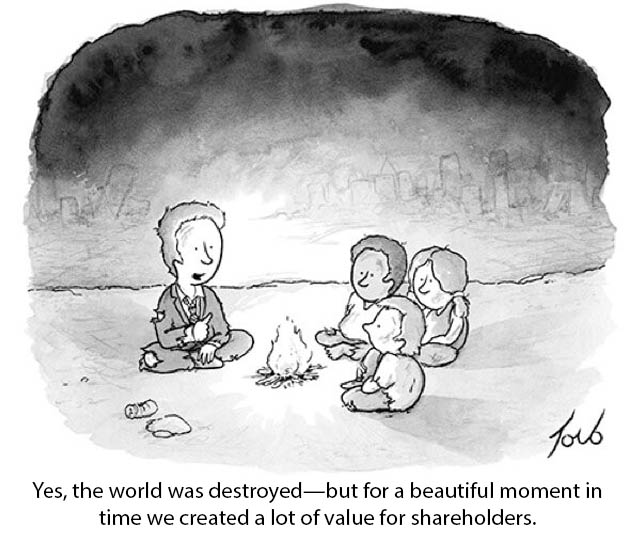
253. Why do so many people believe the natural human carrying capacity of Earth is less than 1 billion people?
Actually few people, some fraction of a percent, think that Earth’s maximum sustainable human population is less than 2 billion. No public intellectual who is or wants other thought leaders or the public to consider them credible, can say ‘1 billion or less’. They can say ‘2 billion or less’ provided they don’t say how much less. This allows others to assume they mean 2 billion or maybe only 1.95 billion. Any academic who thinks 1 billion or less and says so has tenure and doesn’t care what other people think.
The UN asked experts what they thought the maximum ‘carrying capacity’ of the planet is. If any said 1 billion or less, they were judged not to be experts and were dismissed.

Cited by authoritative BBC article in 2016.
I know of experts, e.g. Cornell University’s David Pimentel who thinks maybe 600 million, and systems ecologist Howard T. Odum who guessed 500 million, and others who are dead or retired and no thought leaders, the media, UN, or pretty much anyone who wants to seem credible by telling people what they want to hear reference them.
Assume the maximum population is 500 million to 2 billion. I know one ecologist who asked his collogues what their best guess was and over 30 answered. The range was 50 million to 2 billion. The 50 million guess assumed that most humans were not living like 17th century serfs working all the livelong day to support the 20 percent or so who didn’t work in agriculture,
But what if you don’t want to know the maximum. Humans began to regionally exceed carrying capacity over 20 thousand years ago as they caused megafauna extinctions (dozens of species larger than 100 lbs) on five continents. The human population was about 5 million. By about 3k-4k years ago agriculture was widespread. The human population was about 35 million and the populations of domestic livestock was vastly more. Significant amounts of biome land area was converted to cropland/range/pasture to divert as much primary productivity to humans as possible and away from the thousands of other species who had depended on the diversity of life in the area.
The biodiversity was greatly diminished and some species of plants, animals, and fungi started to go extinct at rates well above baseline extinction rates. The rate of anthropogenic species extinction is now over 1,000 times baseline, heading towards 10,000 times higher by the end of this century. We didn’t start causing species extinction in 1970 when many seem to think we went into overshoot. We started causing significant species extinction 3k-4k years ago.
Causing significant species extinction is by definition to exceed carrying capacity. Carrying capacity: the population of a given species that can be supported indefinitely in a defined habitat without permanently damaging the ecosystem upon which it is dependent; the number of people, other living organisms, or crops that a region can support without environmental degradation. Causing species extinction is environmental degradation. Carrying Capacity and Overshoot
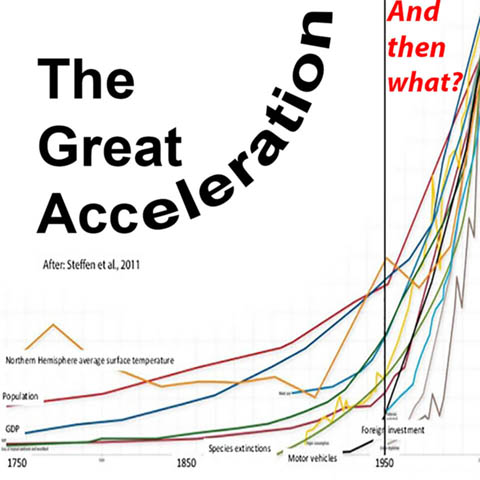 So if you want to know what the maximum sustainable human population might be, you are assuming that all environmental productivity is exploited to support humans, pets, livestock, tree farms, pastures, and crops. The answer may be 1 billion, but asking what the carrying capacity of the planet is for humans who do not cause species extinction nor whose footprint prevents the evolution of new species to replace anthropogenic losses, and the answer is something in the 7 to 35 million range.
So if you want to know what the maximum sustainable human population might be, you are assuming that all environmental productivity is exploited to support humans, pets, livestock, tree farms, pastures, and crops. The answer may be 1 billion, but asking what the carrying capacity of the planet is for humans who do not cause species extinction nor whose footprint prevents the evolution of new species to replace anthropogenic losses, and the answer is something in the 7 to 35 million range.
This is the objective answer. Maybe 99.999% of humans don’t like the objective view, but Nature doesn’t care what humans think. We are in overshoot. The Great Acceleration will be followed by a Great Contraction that no one is going to vote for. Everyone may have voted for growth, but that isn't why exponential growth happened. And it didn’t happen because we know a lot and have invented impressive technologies.
We learned to turn fossil fuels into food (and a bunch of other stuff), But without fossil fuel inputs into our modern techno-industrial society, we will grow maybe 1/10th as much food and transport it maybe 100 miles (not 1,500 on average as now) to get to the end of someone's fork.
At the end of the Great Contraction there may be 500 million humans living on a severely degraded planet. Likely at the height of the Indus Valley Civilization, very few guessed that there would be a Great Contraction. They didn't have tinfoil to wear, but they would have been dismissed as ignorant know-nothings by the 99+ percent.
It is entirely possible to graduate with highest honors from a top university and know essentially nothing about overshoot, carrying capacity, sustainability, or that there are limits to growth even if you are a STEM major....
254. What has happened to discussions of population control, given that historically humans numbered around 1 billion but now are in excess of 7 billion?
In the 1700s, European population growth was fast enough to be noticed over the course of a lifetime (so far, in my lifetime, world human population has nearly tripled in 68 years). something unknown to almost all of our ancestors, and after Malthus published his essay on population in 1798, the issue was discussed for several decades. Population growth seemed normal for about 130 years until the Great Acceleration of 1950 was noticed by those paying attention and the “And then what?” question was asked.

For a few decades, population growth was discussed and some professors spoke of it during university classes, but by the 1990s, a consensus again arose that the subject was too problematic (was a wicked problem) and there were no politically viable (or religious) solutions, so don’t talk (or think) about it. A few did and continue to, but they are a thin sliver of 1 percent. The whole matter is just a bummer, dude, so don’t even. Now, on campus, if you express ‘over’ population concerns, you are liable to be viewed by those in the know as being a racist who wants to kill black babies. That there are limits to growth is no longer spoken of. Denial, as Mark Twain noted, is not just a river in Egypt.
The trajectory of a plague phase population and its outcome is a well known ecological pattern. Among humans, for about 10k years, regional growth enabled empire building. Regional population pulsed, overshooting both social density/complexity limits and regional environmental productivity (e.g. deforestation followed by soil mining/degradation/erosion was common).
By the late 1960s the 4–5 children per woman norm began to change. Continued population growth rate of 2.1%/year would double the world’s population to 7 billion in 33 years. It actually took 45 years to double the population, but in 1968 that would not have been an obvious best guess. We are still adding over 80 million humans a year to enjoy their Anthropocene.
The foundations for a ‘Green Revolution’ had been laid, but most experts failed to foresee that food production could be tripled by turning fossil fuels into food on an industrial scale, thereby, for a time, turning fossil fuel energy into food energy faster than the population was growing.
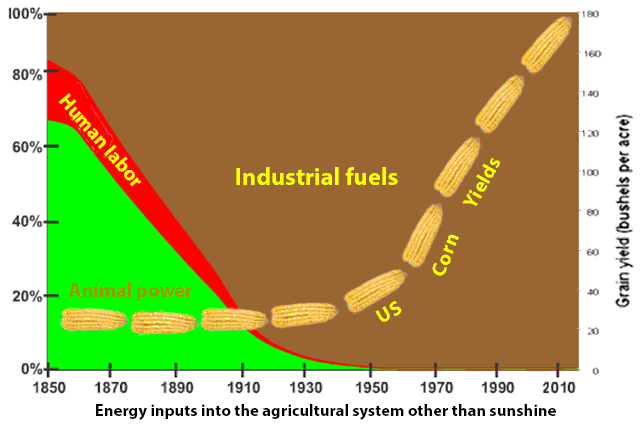
The deeply held belief that our food production system is not only sustainable, but we’ll not only continue to turn natural but arable lands into farmlands, pasture, orchards, tree farms, and waterways into aquafarms, but we’ll desalinate seawater and irrigate the deserts of the world. A hundred story vertical farm will produce a hundred times more food in a city near you. But as Zhuangzi noted, ‘those who dream of the banquet wake up to lamentation and sorrow’.
This vision of more, evermore, however, is merely belief-based, decoupled from biophysical reality. That we live in error, ignorance, and illusion is only evident to the biophysical systems science literate (ecolate). For most humans, denial will be doubled down on well into the coming bifurcation.

All educated people know about (have heard of) ‘carrying capacity’ and ‘overshoot’. They comfortably believe they have nothing much more to learn about such ecological matters that apply to wild animals.
It is entirely possible to graduate with highest honors from a top university and know essentially nothing about overshoot, carrying capacity, sustainability, or that there are limits to growth even if you are a STEM major....
255. What is the point of looking for cures for some of our biggest killers such as cancer, and researching ways of extending life-expectancy? This will only result in further use of resources and subsequently speed up Climate Change.
This question focuses on climate change and our consensus belief that extending human life is unquestionably a good thing, i.e. that human short-term self interests are supreme. It may be of interest as thinking about the big picture implied question is unthinkable to most people. So to start, consider this recent story that the media will be repeating in like kind:
Silicon Valley is chasing the fountain of youthLet’s say that next year someone finds a cure for aging. Take a pill (it’s cheap) and stop aging. The only cause of death is misadventure (so average life expectancy is 800 years). What’s not to like? What could go wrong? Surely only ecofascists would be against this new technology (they’re misanthropes who are even against cars).
Billionaires, and almost everyone else (who are not ecologists or able to think about the consequences of ‘curing’ the 'disease' of aging) are willing to buy into any technology that maximizes human short-term self interest. The result is the modern techno-industrialized society we live in (for a time as the system selects for its own failure).
The big picture question is: What is the point of living the humancentric life that selects for a future posterity increasingly can’t live in? Why create a future that maximizes dysfunctional humans and destroys a planetary life-support system to maximize short-term consumption and self interest as perceived by the increasingly dysfunctional living in a state of error, ignorance, and illusion, not to mention denial?
In the 1970s the problem was thought to be changes in ‘the environment’ or ‘overpopulation’. Now it is ‘climate change’. There actually is a Hydra-headed ‘ecological crisis’. The climate is being rapidly and remorselessly altered. That there are too many humans consuming too much while burning through a planetary larder of fossil fuels (for a time) seems like the best thing that could happen during the growth phase of our overshoot. But as we reach climax of the system, the unquestionable good of growth will seem increasingly questionable, and as increasing numbers of humans start to look over the energy cliff with that deer-in-the-headlights look, then real change may become thinkable but likely too late to allow even a remnant population to transition to a viable civilization.
Climate change, overpopulation, environmental degradation… are symptoms of a plague species pulsing into global overshoot.
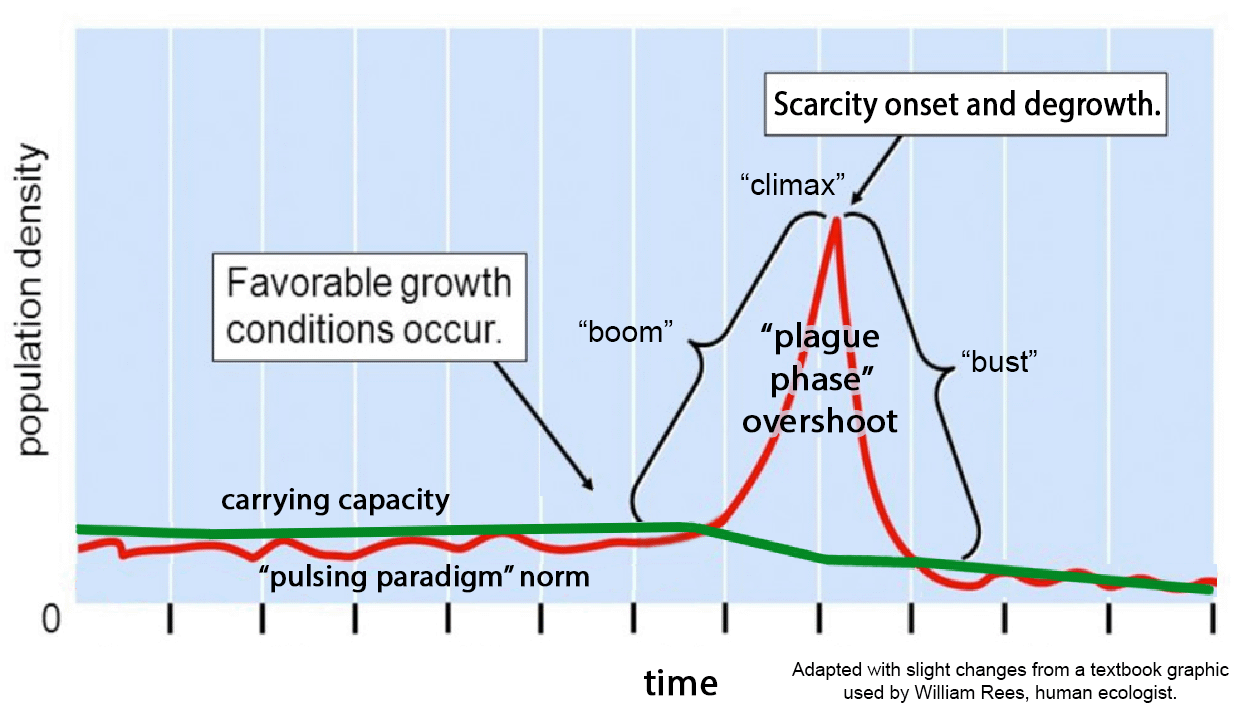
It is entirely possible to graduate with highest honors from a top university and know essentially nothing about overshoot, carrying capacity, sustainability, or that there are limits to growth even if you are a STEM major....
256. How do we avert an insect apocalypse?
Basically it is too late. I recall in the 1960s on cross country (US) car trips as a child that we had to stop the car often not just for gas, but to remove all the insects from the windshield so my dad could see out of it. Back then there were no gas stations; they were service stations and the attendant always had to clean the windshield. We would stop at times in between getting gas so my older brother could do it. A 2011 estimate is that only 32.5 trillion insect deaths in the United States each year were caused by vehicles, a tiny fraction of the roadkill rates I remember.
https://en.wikipedia.org/wiki/RoadkillI also recall in the 1960s when the fog truck came into our neighborhood (Merced, CA) and all us kids would run back and forth through the fog. The truck was spraying the fog mist for mosquito control. They were spraying DDT (as I now know).
Today (and for decades) it is home owners who buy vast quantities of pesticides to make their lives better, and agrobusiness does the same because consumers demand it (except for the few willing to pay more for organic foods), and farmers (and their bankers) like to avoid crop failure (or lower yields).
This spring my wife (who has similar memories) and I went to a small state of Oregon park having some of the last old-growth Douglas Fir trees in the state. We had a ‘Nature scavenger hunt’ list that someone had given out for Earth Day and I recall hiking miles amid nature in full bloom looking for a ‘bee’, but saw none. I saw a dipteran that looked like a bee, but is a bee mimic, so I knew enough not to count it (I took entomology in college and my required for the class insect collection included 127 families I managed to key out; the professor was impressed, by far the largest number in the class, and he grilled me to confess that my uncle or someone is an entomologist who specialized in hymenopterans, but I couldn’t as I didn’t have any help). When I got home I went to a neighbor’s fruit tree that was covered in bloom and stood for 5 minutes before spotting not one, but two species of native bees (four individuals total). Fifty years ago I would have heard the buzz before I got close enough to see what kinds of insects were mobbing the tree.
I belong to a listserv of about 40 mostly retired scientists/academics and reported my finding. A number of others told similar stories from their neck of the woods (e.g. Canada, Eastern US, UK, Germany).
insect apocalypse at DuckDuckGo
Oh, and if we can’t avert the loss of biodiversity, what would mitigate the loss and allow new species to evolve to replace, in only 10–25 million years, those already and soon to be extinct? Easy-peasy humans: Rapid human population degrowth and contraction of the global economy.
ecological overshoot at DuckDuckGo
But don’t worry, you don’t have to do anything.
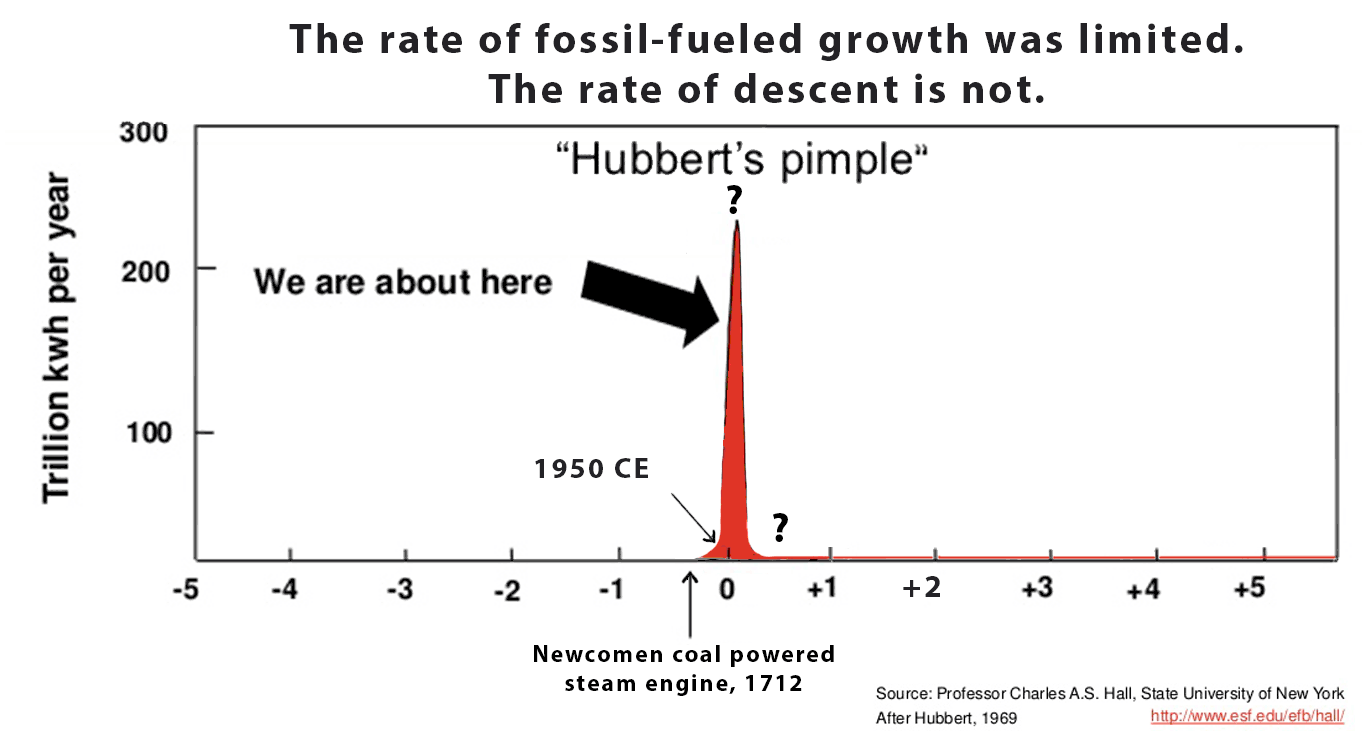
So enjoy life while you can (or learn about carrying capacity, overshoot, sustainability, limits to growth, and what a viable ecolate civilization might look like so you can maybe make it so).
Carrying Capacity and Overshoot
Boiling it down:
Humanity is colliding with Nature.
A damaged biosphere will persist.
We humans may not be part of it.
There are no political solutions.
Note: In 24 hours, this answer received 16.8k 'views', 27 upvotes, and 4 comments; after two days 25k views, 45 upvotes, and 12 comments. Most 'answers' or offerings are at most a one day 'thing' before views fade away. Of 352 answers, the average views is 394, though removing the top and bottom 10, and the average is 170 in a range of 4 to 1k. This answer had a longer life, about a week, and total views of 39k (and 73 upvotes, 22 comments, and 6 shares). The second most viewed answer had 9k views, so this one was exceptional, but likely only because Quora happened to promote it for no particular reason than someone on the staff liked the first image and included it in their 'Daily Digest' email sent to untold tens or hundreds of thousands.
One comment: 'I’m curious what you mean by “There are no political solutions”'?
Reply: I’ll cite my friend Garvin Boyle who got me started answering Quora questions. One of his presentations was in 2016 at the International BioPhysical Economics Society conference. http://www.isecoeco.org/wp-content/uploads/2016/09/Boyle-Gavin-economic.pdf
One slide was especially powerful:
The Feudal system in Europe was agriculture/land based and selected for waring principalities/city states empowered by the agricultural productivity of serfs. To get the serfs, the 80%, to work all the livelong day to support the aristocracy, priests, merchants, craftsmen, and soldiers/sailors, it took religion to justify the system, specifically the doctrine of the divine right of kings, aka God’s mandate.
When the power shifted from agriculture to wood-based mercantile-industrial nation-state empire building, wealth shifted from the aristocracy (land owners) to the merchant class and their politicians. As the forests of Europe were reaching peak trees (it took about a thousand old growth oak trees to make a large galleon or merchant ship), clever apes learned to burn coal and keep on keeping on to have an empowering (by fossil fuels) Industrial Revolution.
The religious control system was no longer needed to normalize the new economic system, and power shifted from the Church to the classical and then neo-classical economists who were needed to justify the new system (more efficient than serfdom or slavery) of wage slavery/factory workers. They sang a new song for those whose bread they ate of ‘Growth’s mandate’. They are still singing it, for a time for as long as people can still believe them, to the empire building people/politicians/CEOs who pretend to run the show.
The modern techno-industrial system we are all part of and serve (with varying levels of enthusiasm) is NOT REMOTELY SUSTAINABLE as scientists who were/are paying attention have been warning for over 50 years. That there are limits to growth, that we are well into overshoot, largely goes unmentioned by any professors in today’s higher (or teachers in lower) education (schooling) system. (Quora Answer 152)
If you consider the last 50 years of activism and scientist’s warnings, and note that meanwhile the pace of planetary destruction has NOT EVEN SLOWED, then it should be painfully obvious that there are no viable political solutions that could remotely address our condition of overpopulated, overconsuming overshoot by modern techno-industrialized humans laying waste (unintentionally) to a planetary life-support system (including insects whose biomass has been cut 75% in the last 30 years and maybe 90+% in the last 50 years).
We need to consider not keeping on keeping on repeating the same pattern, i.e. we need to lay waste to all belief-based political systems by changing the rules of the game. Down with democracy (autocracy et al.) and up with naturocracy, rule by nature’s laws and not by the short-term self interests of posterity blind (and energy blind) humans whether autocrats or We the People. Down with humancentric belief-based thinking one mind at a time (beginning with your own), sooner being better.
Note: climate change is merely one symptom of overshoot. If we could press a button and tomorrow the climate was back to 1950 norms, our trajectory, the Anthropocene, would remain the same. Climax might merely be delayed a few years, so don’t be distracted by politicized issues while ignoring/denying all the others.
Another comment, from a polymath scholar with STEAM interests and a degree in science:
Carrying capacity is not fixed. This is why Malthusian predictions have been wrong time and time again. As technology advances, we are able to access more of the environment's energy and use it more efficiently.
Is there an actual upper limit for carrying capacity? Depends on what physical model of reality is correct, but let’s say there is. Well, it’s astronomical, literally.
While we have repeatedly overshot, and it can be rough, we very quickly compensate with the innovation of new technologies.
My reply: Absolutely right. Carrying capacity is not fixed. That’s why K-strategists like humans bump up against their biome’s carrying capacity for millennia, or even an eon or two, and as environmental productivity varies, so too their population. This is what the Odums called the pulsing paradigm. Carrying capacity also pulses with higher/lower annual rainfall, following a fire…, or with environmental degradation caused by a plague species which could also be an invasive species.
And Malthus completely failed to predict the extent to which humans could turn fossil fuels into food, which would include the use of tools (e.g. steel ploughs) made using fossil fuels or fertilizer (e.g. guano) transported by steam ships/trains.
Even the agricultural experts consulted by Paul and Anne Ehrlich for their 1968 book, Population, Resources, and Environment (to use the title they regret not using), failed to foresee the developing Green Revolution that would soon turn fossil fuels into food faster than than the human population could grow (for a time). The Population Bomb - Wikipedia
As Hall & Klitgaard note in Energy and the Wealth of Nations: An Introduction to Biophysical Economics, energy is literally the precondition for everything, e.g. the flow of all material and production in an economy, including financial economies. We must follow the Fourth Law of Energetics or be selected against.
Before agriculture, there was maybe 5 million humans on the planet, but they had not yet occupied all niches (e.g. Pacific islands) and the carrying capacity of the planet could have been several millions more. Without agriculture today, far fewer could be supported due to widespread environment degradation. But within a thousand years, most soils would have recovered, so some population growth would be allowed.
As David Pimentel, a professor emeritus of Insect Ecology & Agricultural Sciences at Cornell University, guesses, global agriculture, without fossil fuel inputs, could support as many as 600 million humans sustainably if all primary productivity is diverted to support humans and their pets, livestock, and crops (and provided 80% of the population, 480 million, live as 17th century serfs working all the livelong day to support the other 20%) and H.T. Odum, systems ecologist, guessed maybe 500 million. Could the real answer be 700 million? Okay, maybe.
If no one works as a serf and room is left for nature, low intensity agriculture might support 35 million. Or maybe 50 million. No one really knows. In the long run, climate will change and the average global carrying capacity will go up or down, and human population with it because, well, the 4th law applies to us clothed apes too.
But as I predict, in just a bit over 2000 years humans will complete their first Dyson sphere that will sustainably support a population of 29 billion billion humans, or 4 billion times more than Earth does at present. A Dyson Sphere is Constructed: Currently zero in the universe and counting
Sadly, it is entirely possible to graduate with highest honors from a top university and know essentially nothing about overshoot, carrying capacity, sustainability, or that there are limits to growth… Quora Answer 152
257. Does it really matter if the human species continues to exist and will be able to create a new earth? I came here to help the human species to evolve, but I have troubles seeing the point of it and be motivated.
That all organisms in effect exist to help their species evolve by living a life that works and thereby contributing genes or memes to future generations (by not dying first) is a plausible interpretation of life on the only rock we know of. The problem is that we are all products of and serve modern techno-industrial society, the now global monetary culture, which is not remotely sustainable as it is a dissipative, adaptive, yet non-evolvable system.
Whirlwinds and hurricanes are dissipative and adaptive, but not evolvable structures. A whirlwind seen by dinosaurs would be indistinguishable from one you may have seen. Evolvable life that persists changes. Our modern empire building culture, like all prior empire building societies, will fail to persist.
So for modern humans, a plausible purpose would be to first become a member of an evolvable society/civilization. A metastatic tumor is also a dissipative, adaptive, yet non-evolving structure. If you are a cancer cell, you might agree to stop growing, but even if you convinced 99% of your fellow cancer cells to also stop growing at the expense of the body all depend on, the 1% would continue to grow at your expense unless you (the body) destroy or contain them. Sorry about that.
Of interest is that the body of an organism being destroyed by a metastatic cancer is not entirely analogous to a species growing at the expense of a planetary life-support system. In the biosphere a plague species always prospers for a time at the expense of the surrounding biome prior to collapsing their population to a lower level due to environmental degradation (or they go extinct) to thereby allow for biome recovery.

Humans could be extinct in 100 years (more or less). Or a remnant population likely passes through the coming ‘bottleneck’. The question then is will humans merely continue to repeat the pattern until they can’t (i.e. until they can’t because they eventually do go extinct)? Will humans eventually come to understand the planet and learn to live with it properly to thereby be evolvable?
Maybe, which is to say some humans could cease to be modern techno-industrialized non-evolvable pathogens in a growth hegemon, pass through the bottleneck, and live in a viable civilization that is able to prevent the loss of functional behaviors. So, how can we help humans (starting with ourselves) become evolvable again and evolve as the millennia pass?
258. Why is technological innovation treated as a given in future predictions?
Because techno-optimism is the last stand of we modern techno-industrialized humans who are energy blind, time blind, and posterity blind. Technological innovation has occurred during the growth phase of our pulsing into overshoot as a global invasive species during our plague phase. Technology was needed to exploit a planetary larder of fossil fuels and other resources, but it empowers nothing. Without diesel, for one of a googolplex of possible examples, the computerized tractor (soon to be autonomous on AI farms) that helps turn fossil fuels into food will become a lawn ornament and roost for chickens.
But we’ll put vast solar PV arrays in orbit that will beam back microwaves to power our electric tractors, trucks, cars, ships, planes, and rockets to put more PV arrays in space while we transhumans, who have cured aging, build our Dyson sphere. We would be Borg if we could be. Given the lack of infrared emitting galaxies out there, I’m guessing we won’t. I hope I’m not wrong.
Like those living during the peak of all prior empires, we collectively must believe that we will be the exception that succeeds in keeping on keeping on forever. If told that energy is the precondition for growth, we will insist that we clever and clothed apes will innovate our way forward, sustainably of course, and develop energy sources (countless as the sand grains of the Ganges) that are too cheap to meter to thereby remain Lords of all that we survey. Hu-mans awake! Know then thyself.
We are all products of a failed education system, one that is actually a schooling system that prepares us to serve, for a time, the growth hegemon (but don’t tell anyone). It is entirely possible to graduate with highest honors from a top university and know essentially nothing about overshoot, carrying capacity, sustainability, or that there are limits to growth even if you are a STEM/STEAM/STREAM major....
259. How would the clash of civilization be in World War 3?
You can’t have a clash without clashers. There will be three as if only two, one will, by whatever means including luck, win and there would be no one to clash with (blame for failed polices), so a one empire world would have to split up by civil war and it won’t matter if everyone or no one voted to make it happen. If more than three contenders emerge, conflict would continue until there are three left. If only two or one is left, then the condition is not sustainable. If you don’t know this, you didn’t go to an Ivy League school that educates (schools) most future leaders.
For continuous (sustainable) empire building, there has to be three global superpowers. We failed in WWII to achieve a sustainable global social system, one that could persist long term. But WWIII is shaping up to be the one that achieves the globe’s first sustainable complex (hence tripartite) civilization.
Three is the number, provided that all parties realize that if one superpower is at risk of winning in a conflict with another, that the one not involved always takes the side of the weaker. Their combined power always trumps that of the temporarily stronger power, thereby weakening it, depowering them to achieve peace (war is peace, stupid).
A period of détente follows for a time until, perhaps by chance alone, one becomes powerful enough to threaten a weaker power (and so must). But the power in the middle takes the side of the weaker and the pattern of sustainable conflict can continue forever.
Part of the planet will be the ‘disputed area’ where all the conflict actually takes place. Each power can send their surplus population to the front (especially malcontents), and so the planet never becomes overpopulated. The citizens of each superpower (collectively known to the scientists as the superorganism) will always have an enemy to hate and revile (which can change instantly if the Great Leader says that they are now our true friends (and always have been).
Since wars are always in the disputed areas, all the citizens live in peace and prosperity preparing for the next war or supporting the current war. Those who go to the front (and come back), are celebrated as benefactors of humankind who alone ensure that complex societies (all three of them) can keep on keeping on forever (or until Klaatu or the Klingons come).
For a time the three empires didn’t have a name as citizens persisted in identifying with the nation-state they were born into that had effectively faded away after WWII into an amorphous global economy, a monetary culture worshiping pretend wealth. But this condition was only stable enough to persist during the period of exponential growth, the Great Acceleration, that kicked in about 1950.

Of course such growth couldn’t continue for even a century, so when scarcity induced conflict began to increase again in the early 21st century, world leaders, realizing that only a tripartite global empire was sustainable, conspired to form three superpowers by mid century. Elites have known since the 1940s that the coming growth phase was not sustainable and a tripartite world would replace it, but only after the growth had enriched them beyond dreams of avarice. Ivy League universities have been grooming current and future leaders to transition to the inevitable tripartite new world order in the making for 70 years. As wealth making is winding down, the best of all possible worlds is planed to be fully in place and functioning by 2084.
The result was sustainable; the overpopulation problem was solved, and more importantly for each empire, those who just couldn’t learn to love living in their special empire (that was vastly better than the other two), could be sent to a disputed area (where some primitives still lived) to go away or be turned into heroes. The system worked, and anyone who didn’t like it, well, everyone knew where they could go.
Oh, and the three superpowers were eventually called Oceania, Eurasia, and East Asia. And humanity lived happily ever after as those who didn’t... went away,
260. Will the starvation rate rise with the population increase?
While over 80 million more mouths (human) continue to be added annually, the rate of turning fossil fuels into food has exceeded population growth for the last 200 years. Production of conventional oil likely peaked in 2018 as will coal, gas, and our belief in alternative empowerment in a few more decades. A likely future is one in which energy consumption per capita declines faster than population degrowth.
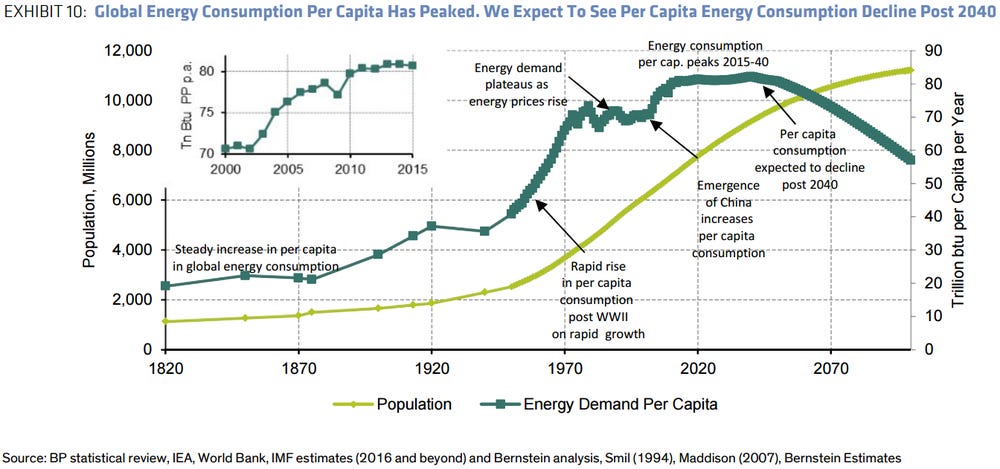
The light green line is based on UN demographers' projection (who are energy/systems ecology blind), not on biophysical reality. With declining net energy from all sources, including food, the population will peak and decline not as shown. No one will vote for this to happenm, nor will any Great Leader you vote for significantly alter (except maybe for the worse) our trajectory.
What 100 percent of Anthropocene enthusiasts can’t think is that while growth is the best thing that could ever subjectively happen to humans or any other species, growth beyond carrying capacity (not as temporarily enabled by rapidly consuming a planetary larder of fossil fuels, but long term carrying capacity as the millennia pass) will climax and degrowth will likely be faster than the prior 200 years of exponential growth.
Only a few humans (likely some small fraction of 1 percent), having foresight intelligence and enough information, will embrace degrowth, will seek out the condition now that will come anyway (for as prosperous a way down as possible), and so descent will be done the hard way as usual. Business as usual leads to chaotic collapse as usual. Sorry about that.
As the system climaxes, expect regional economic decline, increasing scarcity and conflict, and an increase in the number of those seeking to escape what they, like almost every human on the planet, failed to foresee.
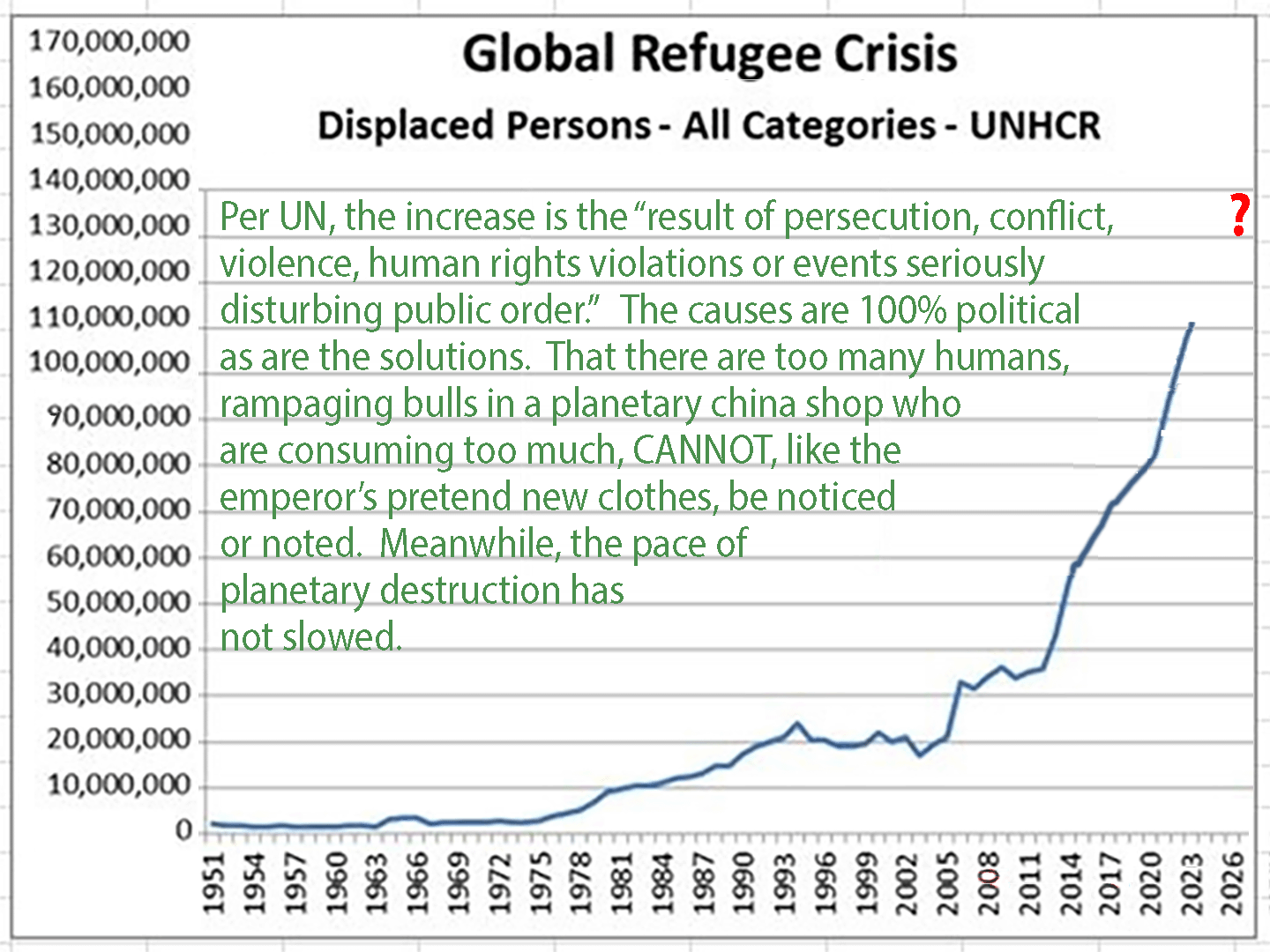
But if you’re living the good life in a modern techno-industrialized part of the planet, you’re probably one of the 70% who are overweight or 40% who are clinically obese. But then Facebook goes down for hours and the wail of the desperate is deafening. Few can see that materially, the life of quiet (mostly) desperation as we know it is part of the 'good' times had by all having money even if they had to panhandle or steal (from posterity, e.g. billionaires to lower-middle class) to get it.
So, for over 200 years the starvation rate has not increased with increasing population. Oh, but in the coming 200 years….

Sorry about that.
But to end on the obligatory positive note, increasing numbers of scientists in the 1960s noticed the Great Acceleration that kicked in about 1950. Some could ask, 'And then what?' They thought about it, conferred, and in 1980 William R. Catton, Jr. wrote Overshoot: The Ecological Basis of Revolutionary Change to sum up his/their best guess understanding of the human predicament (they didn't use the word 'crisis' as the situation was vastly beyond mere crisis as usual). Catton’s message to humanity: ‘You have to think about the human predicament NOW!’ Answer: ‘No, we don’t. We'd rather think about DEMOCRACY NOW! or making America great again.’
A few words from Overshoot for those who would rather know than believe: 'Today [1980] mankind is locked into stealing ravenously from the future. That is what this book is about. It is not just a book about famine or hunger. Famine in the modern world must be read as one of several symptoms [e.g. biodiversity loss, climate change] reflecting a deeper malady in the human condition—namely, diachronic competition, a relationship whereby contemporary well-being is achieved at the expense of our descendants [and 'our' environment]. By our sheer numbers, by the state of our technological development, and by being oblivious to differences between a method that achieved lasting increments of human carrying capacity and one that achieves only temporary supplements, we have made satisfaction of today's human aspirations dependent [unsustainably] upon massive deprivation for posterity.... Even the "alarmists" who have been warning of grave perils besetting mankind [e.g. environmentalists, XR...] have not fathomed our present predicament.'
The human 'predicament and its background can be outlined as follows: Human beings, in two million years of cultural evolution, have several times succeeded in taking over additional portions of the earth's total life-supporting capacity, at the expense of other creatures [e.g. megafauna extinctions on five continents]. Each time, human population has increased [to reach maybe 5 million by the end of the epipaleolithic]. But man has now [over the last 10k years] learned to rely on a technology that augments human carrying capacity in a necessarily temporary way—as temporary as the extension of life [during a famine] by eating the seeds needed to grow next year's food. Human population, organized into industrial [MTI] societies and blind to the temporariness of carrying capacity supplements based on exhaustible resource dependence, responded by increasing more exuberantly than ever, even though this meant overshooting the number our planet could permanently support [as the millennia pass].... We and our immediate ancestors lived through an age of exuberant growth [for the past four centuries], overshooting permanent carrying capacity without knowing what we were doing.'
Did the world listen? Did you learn the above from anyone serving the schooling system, economic system, political system…?
It is entirely possible to graduate with highest honors from a top university and know essentially nothing about overshoot, carrying capacity, sustainability, or that there are limits to growth even if you are a STEM/STEAM/STREAM major....
261. Why is the political process so slow to respond to our ecological crisis?
Note: I didn't answer this question nor ask it. But I did post it. On Quora they allow you to answer your own questions. So I did:
I don’t know enough to have an opinion, but Rex Weyler, an ecologist, offered this considered answer of interest:
Ecological crisis: Might as well speak the truth
Why is the political process — worldwide — so slow in responding appropriately to our ecological crisis?
We may point out that most political processes are hobbled by corruption, self interest, and bureaucratic incompetence. However, there may be a deeper reason, connected to how the status quo protects itself, not just against foreign aggressors, but against dissident ideas that threaten its accepted narrative.
Regarding our ecological problems, the popular narrative of most societies and governments today is that we have a “climate problem,” which can be solved with “renewable technologies” such as windmills, carbon capture, and efficient batteries.
However, global heating is a symptom of a much larger, more fundamental ecological crisis articulated by William Rees , the Limits to Growth study, the Post-Carbon Institute and other ecologically aware observers. Humanity’s urgent and primary challenge is what ecologists call “overshoot,” the predicament of any species that grows beyond the capacity of its environment. Wolves overshoot the prey in their watershed, algae overshoot the nutrient capacity of a lake, and humanity has overshot the entire capacity of Earth. Global heating, the biodiversity crisis, depleted soils, and disappearing forests are all symptoms of ecological overshoot.
All paths out of overshoot (genuine solutions) involve a contraction of the species and a decline of material/energy throughput. There are no exceptions.
Furthermore, the contraction of humanity is inevitable, so all genuine options exist within this framework, whether we respond appropriately or not. And finally, every day that we ignore this reality, the deeper humanity falls into the overshoot rut, the faster the feedbacks take over (forest fires, methane from melting permafrost), and the less chance we have of mitigation.
In several cases, scientists and other colleagues who have attempted to introduce these facts in political settings have told me: “It is a non-starter. They don’t want to hear it.” Okay. That reveals a deeper problem: political inertia and the paradigm trap.
If mentioning the real problem to any given group that wants to help is a “non-starter,” I cannot imagine how that group is ever going to be effective.
In my experience, this is how the status quo maintains itself: Not necessarily with conspiracy or evil plotting (although those phenomena exist), but rather with social gravity, pulling every alternative idea or narrative toward itself, until the alternative idea is safely inside the event horizon and there is no escape. The capitalist/growth status quo black hole has virtually gobbled up the entire environmental movement, and the civil rights movements, this way.
Politicians reach out to scientists for an articulation of our problems, but typically reject the warnings from scientists if those warnings violate the accepted paradigm. The message from serious ecological science suggests that a clear understanding of overshoot is absolutely essential for anyone or any group hoping to understand the problem. Non-starter or not, I suggest it would help anyone attempting to influence governments to have a one-pager on “Overshoot” available for everyone, to distribute it relentlessly, and to articulate it at every opportunity. Don’t wait until it is acceptable.
Paul Ehrlich bravely and brilliantly warned humanity of the population crisis in the 1960s, and tried to get the topic on the UN agenda in Stockholm in 1972, and almost succeeded, but was sabotaged by people (including Barry Commoner) who claimed the subject, though correct, was a “non-starter.” So here we are, fifty years down the road, having wasted half a century on pretending, with the population having doubled, and material throughput quadrupled. Meanwhile, we’ve wasted 42 years of climate meetings, allowing political appointees to avoid the real dilemma, while pretending that carbon-capture and mechanical efficiencies would solve the erroneously-described problem.
A leading environmental leader once told me that, although true, she could get “no traction” with the overshoot warning or with population issues. I sympathize, but my response was, and still is: What good is traction if you’re going down the wrong road?
Sometimes the “traction” is to help with fundraising, but I don’t believe that funding is the solution. As often as not, funding is the problem, because the funding represents a huge packet of energy, resources, and person-power, so if the funding is creating traction down the wrong road — tech fixes, better lives for 9, 10, 12 billion people, a marginally more benign American or European empire — it is part of the problem.
So the articulation of the problem includes this: We don’t have another half-century to quibble.
Governments claim to care about risk mitigation, but ignoring the real dilemma is the biggest risk of all. It’s like turning on the air conditioner when the house is on fire.
I believe most of the solutions that will matter will be local: Learn to grow food, grow food, learn about energy, reduce energy throughput, build up local and regional energy sources, protect local ecosystems, build community cohesion, establish systems to create soil, enrich the soil, recycle everything locally, reduce material throughput, set local limits on growth.
Virtually none of this can be achieved globally, but there still exists useful global efforts — including efforts to inform governments of the genuine challenges. I would engage in any global effort that is realistic about the problems we face.
In that case, what are the global priorities: My list starts with universal women’s rights, available contraception, a global promotion campaign for small families, to address unrestrained population growth; a vast reduction of militarism and weapons manufacturing; reduce psychopathic behaviour in governments and institutions; limit corporate power in government and in ecological regulation; reduce/eliminate frivolous consumption, and so forth.
I suggest that to be effective, all this has to be done within the biophysically, ecologically correct context: Humanity is in a state of overshoot, getting worse daily, and all paths out, all genuine solutions, include a large-scale contraction of human enterprise.
So, when you lobby your government for action, don’t equivocate. If your government ignores you because you insist on bringing up these issues, it is better to find out now, rather than in another decade or half century.
Why is the political process so slow to respond to our ecological crisis? Humanity is in a state of overshoot, and all paths out, all genuine solutions, include a large-scale contraction of human enterprise.https://www.resilience.org/stories/2021-09-24/why-is-the-political-process-so-slow-to-respond-to-our-ecological-crisis/
I did reply to a couple of comments asking 'what crisis?', but one thoughtful comment received a somewhat thoughtful reply:
Eric, respectfully, you have that backward - it’s various political crises regarding normal ecological processes. Think about it: How many different upcoming disasters involving the workings of Earth are potential disasters? There have to be a least 50 major ones and perhaps a hundred others waiting out there until picked up by the media and turned into upcoming disasters which will kill us all.
It’s almost as if there’s an actual contest which can promote the greatest amount of fear:
If you can name just one predicted global disaster (not weather anomalies) over the past 100 years you are ……………… (choose your own traduce). If you can name just one predicted global disaster Democrats don’t pitch, you are (choose any variation of stupid you wish). If you wonder why these cockroaches are wealthy beyond imagination you are ……………. (again, door number two awaits you.
And to think you assholes voted against the man who was going to clean all this up simply because he might have huwt youw feewings by tweeting the truth.
Kat
My reply:
Thank you for expressing your views and being willing to respectfully invite dialogue. The situation is that there are different “domains of discourse” or “consensus narratives” out there and, sad to say, we are speaking from two foundationally non-overlapping worldviews.
I am not a democrat, liberal, or progressive. Neither am I on the other side of the political spectrum nor anywhere in the middle range. I have never voted as I see no difference between any Twiddledees or Twiddledums who agree to have a battle. I don’t believe in belief, nor do I believe in political solutions. I suppose I could be called a man of science, and yes, everything I think I “know” could be wrong. I’m guessing this qualifies as being different from most who voted for Biden.
The question was not one that I would ask. It was the title of an article and I repeated it on Quora to better gauge what those who do not read the publication it was from think. I see no value in echo chambers. Your answer was exactly what I was hoping for, so thanks again, I needed that.
I also see only one problem or crisis of which all others are symptoms of. If I’m dying of pancreatic cancer, I may have many symptoms, but I should cite only one cause. In a word, our problematique is “overshoot”, or as the wordy might say, “ecological overshoot”. The overshoot trajectory plays out over centuries and most of us are still living in the growth phase, so subjectively everything looks good and is clearly getting better.
But I would rather know than believe, and so I endeavor to take the objective view. Of course, no one likes it. I don’t like it. I would like to be wrong about everything. Carrying Capacity and Overshoot.
As I claimed, there are other views out there and they could be totally wrong. As evidence, this recent offering hits the high points: Through the Eye of a Needle.pdf
It is not possible to reconcile our worldviews. Sorry about that. But we can come to understand that there are other POVs out there. We all can but endeavor to do our best for posterity’s sake, as I assume you are doing.
Respectfully,
Eric Lee
262. Why did the Rapa Nui civilization collapse?
No one “knows” (with absolute indisputable knowledge) what happened and there are “historians” and “scientists” who don’t believe there was any “collapse” other than the coming of white racist Europeans who destroyed and enslaved the islanders who were doing just fine up until then.
Any answer is a story. Some stories are more likely than others. You can believe what you want (like many academics and all pundits today) or pay close attention to the evidence and endeavor to tell a likely story. The most likely story, the one that applies to us and all prior endeavors to build empires, is called “overshoot”. For example:
Rapa Nui's Tale
Muzuki had taken to spending more time alone on the central mountain where he could see the entire island and its reef below. For over a thousand years his people, the Polynesians, had spread from island to island, ever eastward, and Muzuki, Master Navigator, was again looking to the east. He knew 78 islands to the west and how to navigate to each, even the ones he had never visited, but knew of none to the east. Several navigators before him had sailed to the furthest points of no return—east, southeast, northeast before turning around, but had found no new lands. Now this island was filling up; only a few trees large enough to make voyaging canoes remained—it was time to go.
Going meant going to the point of no return and beyond. If no land were found, all would die at sea. Few were willing to go, but Muzuki's youngest daughter, her husband, and six other couples were prepared to sail into the raising sun.
Overseeing the construction of the voyaging canoe, the Space Shuttle of his culture, and its provisioning occupied Muzuki for over a year—no detail could be overlooked. Finally, in a tearful parting, fifteen adults, ten children, eight chickens, two bred sows, and seeds, roots, or cuttings of all useful plants set sail to the east.
On the 43rd day, in the late afternoon, Muzuki saw a seabird flying high towards the southeast and changed course. Three days later a speck of island appeared on the horizon. It was a relatively large island mostly covered in giant palm trees of a kind no one had seen before. Soon gardens were planted and the roosters crowed.
The next year Muzuki lead a voyage to explore for islands further east; five children were born that year, but no new islands found. The next year they explored to the south; the oldest of the children was now a woman and gave birth to a daughter, and no new lands were found. In the third year Muzuki discovered a reef far to the northeast upon which waves broke, but there was no land to settle. The home island, called Rathsi to honor the gods, now had 20 children to call it home.
By the eighth year both Muzuki and the voyaging canoe were too old to explore any more, and it mattered little because by then Muzuki knew there were no more islands within reach. For now there was no reason to go beyond the furthest horizon. It was a big island and there were now 71 rather fat people and 312 chickens living on it (the pigs had died before reaching the island).
It was a big island for so few people, but not so big that Muzuki, standing on the central mountain, could not see all of it. It was a paradise of rare device, but Muzuki's thoughts were troubled. It would be long after his death before the island filled with people, but fill it would and there were no new islands.
On the twelfth year Muzuki called together the four clans. He was old and he must speak. Only 24 of Rathsi's 108 inhabitants were old enough to listen when he rose to speak. He told them that the gods had truly blessed them in guiding them to this island of plenty, and that in his dreams the gods had spoken to him. They said that each clan was to claim one twentieth of the island as their own to farm, build upon, to cut down the trees therein, to harvest the fruit, and to use as they wisely saw fit. Also each could claim one twentieth of the shoreline and reef to fish and harvest its bounty of seafood. Each clan could claim any part of the island, but only a twentieth part for their use. Altogether the people would have one-fifth of the island and the rest would belong to the gods. The gods decreed that if anyone so much as tried to take any part of the remaining four-fifths, all the people would be punished harshly.
The people could not understand why the gods would speak of such things. One-fifth of the island was far more than the people needed. But the gods are hard to understand, and so the people honored the decree of the gods. In the following year Muzuki helped the clans place the boundary stones marking those portions of land and sea that the gods had allowed the people to claim.
The fifteenth year, Muzuki knew, would be his last. For the last time he spoke to the people. There were 154 of them now. He told all who would listen that the day would come when their fifth of the island would not seem to be enough. Only then would the decree of the gods be difficult to heed.
"When that time comes some will say that it is right for the people to take the whole island for themselves, but they must not be listened to. The decree will be hard to follow because there will be too many people and you will know there are too many people when they start to say their fifth is not enough, that they need more and more. Do not listen; say instead that the people of Rathsi must adopt new ways. Say that from now on none can be born except by decree, and that only the death of one can decree the birth of another. To this rule there can be no exceptions. Do what you must to live by it. Only then will the gods continue to favor you."
The people listened and said, “Yes, Muzuki, we will,” but few understood. Several centuries passed, the people prospered, and in time some began to say that one-fifth of the island is not enough. Though Muzuki's name was well remembered, his warning was not, and so it came to pass that those who must have more took the rest of the island and prospered exceedingly while the gods did nothing to punish them. Muzuki came to be known as tena'n te, “the old fool.”
Another century passed before the last of the giant palms were cut down. Mamo had cut it down to make a fishing canoe. He and his family prospered exceedingly when theirs was the last of the great fishing canoes on the beach. The old ones told of other plants and animals that had once lived on the island; the stories of the old were listened to with bemused tolerance. There were now 25,649 proud people on the island for they had built great monuments that would last for centuries to come, filling the gods themselves with wonder.
But a dark day was coming. The people clamored for more, but there was no more. Some began to take from others; their things, their food, their land, then their lives; and the warriors, those who could take what they wanted, ruled the island. They took and they fought; they ate all that could not fly away, then they ate each other.
There were now 2,194 people, yet still there was not enough, still they took and fought. They disfigured the statues of their ancestors. They fought over the snails remaining in the tide pools and cooked them by burning grass. The people had been punished harshly.
Aipokit's Tale
It was a small island, but it had never seen the footprints of people before. Kopai the Navigator and 28 others who had survived the fighting and the long voyage were grateful to be alive—to have come upon a new land where they could start over. But this time, Kopai swore, his children and their children would forever walk a different path. A thousand islands had been chanced upon; a thousand times the people prospered; a thousand times the fighting began—clan against clan, the people of one island against another. A thousand times “plenty” became “not enough.”
People and pigs had survived the voyage. Now they foraged and grew fat. Patches of forest were cleared, gardens planted, and the people and pigs multiplied. Kopai had seen many islands and knew how many people and pigs there could be before tensions arose and conflict ensued. He surveyed the small island and its reef. Eight, he thought, maybe nine hundred people before the trouble began. He would be dead by then, but he thought of the generations to come and of the new path they would have to follow—and he swore that the horror he had known would not be known again.
Twenty eight years passed, and Kopai thought and thought, and taught his people well. There were now 108 of them, half under the age of twelve. The pigs, with their large litters, had already become too numerous, but the excess could simply be eaten. Already the people could see that as the number of people increased, the number of pigs would have to decrease, for they were eating the same foods.
Kopai had been relentless in pointing out the limits to growth on the small island, and had lead discussion after discussion about what would have to happen when people as well as pigs reached their limit. He would be dead, but on this small island his great-great-grandchildren would have to stop and change course; they would have to do the hard things. The pigs could simply be eaten, but they must never, as Kopai had often said, end up eating each other.
And when their numbers reached five hundred they had to transition to no growth, for Kopai had thought well and taught well, and everyone understood that if the 264 children now among them had large families, then there would soon be too many. They understood that the horrors Kopai had often spoke of would visit their little island if they did not stop in time—well before the island was full.
Kopai and the other first people had laid the foundation for change. First there would be late marriages and those who would forego marriage were honored and rewarded. As the children came of age they were taught to pleasure themselves and the young men were given special instruction in how to please their lover in ways that would not result in her becoming with child. Great praise was attached to this skill—and skilled lovers were much favored by the women who returned the favor by hand, anus, and mouth.
If a couple wished to have a child they would announce their intent and ask for the people's blessing—and when the number of humans must stop growing, the death of one became their blessing. To be with child without the people's blessing was a sad thing—knowledge of abortion had been preserved and the skill was practiced as needed. Unblessed births forced humane infanticide. Those who chaffed at such limits were encouraged to build canoes and voyage far beyond the horizon.
In this manner the nine hundred lived, their culture evolved in wisdom and beauty, great stories were told and retold; the three clans lived in peace, and a thousand years passed. Then the people did a remarkable thing. They loved their pigs dearly but they loved one another more. One day, by mutual agreement, they killed all the pigs.
Their skill in husbanding the resources of the island had grown over the centuries, and now, without the pigs, there were 1,200 people living on a tiny island, and another thousand years passed.
But an evil day came upon them. Enormous canoes came from over the horizon and brought a wealth of things the people had never dreamed of, and with these things came new teachings. A solemn man, dressed in black, had gathered the people together and said, "There is only one religion, and only one way to serve God, and if you do not embrace the right way you cannot be happy hereafter. You have never worshiped the Great Spirit in a manner acceptable to him; but have all your lives been in great errors and darkness." (ref)
A council was held to consider the man's words, and the man in black was asked to leave the island, never to return. But many, especially the young people, were fascinated by the wondrous things and wanted more. Within just fifty years, a different man in black had built a white house on the island for his god. He was relentless in teaching them his new ways. He taught them to be ashamed of their sexual practices, he taught them the missionary position and the missionary way. The practice of abortion was the devil's work, and so they stopped. Being fruitful and multiplying was god's work, and so they did as the others did. Within just fifty years, everyone on the island was as children to the men in black.
Today, there are still 1,200 people living on the island (Tikopia). Ships come and go. Things come and people go. There are now more Aipokitans living off the island than on it. And of the 1,200, half are under twelve years of age.
What the Aipokitans have forgotten and the men in black never taught or knew is that we are all living on an 'island'. A great Island, one floating in the vastness of space, but an 'island' nevertheless. What Kopai had so long ago learned the hard way, the peoples of this Island must someday learn again.
What to do?
Consider Earth island as metaphor
263. What is the core of human problems, and can science and technology handle it?
The question invites interpretation which may not be intended. There are core (serious) problems facing humanity, but also each human as an individual member of the collective. And given a host of interrelated problems, is there a meta-problem that is central to all the others? Is the core problem(s) of society the other side of the same coin as that of individuals? And can science/technology offer real solutions?
Science, inquiry into the nature of things, may help us understand our problems and perhaps thereby be delivered from them. As for technology, a strong case can be made that it is our core problem. Technology, e.g. making and using fire, making and using weapons, enabled Homo erectus to prosper as an invasive species at the expense of other species including other hominids.
Technology, such as the Clovis point and atlatl (force multipliers), empowered our species to cause megafauna extinctions on five continents. Oh, but that’s a problem for other species, not humans, or so it seems (and is in the short-term). But overshooting environmental resources (enabled by technology) always leads to decline (or worse) in the longer term.
That we have technology may be a problem only if we are also had by it, i.e. lack the understanding/sapience to limit its use (e.g. smartphones, cars…). If so, then the core problem is mental. We have acquired the ability to store information as memes that empower us to develop and use technology/energy to dominate, exploit, and destroy a planetary life-support system (secondary to a lack of sapience). If so, then lack of sapience may be our core problem both individually and collectively.
Are we unwise by nature? Or is it an acquired affliction? For about 260k-350k years anatomically modern humans lived with technology as K-strategists bumping up against their environmental carrying capacity as their prey co-evolved with them. Our ancestors did not overpulse their population into overshoot as a plague species causing the extinction of other species on a mass scale, but likely because they couldn’t. Humans lived within the environmental productivity of a biome without destroying it or being destroyed, i.e. they evolved with and in the system as the millennia passed.
About 180 millennia ago modern humans, as other hominids before them had, left Africa to migrate to the Middle East and expand into Europe about 40k years ago to displace (and on occasion interbreed with) Neanderthals. We reached India about 75k years ago and East Asia by 70k years ago while ‘displacing’ and on occasion interbreeding with Denisovans. We were the invasive species. Our technology toolbox differed, but not in kind. We likely behaved differently, were biologically/sociologically different, evidently more rapacious/competitive.
By around 65k-50k years ago we had spread through Southeast Asia and Oceania to colonize Australia, ‘displacing’ if not interbreeding with populations of Homo erectus descendants. There were no prior hominids in the Americas when modern humans migrated there 25k or more (50k) years ago. It was the advanced technology of the Clovis point and atlatl, coming out of Asia about 13k years ago, that enabled the megafauna extinctions in the Americas (and subsequent collapse of Clovis culture).
A reasoned interpretation is that technology (actually the energy its use redirects to support human expansion) is a necessary precondition for our modern problems, but so too, and more fundamentally, is our lack of knowing when to not use technology. Whether we have the potential to acquire this sapience is not yet proven by our doing so.
This leads to another view of our core problem. Our ancestors evolved to live successfully (they became ancestors) by living in bands of 20 to 50 others (range 5–85) for millions of years. When we last had a common ancestor with today's common chimpanzees (13 to 4 million years ago), we were living in male dominated groups. As we evolved into hunter-gatherers, with females gathering most of the food and males hunting animals as valued supplement, males needed to cooperate more than compete with one another or dominate females, so while some human cultures (e.g. Indo-European) were patriarchal, most modern humans lived in bands of sisters (matriarchal, matrilocal, matrilineal) until about 10k years ago when agriculture began to spread and with it the empire building it enabled along with the biological atavisms (e.g. patriarchy) empire building selects for.
With large amounts of storable foods (e.g. grains and herds), large numbers of humans could, for the first time, live in groups larger than 150 (Dunbar’s number) that developed hierarchies to become complex societies. Hundreds or thousands came to live in chiefdoms, then tens of thousands in state level complex societies, with some cities exceeding 100k 5k to 6k years ago and 1 million in population by 2k years ago. All such complex societies were supported, for a time, by agriculture and associated technology. All failed to persist long term.
Empire building may be glorious, for a time, but all prior ones (prior to the current globalized empire) failed, i.e. collapsed or ‘faded away’ depending on the historian’s perception of time. Why could be viewed as a problem or the problem of we modern techno-industrialized humans.
Two likely stories both involve overshoot. One is reginal or (recently) global environmental/ecological overshoot where human demands exceed nature’s renewable resources, e.g. if soil erosion rate is greater than soil formation rate, then eventually (hundreds up to maybe a thousand or so years). top soil is lost long with agricultural productivity, even if soil fertility is maintained (which it rarely ever was). The overshoot condition lasts for a time, followed by degrowth.
It is also possible to overshoot other limits such as in our ability to pass on viable behaviors and information from generation to generation. If there is any loss of functional behaviors, then in as little as 8–12 generations the loss could result in non-viable individuals (their problem) forming a non-viable society unable to persist.
Rats have a Dunbar number of about 12. If they are provided an illimitable supply of food, water, bedding, and waste removal (but not space), they always overshoot the density limits of their society to collapse their overdensity population in 8 to 12 generations. This dynamic was studied by John B. Calhoun who endeavored to warn humanity that they are not different in kind from his rats and mice. He died having existential concerns for humanity, especially as they could not understand his concerns.
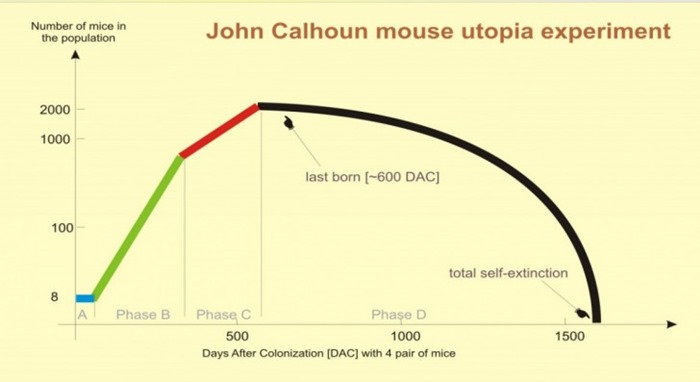
So what is it that enables us to overshoot limits? Technology is needed to do so, but energy is what makes technology work. Without diesel a fully computerized tractor will help grow no food, other than perhaps as a lawn ornament if used as a chicken roost. So is the core problem energy, the enabler of life? Well, no, not quite.
Imagine the principle, teachers, and all adults at an elementary school one morning give each child a machete (technology), tell them to find a book and read it (but no mention of how/why a machete should be used), and leave for the day. No lunch is served and no buses ever come. Parents were told nothing, and an hour passes before the first parent shows up. Assume 1% are dead and 10% are injured. Do the children have a technology problem?
Okay, so we have met the enemy and s/he is me, myself, and I. Our core problem is our failure to understand our problematique and thereby behave appropriately.
As the philosopher Ludwig Wittgenstein put it in fewer words: “Understand or die.”\
264. Are the elites right about the Earth being overpopulated, or is it a hoax?
The elites are also known as LORD MAN.
http://www.sustainable.soltechdesigns.com/images/over/index.htmlDo you know what money is? Value it? Likely have some? Then you are part of the monetary culture now global. You work for money to consume stuff and to intentionally or not serve the system, aka modern techno-industrial society. You dominate, for a time, life on Earth.
I am one of your shape-shifting reptoid overlords, so trust me, it is all a hoax. You clothed apes know nothing. You don’t even know what you do not know. Everything you think you know is a social construct.
http://www.sustainable.soltechdesigns.com/hu-mans.html
265. What is modern industrial and urban civilization?
Recently the average human on the planet became a city dweller, up from zero about 9500 BP when the global human population was maybe 10 million. Cities were and are centers of empire. About 3k to 4k years ago, when the human population (empowered by agriculture) reached 35 million, about half of all humans were living within an empire. About 80% lived rural lives to support the urbanites. City populations were in the tens of thousands in the larger empires.
There are now 33–37 megacities (depending on who is counting) each with populations over 10 million, more than the global population of humans pre-agriculture ever was. The largest city has a population of over 38 million, larger than the entire population on the planet in ‘ancient’ times. When ‘modern’ times ‘began’ about 1450 CE, the global population was about 400 million.
There was never a day when an ancient one woke up and found herself living in modernity. Like all concepts, ‘modern’ is a social construct. In Europe (the Eurocentric view), ancient times ended with the Western Roman Empire in 476 CE. So one socially constructed narrative is to view the ‘end’ as the beginning of Modern Techno-Industrial (MTI) society (us moderns).
What remained of empire was scattered monasteries, some having books (other than the Bible), and the only region-wide communication network was between monasteries, which, between 800 CE and 962 CE self-organized into the Holy Roman Empire that was neither holy, Roman, nor an empire (other than ideological). It nominally lasted until the 19th century, but lost dominance in the 15th century as the agriculturally empowered feudal system gave way to the new wind/wood (and agro) empowered mercantile industrial system of empire building, i.e. the MTI one we live in that transitioned to coal and then other fossil fuels when the wood and whale oil was running out in the 18th-19th centuries.
Some would date modernity from Newcomen’s invention of the steam engine in 1712 used to pump water from flooding coal mines so extraction could continue awhile longer. Others think that industrialization didn’t kick in until Watt invented a better steam engine, but industrialization in the modern world dates from the Wood Age, continued in the Coal Age and powered the MTI hegemon into the Carbon Age to climax in the Sino region, likely this century.
The bigger picture is that MTI culture has its origins in the horse/cattle empowered empire building of those serving the Indo-European culture (patriarchal nomads with a taste for conquest) about 6k years ago. The Industrial Revolution started in Europe, hence MTI society had a Euro beginning. Power briefly transitioned to the Americo phase of globalized empire building and climaxed in the Sino region, hence the empire you live in is (will be) called the Euro-Sino Empire that arose after the Greco-Roman one collapsed.
Like all prior empires, the current one, though the first and last global one (the planetary larder of fossil fuels that empowered it will no longer exist), will climax, contract, descend, collapse, or fade away depending on the preference of future historians (if any).
A question of possible interest is, “And then what?”
[The early ecolate came to be called the 'E.O. ones', mindless followers of the eco-fascist anti-human E.O. Wilson who advocated for merely a Half Earth for humanity. The EOs came to accept the term but translated it as 'ecolate ones'.
Civ 4.x would be transitional, likely taking 8-12 generations to become Civ 5.0
It's been a long way up as it will be down, see full graph.]
System (as Nature) over SELF (as illusion)
Or construct your own story. The future is an illusion, has yet to be, but it does cometh. Know then thyself as error, ignorance, and illusion.
266. What is the most ethical way to reduce the (growth of the) human population?
As we are well into overshoot, the most ethical way to reduce the human population is by rapid birth-off to avoid die-off, as during chaotic die-offs humans tend to behave unethically (e.g. kill and eat each other). Malthusian deaths are effective, but most prior to death feel they are unethically being forced to die by starvation, conflict, plague, pestilence and lesser horsemen.
A rapid birth-off is alternative. Initially maybe one in two hundred women who wanted to would reproduce in the first year, but in fifty years the average woman would have to have about 2.1 children to avoid further decline in population. To seek out the condition now that would come anyway, all fossil fuel use would end in five years except as needed to by agriculture to turn it into enough food to store (e.g. grains and dry goods), until the population was well within environmental carrying capacity such that no species extinction was caused nor new species prevented from evolving due to an over-sized human footprint.
Our situation is about the same as the reindeer on St. Matthew Island was in 1963. What would be the most ethical way a wildlife biologist could envision to reduce the reindeer population given that they would foresee the outcome of doing nothing?
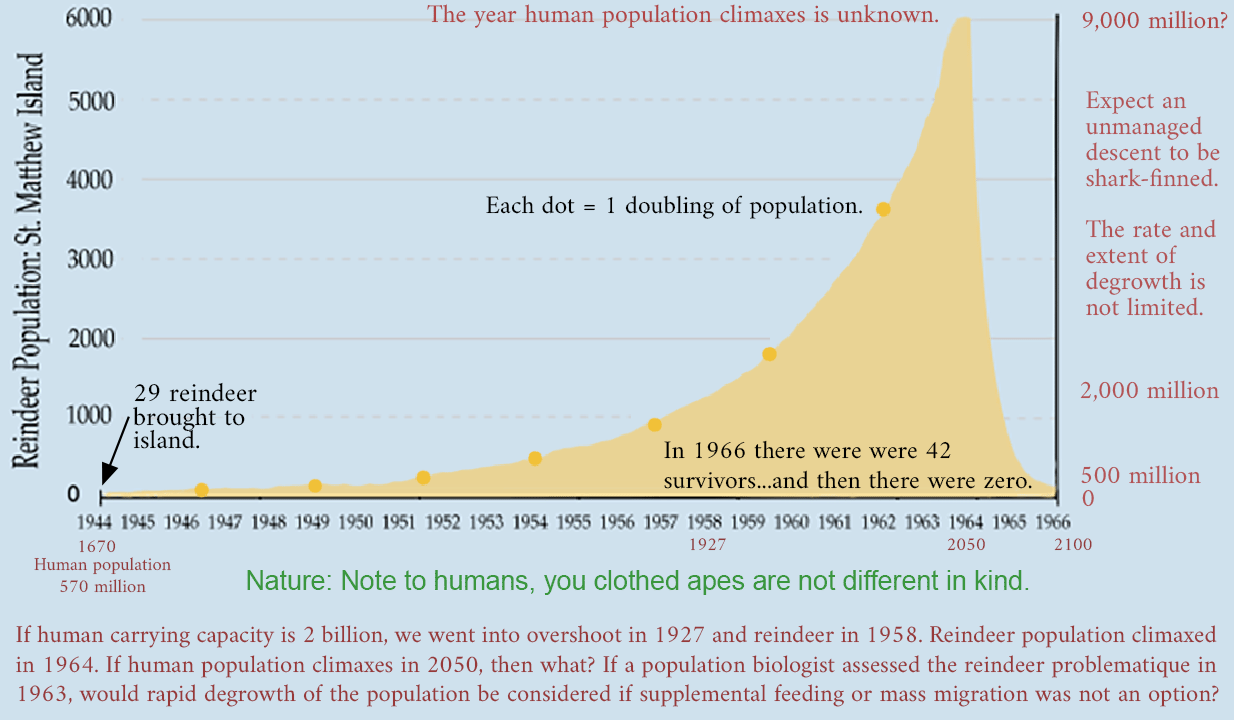
If food could be shipped to the island for a time (maybe a decade), initially preventing all but a few females from calving would work. As older reindeer die natural non-Malthusian deaths, the percentage of females who could calve would increase until the number of calves born each year remained equal to the death rate of a sustainable population of reindeer. If wolves were introduced to the island, more calves could be born each year.
Human might not like such an option, but for a sustainable human population, birth rate equals death rate. Full STOP. If the sustainable population of humans is 35 million on Earth Island, and average lifespan is 85 years, the birth rate is about 432,353 babies born each year. If you think 500k should be born, work to increase the death rate, or figure on adjusting the birth rate to equal death rate..
As noted, we are well into overshoot, so transitioning to a steady-state is not an option. It is entirely possible to graduate with highest honors from a top university and know essentially nothing about overshoot, carrying capacity, sustainability, or that there are limits to growth even if you are a STEM/STEAM/STREAM major....
267. How can we control the human population because animals are in danger?
We have met the enemy and s/he is us humans together with our crops, livestock, pets, and industrial sprawl. The industrialized growth of the last 300 years looks like the best thing that ever happened to humans, and subjectively it is.
People like to go places and to go fast. Today there are about 1.45 billion vehicles on Earth (I own three of them) all making a giant sucking sound. Ask any car owner to stop putting gas/diesel in it (or charging its giant EV battery) and park it to become a lawn ornament or maybe a roost for chickens. Plead with the next 1 million car owners you meet. I’m guessing it won’t matter whether you are wearing a tinfoil hat or a business suit and Rolex watch, the result of your citizen science project will be the same.

The danger to wild animals is ongoing (the Anthropocene mass extinction event) and started about 3k to 4k years ago with the global spread of intensive agriculture (plant and animal) needed to support empire building. Most humans were living in and serving empire building complex societies, and pulsing regionally beyond carrying capacity. For the first time, we are doing so on a global scale.
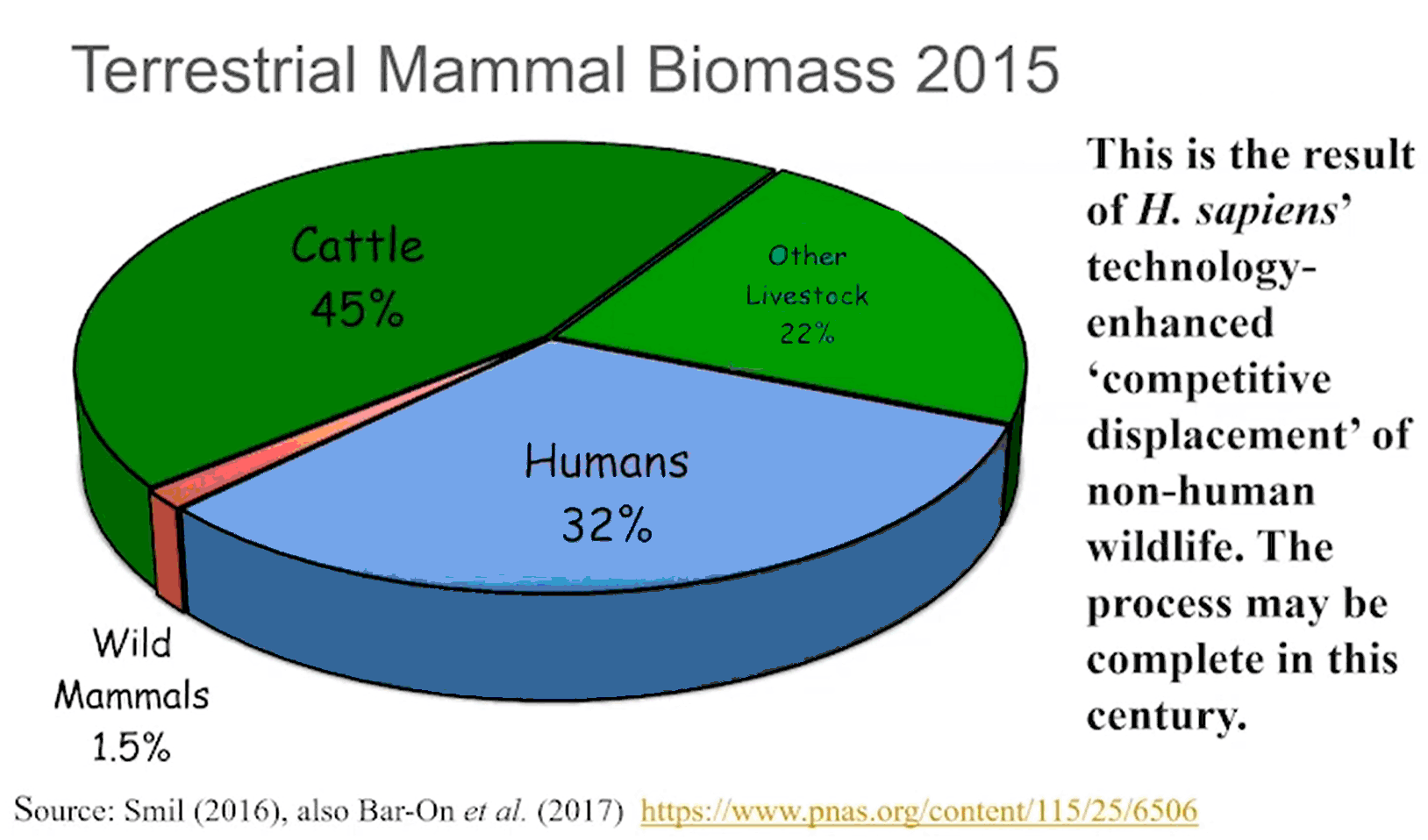
Some animals don’t appear to be in danger, as they are legion, e.g. some locust during their plague-phase population overshoot. But some animals who are not adapted to plague-phase overpulsing of their population (e.g. humans) may be in danger of extinction if no remnant population persists.

Sorry about that.
And what do we need to do to rapidly reduce the population of humans, livestock, and pets? Nothing. The situation is unsustainable, i.e. is self-correcting via negative feedback loops that replace the prior positive feedback loops aka growth. It (growth/degrowth) just happens whether you vote for it or not. I voted against growth fifty years ago, but the system grew anyway. Eight billion people can vote against degrowth, but…. To Gen Alpha, sorry about that.
So Gen Z and Alpha (and B-Z if any), who you gonna blame? You have, are, and will be schooled to believe that ending poverty (UN SDG #1) requires that we have to grow the economy faster, and that because of the 'demographic transition' the only population problem is the declining fertility rate. Every educated person knows this. So don't worry, women can be better educated, empowered, given full rights, and be incentivized to have children (with proper tax credits, free daycare, or paid to, so they can also work to grow the economy) to allow economic growth to continue (forever and ever, hallelujah!).
Or to protest chaotic collapse as usual, go to Oxford, then next day to Cambridge, then back to demand that the Anthropocene be recognized as a plague-phase of human techno-expansion, and that we are well into ecological overshoot. Demand that they do what they should have done in the 18th century: close their Divinity Schools and their successors, the Schools of Neoclassical Economics. In India, universities will stop giving PhDs in astrology (Vedic, of course, not the false astrology the West believes in), and elsewhere degrees in auto-ethnography, and gender and sustainability studies must be defunded. Protest as if posterity's life depended on it.
You could blame the education system, both formal and informal, but you won't. You'll blame politicians because you're educated. You could blame my generation who was the first to be clearly warned by science of things to come, but you won't, because we taught you well. What we didn't teach you was that blaming others or yourself is a cognitive pathology, a distraction from understanding the dynamic we are all part of and serve. Understanding the remorseless dynamic is humanity's best hope for deliverance from it.
Catton made this point clear in 1980, and pretty much everything else we humans need to know about our predicament in his book Overshoot: The Ecological Basis of Revolutionary Change, that summaries what scientists able to think in systems had realized by 1980 and everyone else (e.g. neoclassical economists, thought leaders and political leaders) obfuscated.
But political leaders (and their wordsmith sycophants) have taken credit for 300 years of growth, and as everyone knows they, their policies, are the cause of growth. They will be blamed for degrowth since it is their polices that caused growth (not exploiting a planetary larder of fossil fuels) and must be causing degrowth. The educated (well schooled) will first dance around pink party boats, then burn cities (by mostly different politicized agents than the dancers, but they're all part of the same educated and normalized dynamic).
That's what their education tells them will work to get politicians to stop allowing fossil fuel usage and transition to green growth based on solar PV and wind generators. That doing so is biophysically impossible (will not empower modern techno-industrial society and its need to grow), is another story no one has to believe in, so why would any sane, patriotic, right thinking person believe in overshoot? Posterity, if any, could explain it to them if they could, but time travel into the past being disallowed, like the laws of energetics, must be choicelessly obeyed, so don't expect to be educated by posterity. You can steal from posterity (and current lifeforms), but not without being selected against long term.
It is entirely possible to graduate with highest honors from a top university and know essentially nothing about overshoot, carrying capacity, sustainability, or that there are limits to growth even if you are a STEM/STEAM/STREAM major....
268. What is the greatest threat to mankind in its environment?
I have met the enemy and s/he is me, myself, and I. I am, we are, the remorseless dynamic we are products of and serve, that is destroying a planetary life-support system. Welcome to the Anthropocene as we climax in our glorious plague-phase overshoot while “the angles sob at vermin fangs in human gore imbued.” [E.A. Poe]
269. What should the people of developed nations do to help stem starvation in underdeveloped areas of the world?
I don’t have the answer and so I deleted this question from my email, but the condition referenced doesn’t go away because I have a good reason to not think about it. It is what is known as a ‘wicked problem’ that invites you to think about it and fail to think of any real solutions that might actually work and be politically acceptable. But you didn’t ask what we could do, but should do, and if we can’t/won’t do what could work, there may be something to be said for at least thinking about what we can’t and won’t do to save posterity.
We overdeveloped ones are the small percentage of the global population (e.g. Americans are 4.235% of the population) that are in a position to do something about what is happening in Chad, Timor-Lesta, Madagascar, Haiti, Mozambique, Liberia, Sierra Leone, Lesotho, Afghanistan, Nigeria, Rwanda, North Korea, Sudan, and Eritrea to name some regions where starvation is endemic. Since China, India, and many less overpopulated areas claim to now be developed, that leaves about 30% of countries in the underdeveloped category. They tend to have the least access to industrial food production that is produced, for a time, by turning fossil fuels into food as clever apes have learned to do in the last 60 years as soils erode, salts build up, nutrients are mined, rivers run dry, and water tables are lowered (but not for much longer).
Those most dependent on small scale subsistence agriculture will be the least affected by any future contraction of the techno-industrial food production system. But what should we do to help them now? We should (but won’t) set an example of what needs to be done to adjust population x consumption to match environmental productivity of one’s local biome. Currently, in developed regions, the processed food on the end of your fork traveled on average about 1,500 miles to get there. Our ability to turn mostly fossil fuels into food, process it, transport it, and cook it is not sustainable. Sorry about that.
So, what we should do is what Howard T. Odum, systems ecologist, told the world in 1973:
"What is the general answer? Eject economic expansionism, stop growth, use available energies for cultural conversion to steady state, seek out the condition now that will come anyway, but by our service be our biosphere's handmaiden anew."
We could maintain full employment by working to restore Nature. Sooner being better than never, we should rapidly contract our economy and population, but maintain industrial food production for a time (a decade or two) to avoid starvation. We should (but won’t) end all fossil fueled transportation (cars, trucks, trains, planes, shipping) and other uses in five years. For a rapid birth-off to avoid a die-off of posterity, local sustainable environmental productivity would determine the population that could be supported and only enough births would be allowed (by whatever means, e.g. the Mothers get together and decide who can procreate) to maintain that population.
In the watershed area I live, I envision happy and healthy children playing with their puppy in a hundred years on their way to fetch a pail of water, not unlike they did a hundred and twenty years ago when the population was about 3,000. It is now at 42,000 and growing, but in a hundred years the 3,000 people living here could be living prosperously, well within environmental carrying capacity, so no one would suffer when the next bad year came as always happens. They will even be able to trade some foods and goods for foods that don’t grow in their area.
In the mean time, over a fifty year period, natural deaths would lower the population by 50 to 99 percent, whatever was needed, but without any deaths by starvation or scarcity induced conflict as usual (i.e. no Malthusian deaths insofar as possible) as the population would degrow faster than the production of necessities contracted.
In fifty years at most, the ending of all fossil fuel use, the condition that will come anyway, will have been achieved without chaotic collapse as usual. No one in overdeveloped areas would be allowed to migrate to ‘develop’ other parts of the world. They would have to learn to live without extracting resources from outside their area by conquest or economic development. This would set the example of what all humans who are part of modern techno-industrial society, including those on the edge, need to do.

270. What is the basic need for humans, and how do you find the resources?
All organisms that persist find needed resources, maximize empower (MPP) as subsystems, without destroying the biome they are part of and depend on. Those that overshoot carrying capacity, with a few exceptions such as locusts who have evolved adaptive forms to survive their plague-phase overpulsing, harm their environment and their posterity at risk of causing their own species extinction. Humans have no evolutionary adaptations to overshooting limits, and so our overpulsing is a one-off event. Humans will never again exploit a planetary larder of fossil fuels, minerals, soils, and water resources to overgrow their numbers and level of per capita consumption.

Humans, like all other organisms, store information about what works (as Nature alone determines) genetically. What doesn’t work is selected against over time (as the millennia go by). Some organisms also store information memetically, But the complexity of human verbal behavior allows us to live in the models, social constructs (conceptual virtual models) that we create. We develop information/misinformation systems about what’s out there that are ‘correct’ or ‘incorrect’ depending on whether they enable or prevent us from behaving adaptively to thereby persist.
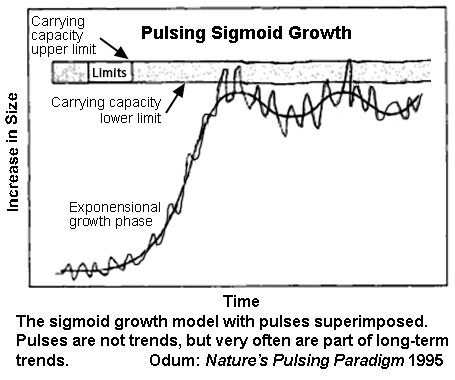
Humans are currently overpulsing globally for the first time in a one-off plague-phase overshoot event that could have our extinction as an outcome. It may seem impossible that no humans will persist for more than a few centuries to come, but even if we do not go extinct as part of the mass extinction event we modern techno-industrial humans are causing, a remnant population is likely to loose 90 to 100 percent of information science and sapience has accumulated about how Nature (life, the universe and everything) works. Few humans partake of or add to such knowledge, and as usual with the collapse of complex societies (aka civilizations) no sapient or even literate, numerate, or ecolate humans may survive the collapse.

Those who do survive (who perhaps have more ammo in their bug-out bunker), will have little information to pass on, and none may be even literate in a few generations as survivors have better things to do (e.g. eat each other) than read or teach their offspring to read. Their descendants will, after regional environmental productivity improves over typically a 500+ year period (e.g. post Roman Empire in Europe) overpulse again.
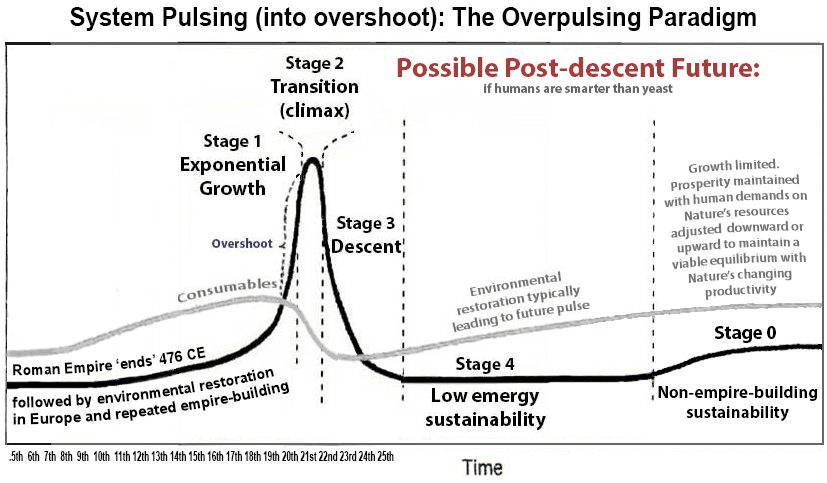
We will either eventually (within a few hundred thousand years) evolve adaptations to doing so, or go extinct. What hu-mans (hubris-man) will never do is overpulse globally again as there will be no planetary larder of fossil fuels to exploit and use to overexploit, for a time, all other resources.

The basic need for humans is to persist long term as the millennia pass and so to understand the dynamic that technology, combined with an energy source (e.g. regional one-off agricultural productivity as soil/water/animal/slave/trees et al. resources are, for a time, overexploited) allows. If we keep on keeping on repeating the pattern, we may well be part of the Anthropocene mass extinction event. “Nature is unkind.” [Laozi].

It is entirely possible to graduate with highest honors from a top university and know essentially nothing about overshoot, carrying capacity, sustainability, or that there are limits to growth even if you are a STEM/STEAM/STREAM major....
271. How can we eradicate poverty and corruption in the world?
What did poverty or corruption look like 20k to 200k years ago? All humans were nomads who possessed no more than they were willing or able to carry. By modern norms, there was no significant wealth inequality. The de facto leader of the band of matrilocal sisters was likely an elder woman as while some cultures remained patriarchal (especially where hunting was the main or only source of food), nature was selecting against male competition and dominance in societies where the bulk of food was gathered by the women.
The ancestral norm was to live in groups of related women (males married outside the band of their birth) numbering 20 to 50 (5–85 range) within which some individuals might be slackers, but corruption in any form we moderns know it was a non-issued as cheating doesn’t pay in groups where everyone had repeat interactions with each other. Only in complex societies do cheaters with few repeat interactions prosper.
Poverty involves too many people making demands on environmental resources that nature cannot provide. Overshooting environmental carrying capacity was not the norm. Humans are K-strategists who bump up against their biome’s carrying capacity but cannot exceed it as negative feedbacks set in as they push the lower limits. Agriculture, and more recently fossil fuels, allowed modern humans to temporarily overpulse in one-off plague-phase overshoot events. The latest is global for the first time.

So to eradicate poverty and corruption, degrow the human population to a viable long-term level (7–35 million) and live in groups of 20 to 50 others as the decades pass. Gathering in larger groups, no more than monthly for a few days, could do more good than harm.
The “diseases of civilization” would also become rare again: acne, Alzheimer's, arthritis, atherosclerosis, asthma, cancer [e.g. lung, breast, colorectal], carpal-tunnel syndrome, chronic liver disease/cirrhosis, chronic obstructive pulmonary disease, colitis, irritable bowel syndrome, malnutrition, type 2 diabetes, heart disease, hypertension, metabolic syndrome, chronic kidney failure, osteoporosis, PCOD, diverticulitis, gallstones, rickets, dental caries, stroke, depression, OCD, suicide, chronic stress, addiction/anxiety/bipolar/personality/eating disorders, substance abuse, obesity, ideology, and vascular dementia). These are diseases of civilization, of living like rats/mice in a Skinner box or one of Calhoun’s experiments serving the economy in high density populations, being part of the monetary culture as Anthropocene enthusiasts, and of our resultant stress response, which includes the storytelling media (mainstream and social), the error, ignorance, and illusion all of us modern techno-industrialized humans swim in.
272. Are we living in the world of what George Orwell predicted in 1984?
Fools rush in and some predict the future, but Orwell’s future was fiction in all details. I’m guessing his concerns, his dystopian future may be more fully realized by 2084.
Noting that a tripartite global empire would be stable and hence selected for is being prescient, a quality Orwell is guilty of. No one wanted to publish Animal Farm. Many intellectuals liked what Stalin and predecessors said. Orwell was more concerned with what they would do and so had a different take on the situation. When it became evident that his take on Stalin was spot on, Orwell was only then listened too.
We now live in a globalized monetary empire. Orwell knew that one empire would have no external enemy to unify citizens against, and so internal conflict would fragment it, destroy it, and citizens would end up fighting to see who would claim possession of the rubble.
Two empires, if perfectly equal, could persist if war was limited to disputed areas where any victory would be temporary. There are always complaints and an external enemy is needed to blame for them. The problem is that by chance alone one empire would become stronger and would have to destroy the enemy. This would result in a one empire world that could not last long.
But three roughly equal empires could persist and the leaders could rule forever provided that all knew that if any one empire became too powerful that the other two would always form an alliance. Their combined power would always cancel that of the strongest and weaken them.
If necessary, a Great Leader could declare that a now too strong friend and ally had betrayed them and that the empire that had been everyone’s mortal enemy, hated and reviled, was now everyone’s friend and true ally, and always had been as Orwell foresaw. And the people would believe the Great Leader, just as Orwell predicted. Everyone (except for a few that didn’t matter) would learn to love Great Leader.
As the modern one-world global empire collapses/contends, it may divide into roughly three reginal powers. East Asia is becoming dominate, and Eurasia is coming together. Will the UK again become part of it? Or will it join Oceania? Global elites, who may have learned Orwell’s lesson, only know.
Actually they don’t know. The system will select for what works. If one of three superpowers is too weak and is conquered, it is just a matter of time before the unsustainable two become the unsustainable one that collapses to reboot the game of empire building.
Or, maybe realizing that the only way to win is to not play the game would select for a different outcome than a boot stomping in the human face forever.
273. What are the biggest threats/issues to humanity today?
The meta-threat is overshoot, sometimes ‘ecological overshoot’, of which other near term threats/issues are symptoms, e.g. climate change, human emigration, deforestation, and biodiversity loss. Humanity is currently well into a state of overshoot.
Our population and per capita consumption of non-renewable resources and unsustainable consumption of renewable resources (e.g. biomass, soils, fresh water, ecosystems) is causing a 1k fold increase in species extinction headed for a 10k fold increase (over pre-Anthropocene levels) in the extinction of non-humans except for livestock, crops, and pets.
Causing species extinction is by definition a sign of exceeding long-term carrying capacity. To stop causing the extinction of other species or not prevent the evolution of species to replace those we have already driven to extinction would require a vast reduction in the human footprint (i.e. in population and per capita consumption).
You probably didn’t vote for overshoot, but Nature doesn’t care. No one intended to overshoot planetary productivity (by turning fossil fuels into food and vast amounts of stuff, for a time), then climax and collapse complex society (on a global scale for the first time). The last emperor of Rome didn’t intend to be the last. His vote didn’t count either.
Overshoot and carrying capacity is assumed to be of interest or concern only to ecologists as such things apply only to animals. Denying that to Nature and to Nature’s laws does man belong is a near universal, and accounts for humanity not being able to see with one eye the elephant in the room or that the Emperor is not wearing clothes while being unable to see out of the other. So, like any invasive species doing a one-off plague-phase overshoot, humans will keep on keeping on until they can’t. Sorry about that.
In 1949 ecologist Aldo Leopold noted: “One of the penalties of an ecological education is that one lives alone in a world of wounds. Much of the damage inflicted on land is quite invisible to laymen.” Today the penalty of an ecolate (systems ecology literate) education is that one lives alone in a world in the ICU facing multiple systems failure. Some think climate change might affect human well being and so are against it, but virtually all humans are quite blind to their condition of overshoot which by definition is followed by descent/degrowth. Denial works (for a time).

It is entirely possible to graduate with highest honors from a top university and know essentially nothing about overshoot, carrying capacity, sustainability, or that there are limits to growth even if you are a STEM/STEAM/STREAM major. ...
274. How did humans exist for 200,000 years but it took all the way until the final 10,000 year for real progress?
This question invites us to step back from current events (distractions), objectively consider the the bigger picture, and call our modern techno-industrial society’s assumptions (subjective) into question (e.g. that we are the apex species of a great chain of being that has progressed over the last 10k years in ways that fill the universe with wonder). The persistence of our species could depend on our doing so.
If so, then perhaps we should feel compelled to step back a bit further and wonder how humans became the last hominin standing (over the last 6-7 million years), which cannot be understood apart from primate, mammalian, vertebrate, and eukaryote evolution, but to focus on the last 300k years, we humans eventually went out of East Africa to the east and west where some eventually managed to sail across the Atlantic and, in 1021 CE, meet those who had migrated eastward. This meeting completed humanity's encircling of the planet, or, as our subjective view would have it, of our progress in claiming ownership of (dominion over) our planet for the taking.
Our taking of a planet, its resources (e.g. arable land, fresh water, biomass, minerals, and a planetary larder of fossil fuels), is nearing climax. Perhaps like those on Easter Island, nearing their completion of 887 high-rise statues, we celebrate our progress.
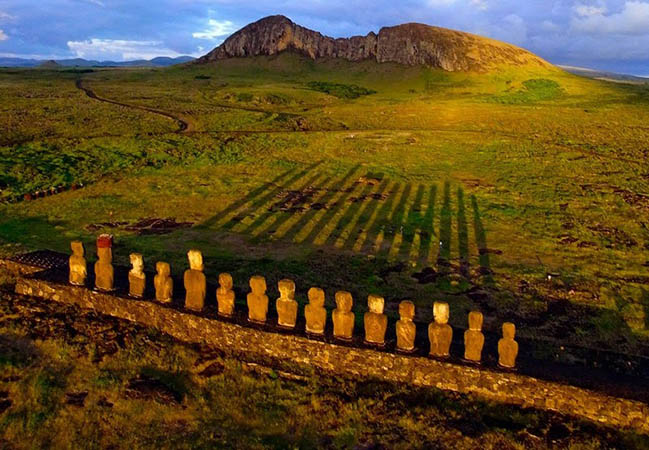
But other views are to consider. The thoughts of systems ecologist Howard T. Odum for example:
"The human society of the planet is reaching the climax of its succession. Reversals of attitudes, policies, and laws are to be expected in the transition from the era of growth to a time of descent. By developing explanations and plans now for making descent prosperous, we can be ready when the shocks of change galvanize the attention of society. Some can have faith in the future that comes from understanding energy principles. Others will find faith in religions that adapt the necessary commandments for once again fitting culture to the earth. The people of Easter Island disappeared, leaving only their monuments as an example to the world of what happens when culture cannot downsize to fit its environmental production." [Conclusion of Environment, Power, and Society for the Twenty-first Century: The hierarchy of energy 2007]
H.T. Odum had existential concerns for humanity and the biosphere in the 1950s when he noted the Great Acceleration and wondered what next?
Odum mentioned that if modern techno-industrial humans are to not repeat the Rapa Nui Island descent as dissolution, that we need to find "the necessary commandments for once again fitting culture to the earth," i.e. to maintain a viable equilibrium between Man’s demands and Nature’s resources. In the first edition of Environment, Power, and Society 1971, he offered a list to ten suggestions that was omitted from the revised (posthumously) edition because other ecologists thought it too "idiosyncratic" to be fashionably sciency, but when I read the book in 1971 at the age of eighteen, I failed to see his list as other than of interest (and I still think about his "better view" as his students, such as biophysical economist Charles Hall, persist in thinking about his science):

So, let's consider our real progress. In the last 10k years or so we have managed to convert over 96 percent of mammalian biomass into humans, livestock, and pets. We have increased the rate of species extinction, compared to pre-Anthropocene norms, by about 1,000 times, and we are on a trajectory to achieve a 10,000 fold increase by the end of this century. Over half of all of us nearly 8 billion humans now live in high density (overdensity) cities where, in 8-12 generations, they will progressively lose functional behaviors, what John B. Calhoun called a "behavioral sink".

We modern techno-industrialized ones are especially impressed by our technological progress that was and is needed to turn a planetary larder of fossil fuels into food, sprawl, and stuff (for a time). We are also enthusiastically conducting an ad-lib global geobiophysical experiment on the planet’s life-support system in unmanaged growth having unforeseeable outcomes. Our whole shebang is still in progress (for a time).
We should be more impressed by our inability to understand the exponential function, as Al Bartlett noted after giving his free and public lecture on Arithmetic, Population, and Energy: Sustainability 101 no less than 1,742 times from 1969 until he died in 2013. Our related inability is our failure to understand that we humans are not different in kind from other life on Earth, that we are not exempt from the laws of energetics, nor can we "decouple" from the biophysical nature of things as conventional economists (and everyone informed/educated by them, i.e. the 99%) deeply believe.
The bigger view looks something like this perhaps over optimistic one:

The average hydroelectric dam has an expected life of about 400 years. The energy return on energy invested (EROI or EYR) of energy sources other than fossil fuels (non-renewing on a human time scale) is too low to support modern techno-industrial society as we know it on anything like the scale we now consider normal.
But some wind, water, solar (e.g. solar cooking), and biomass energy sources could be maintained if we preserve the knowledge of how to do so. Typically, prior complex societies loose 90 to 100 percent of their information (memetic) content as there is no information conservation law of the universe.
Of course Odum, Hubbert, Meadows, et al. could be wrong as all neoclassically trained economists agree they are. But ecologists who listen to Nature (who as Odum noted "has all the answers") have a different view.

Humans like to think that they can believe what they want. And they can. For a time. But Nature (Gaia, Mother, Aluna etc.) doesn't care what 7.9 billion humans believe. Sorry about that.

It is entirely possible to graduate with highest honors from a top university and know essentially nothing about overshoot, carrying capacity, sustainability, or that there are limits to growth even if you are a STEM major. For real progress, we need to pass through the coming bottleneck with information packages intact.
My concern is that a remnant population will pass through but none, after a few generations, will be literate, numerate, and ecolate (systems science literate). As a result, posterity will regionally repeat the pattern of empire building as usual (there will be no energy source to allow global conquest) until they can't. James Lovelock has similar concerns. He foresees a 80 to 90 percent human depopulation event, but he is also optimistic:
"Eventually we'll have a human on the planet that really does understand it and can live with it properly. That's the source of my optimism."
Modern techno-industrial society, now global, is a complex, adaptive and dissipative structure, like whirlwinds to hurricanes. But however much sound and fury they are full of, they and our overcomplex fossil fueled societies/economies are not evolvable. If we repeat the pattern of empire building, each iteration being not remotely sustainable (no more so than a tornado), we may persist for millennia until the pattern dies out (i.e. is selected against).
Or we could come to understand the planet and come to live with it properly as a complex, adaptive, and evolvable system that listens to Nature (because we finally understand ourselves to be subsystems of the geobiosphere) and again become Earth agents.
"What is the general answer? Eject economic expansionism, stop growth, use available energies for cultural conversion to steady state, seek out the condition now that will come anyway, but by our service be our biosphere's handmaiden anew."
—Howard T. Odum, Energy, Ecology, & Economics 1973
His vision would be the new world order all Anthropocene enthusiasts are terrified of, and so will fight (to the death—their own or preferably others) to see who inherits the rubble. Sorry about that. Arguably a prosperous descent would have a better outcome. Descent by dissolution is double-plus ungood. But "eventually we'll have a human on the planet that really does understand it and can live with it properly..." if information packages can be retained.
"If society does not succeed in changing attitudes and institutions for a harmonious descent, the alternative is to prepare information packages for the contingency of restart after crashing.... Seek out the condition now that will come anyway." —H.T. Odum
275. How much is overshooting our planet’s bio-capacity?
So how much are we modern techno-industrial humans overshooting our planet’s bio-capacity? If you think humans can consume all of Earth’s environmental productivity (and should), then you believe that if we had 1.6 earths to consume, then we could support the current population, provided per capita consumption doesn’t increase as 99% of Anthropocene enthusiasts want and demand it to increase, then we could sustainably support nearly 8 billion consumers if there were 1.6 Earths.
This is the view of the Human Footprint Network.
Thanks to COVID, we are only consuming 1.6 Earths now, but there aren’t 1.6 Earths to consume, so maybe we should think about our predicament, as in the higher we grow, the harder we’ll contract. That is the point the human footprint metric is trying to make. It is correct in noting that we are well into overshoot, but it is not concerned with telling humanity by how much. A better (if much higher) answer would be instantly rejected, because ‘people would rather believe than know’ as E.O. Wilson notes.
Overshoot per the above chart started in 1970 when the human population was 3.7 billion. This implies that the planet could sustainably support that many humans. but William Rees, co-creator of the metric with Wackernagel, thinks the maximum sustainable human population is 2 billion. Sometimes he can add “or less” but he can’t say how much less even if asked.
A consensus has arisen among global thought leaders that the lowest population that anyone who wants to be considered credible can mention is 2 billion. But the best-guess answers of science are not determined by public intellectuals. They merely limit what scientists who want to be quoted can say.
A 2012 UN report summarised 65 different estimated maximum sustainable population sizes.
Cited by authoritative BBC article in 2016.
The reality is that most of the experts are economists who don’t know enough about human ecology, carrying capacity, or overshoot to have an opinion. I know one ecologist who sent out an email asking collogues (over five dozen) what their best guess was and 2 billion was the maximum, with a range of 50 million to 2,000 million, average about 1 billion. The premise is what is the maximum…, but what if humans were to leave room for Nature apart from the occasional dandelion growing in cracks in the sidewalk? If you think humans should have half of the planet, then divide by two.
Subjectively, most humans cannot think that an Earth with only 2 billion humans on it might be a good thing. Objectively, carrying capacity (for all species including humans) is exceeded when their population in a region causes harm to the biome, causes permanent damage to the ecosystem upon which it is dependent; e.g. the number of people, other living organisms, or crops that a region can support without environmental degradation.
Causing species extinction harms and degrades a biome. We did not begin causing species extinction in 1970, The rate of anthropogenic species extinction is now over 1,000 times baseline, heading towards 10,000 times higher by the end of this century. Humans exceeded carrying capacity when the population of our Anthropocene enthusiast ancestors (regionally causing megafauna extinctions on five continents) exceeded a few million. The objective view, for those who would rather know than believe, is that we went into overshoot when our population exceeded 7 to 35 million. Maybe Earth could support 42 million, or maybe 5 million is too many, but 2,000 million to 1,000,000 million is just what some enthusiasts, products of the modern education system, want to believe.
So, if 35 million is your best guess, then we are 227 times into overshoot. But round off to 300, or better, give a range, say 300 to 1200, maybe more or less. This is not a consensus narrative, so if you repeat it, don’t expect anyone to even think, or be able to think, about considering the possibility they might be wrong (that any claim outside the consensus might be right).
It is entirely possible to graduate with highest honors from a top university and know essentially nothing about overshoot, carrying capacity, sustainability, or that there are limits to growth even if you are a STEM/STEAM/STREAM major.
276. What is the most effective way of world population control?
To envision any effective way to limit human population that does not involve Malthusian deaths (assume no one will vote for any Malthusian solution), let alone the most effective way, involves thinking thoughts clothed apes find unthinkable. This is why there are no consensus solutions or even a 51% consensus that there could ever be too many humans on the planet.
A 2012 UN report summarised 65 different estimated maximum sustainable population sizes. Cited by authoritative BBC article in 2016.
A viable solution, assuming human ecologists and population biologists know more than neoclassical economists about carrying capacity and overshoot, would be a rapid birth-off to avoid an overshoot die-off likely to be rapid, i.e. happening over a 20 year period (on average per history of prior collapse/decline and fall events, i.e. all prior civilizations).
Politically there are no viable solutions. Calls for individual restraint are allowed, but select for those who refuse. That the human fertility rate is declining (for reasons most imagine to be true, but are merely comforting, e.g. that the decline is due to empowering/educating women) is broadly viewed as evidence that there is no problem with adding 80 million more humans per year to the planet of the humans (what could go wrong with that?).
Because we are well into overshoot (i.e. we are over a hundred years past sustainable long-term carrying capacity without turning fossil fuels into food and stuff), then, yes, Houston, we have a problem.
Overshoot means the last 300 years of growth (in population and per capita consumption) will climax and descend even if 9 billion humans don’t vote of it to happen.
Any solution that could be implemented today (or this year) and be effective, would involve universal involuntary infertility with few or no exceptions. Exceptions, if any, would have to be limited to match sustainable carrying capacity. As for what that capacity is, no one gets a vote. Nature, the nature of things, determines what works in a complex system. Majority rule or the whims of a supreme leader/tyrant or oligarchs in a smoke filled room don’t determine the dynamics of complex systems.
What if there were no births? The average lifespan is now about 72 years, assume no change in death rate—that no one dies a Malthusian death (starvation, scarcity induced conflict, plague), then a human population of 8,000 million in 70 years would be about 200 million humans too old to reproduce. The fly in this ointment is that if climax occurs in the next 10 to 30 years and descent lasts only 20 years, then the rate of birth-off population decline will not be fast enough. The death rate will increase in an overshoot die-off event not unlike what happened to reindeer on St. Matthew Island, so even limiting births to zero may not be fast enough unless other drastic measures are taken. Sorry about that.

Engineering a plague virus that spread like the Delta variant (actually faster if it has no apparent symptoms—no one dies, no one even sneezes) to cause all humans to become infertile before the loss of fertility is even widely recognized, is possible given current technology provided a government or just one billionaire (there are 2,755 of them) funded such a project. But it would very well be too little too late, so why bother?
Saving modern techno-industrial growth society is not possible as it is a growth culture. In addition to degrowing the population, we need to degrow the economy to a non-fossil fueled biophysical economy of enough (that will come anyway) that also leaves room for Nature. Otherwise we will all go into a coming ‘bottleneck’ and few will come out (possibly no one). The concern should be who comes out, and will they merely end up repeating the pattern of overshoot and collapse?
If in 70 years there were 200 million old people on the planet, given that half of the 80 million born 70 years earlier live longer than 72 years, then the last human to die could take another 50 years (there would be no caregivers, so the last human would have to have been able to provide for themselves until they died at age 120 years). So 120 years is a near maximum, with 110 or 100 being possible assuming few euthanize themselves.
Some humans think planet Earth could sustainably support 1 trillion humans. Only an economist (or someone informed by them) could think even 10 billion is viable.
What if 512 human ecologists and population biologists et al., distinguished by a life of endeavoring to listen to Nature, were locked in a comfortable conference facility and told to come to a consensus of what the human population could be whose footprint caused no species extinctions nor prevented the evolution of new species to replace those already lost during the Anthropocene mass extinction event?
No one, including family, knew what they were actually called upon to do, so none could suffer from retribution/retaliation from anyone who didn’t like their best guess answer. They were not being asked to determine a maximum human population assuming all environmental productivity of land and sea were diverted to supporting humans, crops, livestock, and pets. They were to determine, as objectively as possible what the maximum human population could be that was compatible with maximizing the empower (MPP) of the entire biosphere.
A month passes and a consensus emerges that the optimal human population was somewhere in the range of 7 to 35 million. So the plan becomes to rapidly reduce the human population to 35 million without increasing the death rate, then reassess humanity’s condition of overshoot and, if need be, lower it further.
Assume no one will volunteer to die a Malthusian death, and that the population in 100 to 120 years is 35 million (less than 2,500 million in fifty years, 1,400 million in sixty years, 750 million in sixty-five years), what would a viable solution look like? Assume that in the first two decades of the rapid birth-off, fossil fuel use was phased out in five years except to support agricultural food (dry good) production and long-term storage (no grain production would be used to feed livestock) and so no humans would starve during the birth-off. In about 75 years the population would be close to 35 million and low intensity agriculture (gardening) and limited hunting and foraging would support the human population and allow all other life on the planet to prosper too. Assume humans thereby manage to preserve the knowledge humanity has acquired over the last 7k years, and that by the end of the birth-off (to avoid die-off) all humans are literate, numerate, and ecolate (systems science literate).
To maintain a population of 35 million having an average lifespan of 72 years, 35,000,000/72 babies would be born each year. Actually, some children die before reproducing, so figure 36,750,000/72 = 510,417 babies are born each year during the rapid birth-off over a 39 year childbearing period at the end of which the average woman would have to have 2.1 children to maintain a population of 35 million. So the actual birth-off period would be 39 years followed by continued degrowth of the population as the elders die natural deaths after passing on memes of highest value to posterity (birth-off followed by a NATURAL die-off that avoids a ‘zombie apocalypse’ die-off event). Such is the most any sane human could aspire to/hope for.
A slightly lower birth rate would degrow the population and a slightly higher one would grow the population as may be needed if there is a plague or other cause that increased the death rate. The change in the rate would likely not be noticeable if done, as needed, to adjust for changing carrying capacity.
Assume all humans are infertile, but assume 510,417 doses of a temporary infertility reversal cure is distributed annually to those least likely to destroy the planetary life-support system as decided by the Mothers of each community of 20 to 50 people. In a low energy world few would live in cities or travel far or fast.
Most people (the lucky ones) would live more like humans lived for 300k years. They would once again live in band sized groups, because that’s what works for humans per their current biology. Cultural practices may allow humans to live in groups of 150 to 250 long term without loss of functional behaviors, but we 'humans of NIMH' need to start by learning to hum a tune, and perhaps eventually our descendants will play in a symphony orchestra as part of a complex society that actually works long term as the millennia pass.
In 70 years there would be more than 200 million humans on the planet. There would be 235 million, soon to be 100 million, then 50 million, and when the last pre-birth-off human died, there would be 35 million humans living prosperous lives of enough as the millennia pasted on an abundant Earth.
Or, with an unnoticeable increase or decrease in the rate of growth, the population could be degrown to 31 million if that is what the data says, or perhaps as humans learn to live properly with the planet as Earth Agents, in just two thousand years the population could grow imperceptibly to 42 million without causing species extinction of plants, animals, fungi or microbes above baseline as if there where no humans on the planet (today we are causing over 1000x more extinctions, meaning we went into overshoot long before 1970).
If the planet were inhabited by ecolate humans, it could take less than 10–15 million years for new species to evolve for biodiversity to recover from the Anthropocene in the modern techno-industrial era. Humans could become Earth Guardians if they came to understand overshoot, i.e. that they are prone to overshoot and must guard against so much as transgressing the lower limits of carrying capacity.

It is entirely possible to graduate with highest honors from a top university and know essentially nothing about overshoot, carrying capacity, sustainability, or that there are limits to growth even if you are a STEM/STEAM/STREAM major....
277. Why can't the human race live in peace?
We don’t know that humans can’t live in peace. We can say, based on 300k years of evidence, that humans have not and do not live in peace, a state of non-conflict, of non-taking. For over six million years our hominin ancestors lived in bands of about 20 to 50 individuals, from newborns to the elderly. They were extended families. In some groups young males would leave the band of birth to join, typically marry into, another band. In others, the young females would do the same. There was conflict, violence, and the occasional homicide. Among humans, most bands were matrilocal (the boys left the band) and so the norm was a band of sisters. Likely all viewed violence as a failure. They would say that normally, most of the time, they lived in peace.
Of course there is always times of scarcity (e.g. periods of less rainfall) and territorial boundaries were not fixed, not enforced by a supreme global power, so serious conflict could and did arise. Serious fighting ended in death. Even in normal times, if two groups of hunters met on the edge of ‘their’ territory, they might disagree on whose territory it is. Each would yell insults, make threats, throw things, and eventually someone might be injured (or even killed), and conflict would end as one side backed down. This might have happened several times a year, or once every few years, but by modern standards, it was not serious conflict. Still, resources could and sometimes were scarce, All depended on territorial resources. Even if boundaries were agreed upon, and had not changed within the memory of any living person, scarcity could and did change the condition of peaceful co-existence.
Agriculture allowed much more food to be produced provided most people worked in the fields all the livelong day. Their labor and the agricultural products, supported ever larger settlements from chiefdoms to city-states, on to nation-states whose existence was a state of war. Sometimes an empire would conquer a vast region and there would be a Pax Romana, a Pax Mongolica, a Pax Britannica, a period of peace compared to prior wars of conquest.
Now there is one global economic empire, still dominated by the Dollar. Compared to the wars, genocides, and conflict of past empire building, there has been a relative peace (era of less war since WWII), the Pax Americana, that is passing into history.
Could humans live in a state of peace, at least one where generations passed without fighting over scarce resources (e.g. arable land, water 'rights', forests)? What condition, what ‘rules of the game’, would select for peace? As H.G. Wells (historian) noted in 1933, ‘the existence of independent sovereign states IS war’, is the condition that selects for war, so consider a new paradigm.
Envision a new world order. All territory is divided into watersheds. Topography determines which way a drop of rainwater flows to the sea. Where not obvious, surveyors could mark the line between watersheds. Large watersheds are composed of subwatershed areas that as tributaries flow into large rivers that flow to the sea. Seashore is also an obvious boundary. No two watersheds would be exactly the same size or have the same resources, but all would be big enough to support a viable human population. Instead of 195 independent sovereign states in the world, there would be over 20,000 watershed management units. The current state of Oregon, USA, would become over 90 watershed management units (WMUs).
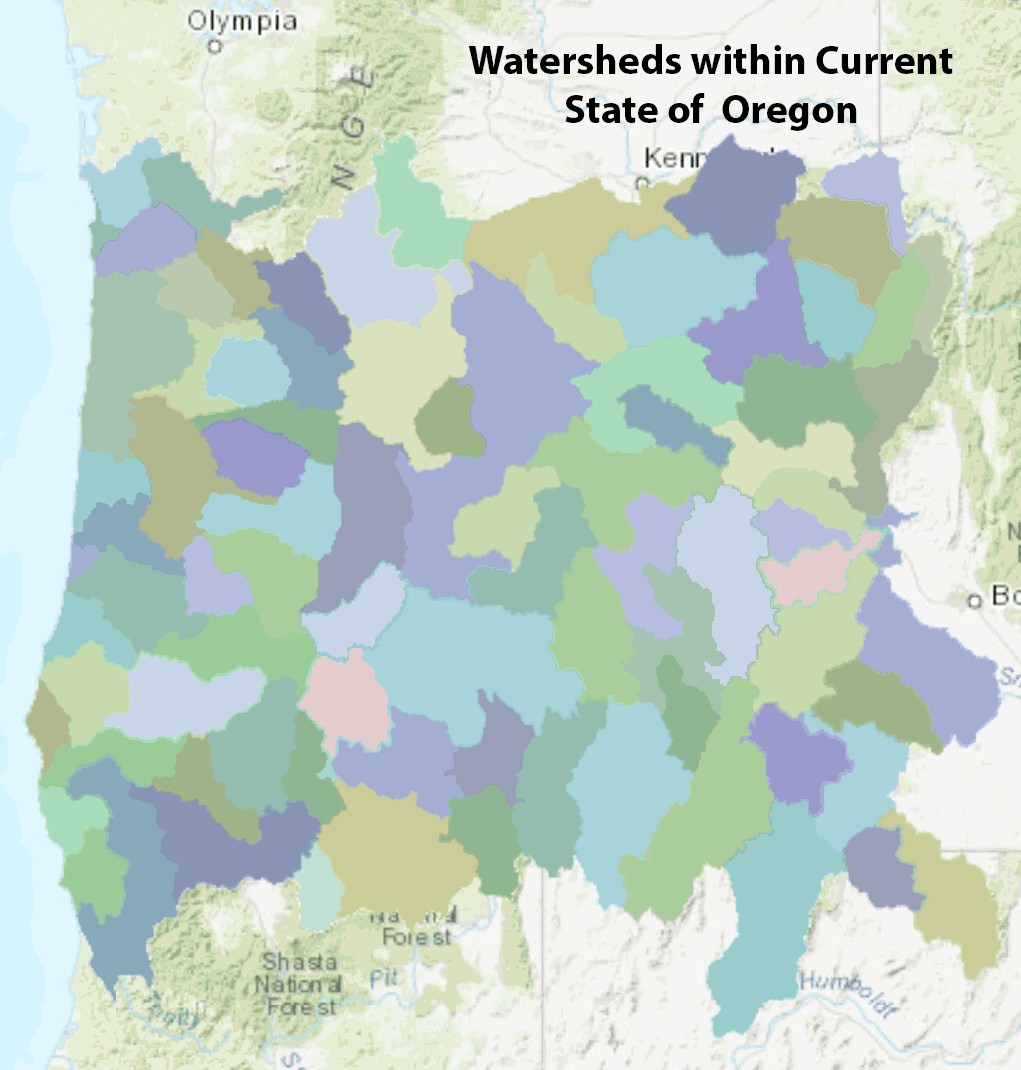
Some WMUs could support a larger population than a neighboring WMU. Each WMU be composed of dozens of communities, and each would include citizen guardians to keep the peace. All, or almost all, would again live in small groups as the era of fossil fueled empire building and urbanization would have passed, and no serfs or slaves would have to work all the livelong day to supply armies needed for conquest.
So 195 sovereign powers, if replaced by 25,000 sovereign powers, would merely start to conquer one another to build empire, ie. to again turn the planet into a condition of war after war after war. Or that’s what would happen if it could.
What could be different is if (after a more or less equitable dividing of the planet, one that resulted in definable boundary areas that are not as imagined, but actually out there) all who agreed to live in a WMU (and manage it), would also agree to be part of a global Federation of Watersheds that had only one function.
If any citizens of any WMU (or any not part of the Federation) attacked any WMU, no matter how weak (e.g. one where only a low population of hunter-gatherers lived), then all nearby WMUs would be notified of the attack, and as members of the Federation, send Guardians, as many as they could, to reinforce the citizens of the WMU being attacked and drive the aggressors out, pursuing and destroying them if deemed necessary to prevent future attacks.
If necessary, every WMU on the planet would send Guardian volunteers to make sure that no act of aggression never had a pay-off. If all acts of taking never succeeded, the behavior would soon end. There would at least be peace between WMUs. Remaining conflict would be within mismanaged WMUs, and the Federation would freely offer information on what the cause of the conflict was and how to resolve it (or the WMU could refuse help and fail if their own children, citizens of the Federation, were victims of the conflict, which would be grounds for Federation guided neighboring WMU interference).
The Federation would have no territory, no army. It would be an information processing organization of WMU members. Such a Federation could have other functions, but a condition of a Pax Federation would be its only necessary function, one that could be permanent.
First, get rid of all the sovereign nation-states. Replace them with maybe 25k WMUs that are not ‘truly’ sovereign in that they cannot decide to conquer a neighbor because they wear the wrong color feather in their hair. A Federation of WMUs would be more civil. If humans could make a United Federation of Watersheds of Earth work, if we ever learn to live in peace, perhaps we’ll be invited to join the United Federation of Planets someday.
278. What's a world order, and how do politicians intend to make this a better place?
The current world order is a system of 195 nation-states serving a global economic system that seeks to dominate the planet of the humans and extract resources. It had its origins in the Indo-European expansion out of the Pontic steppes 6k years ago, empowered by horses and cattle, to conquer vast areas of Eurasia.
A second expansion, mercantile and cultural, began about 1450 as an out of Europe expansion that by the mid-twentieth century had subsumed all as a global empire (the Euro-Sino Empire) we all (who could possibly read this) live in and serve (for a time).
The pulse started in the Wood Age when a thousand old-growth oak trees were used to build each ship used to rule the waves anywhere they could go. As the wood was running out, a New World for the taking was discovered and the Industrial Revolution came to be empowered by King Coal.
The growth hegemon’s wealth and power transitioned to the petro-powered Americo region in the twentieth century, post WWII, and then to the Sino region in the early-mid twenty-first century where the modern techno-industrial (MTI) monetary culture of empire building will climax.
Politicians and CEOs (and lessor powers, e.g. leaders of the educational, military, media, legal, and religious control subsystems) pretended to run the show, but were and are mere riders of the storm of fossil fueled growth none could stop if they would. All intend to make the world a better place by growing the economy to serve the short-term, self interests of all who make money.
Having the foresight intelligence to see that the complex, powerful and remorseless dynamic we all (who know what money is, value it, and likely have some) serve is not remotely sustainable, is not selected for. Denial ‘is not just a river in Egypt’. All in power or who serve the economy to make the world a better place for contemporary humans, will destroy the world for posterity and much of the biosphere. A damaged biosphere, however, will persist. Humans may not be part of it. MTI humans will not be part of it.
A world order that did not exploit a planetary life-support system (Nature) for short-term gain would have no politicians or CEOs (et al.) in it. It would indeed be a new world order that all Anthropocene enthusiasts fear and so will enthusiastically die (or kill) to prevent. Modern techno-industrialized humans will keep on keeping on until Earth is not a better place, except for maybe jellyfish and cockroaches who will thrive in the rubble. Sorry about that.
There could be a remnant population of humans who pass through the coming (foreseeable) bottleneck. If those who rebuild are those in their bug-out bunkers with the most ammo, then they will come to repeat the pattern of overshoot and collapse. This would be the dystopian future to avoid.
If those few processed of foresight also pass through, with information packages intact, those who are willing to live by different ‘rules of the game’ that select for a different outcome (namely an ecolate civilization having an MEL (matter-energy-li) non-monetary culture of enough), that is foundationally different from MTI culture, then posterity could live a different future in complex, adaptive, and evolvable systems that prosper as part of Nature as the millennia pass. Rather than seeking to dominate Nature or weaker humans, they would serve Nature as Earth Agents and WMU Guardians as part of the new world order: the United Federation of Watersheds, provided contemporary MTI humans do not exterminate them.
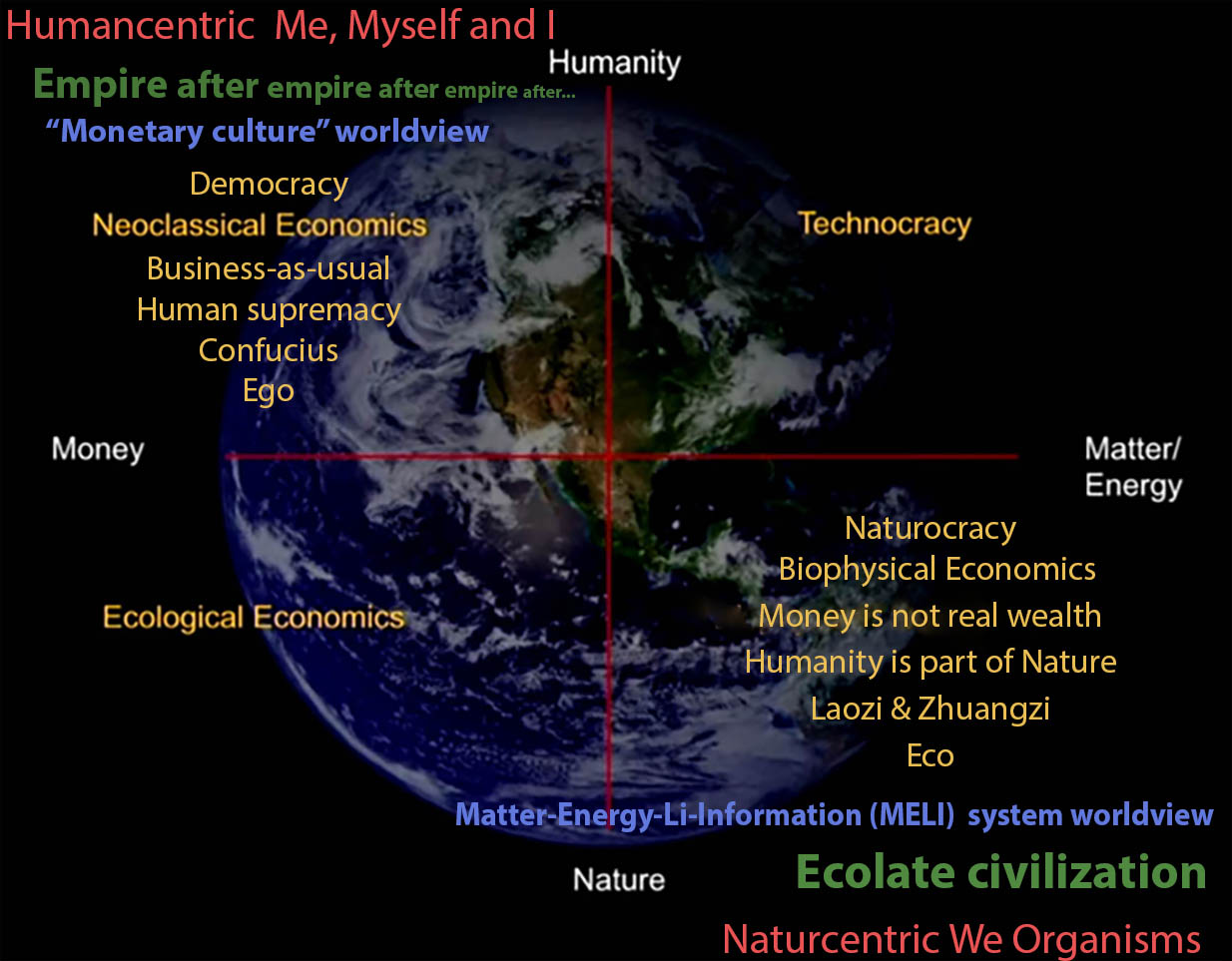
Adapted from Mark Brown, Beyond Growth: Economics as if the Planet Mattered, 2/5/2019.
"Monetary culture" vs matter-energy system worldview. —M. King Hubbert
'Li' is Chinese for the laws—organizing principles of the cosmos.
Technocracy and ecological economics were/are transitional.
[Energy is the real wealth of the fossil fuel-based energy economy whose flows are enabled by the counter $₤€¥₿ flows of the monetary economy and its counterfeit wealth dynamic. Spending money drives the economy in proportion to how much you/we/I spend. To 'save the world', stop making (or stealing/inheriting) money and stop spending/gifting any. To spend money (x0.85) is to burn fossil fuels. Individuals who stop spending money will self-select out of the system to enable others to consume more. To save the world, the monetary culture is what needs to end, e.g. to be replaced by a matter-energy-li (MEL) system-over-self culture. The modern techno-industrial (MTI) monetary culture depends on our belief in it. Destroy it one mind at a time starting with your own—the MTI hegemon will destroy itself. Only those who no longer believe in belief could form an alternative culture. Replacing a belief in MTI society with a belief in a MEL society fails to address the cognitive pathology of our belief in belief that is foundational to MTI culture's believing mind. Proposing that we end fossil fuel use and transition to green wind/solar/et al. empowerment is belief-based cognition. If MTI culture is the wolf, a Green MTI economy is the wolf in sheep's clothing. All expressions of MTI culture fail to address our meta-problem of overshoot which can only be redressed by seeking out the rapid degrowth of population and consumption (that will come anyway) by voting with one's feet. Conjecture: less than 1 percent of humans have the potential to walk away from MTI culture and maybe form a MEL culture having a biophysical economy 'oriented toward the maintenance of a viable equilibrium between Man’s demands and Nature’s resources', e.g. a culture that listens to Nature. Preserving information packages to maybe allow posterity to avoid repeating the MTI pattern is also to die for.]
279. To what extent are we going through the last chance to save the Earth?
For the first and last time we are pulsing into overshoot on a global scale by burning through a planetary larder of stored energy (fossil fuels). Once the fossil fuels are spent, once all the minerals and other resource deposits that can be have been mined that the fossil fueled energy flows enabled us to mine are dissipated, then the level of consumption will never occur again on a human time scale or on this planet ever again by any species.
The flower and fruit of our one-off overpulse is the knowledge and understanding that has also, often as an unintended aside from growing the economy, been made temporarily manifest. The real value of our overpulsing is not the ruins we leave, but the information we have and are coming into possession of. If we ever actually come to understand the planet and learn to live with it properly as the millennia pass, it will be now, and we may well fail to pass such insights as we may acquire on to posterity. Perhaps we have no more than a decade to listen and learn enough about ourselves to save the biosphere from ourselves (modern techno-industrialized humans).

There is no information conservation law of the universe. We could, as prior complex societies have, loose all acquired information and understanding. On the downslope, no literate, numerate, and ecolate (systems science literate) humans may survive to pass on their understanding. If so, posterity will merely continue to repeat the pattern until they can’t.
We moderns are educated (actually schooled) to be unable to understand the implications of the exponential function. nor carrying capacity and overshoot.
Without such understanding, we will keep on keeping on until we fail to persist. Humanity is on a collision course with Nature. A damaged biosphere will persist. Humans may not be part of it. There are no political solutions. “Understand or die” [Ludwig Wittgenstein]. Humans may or may not learn to listen to Nature who has all the answers. The next few decades may be our last chance if we still have one.
It is entirely possible to graduate with highest honors from a top university and know essentially nothing about overshoot, carrying capacity, sustainability, or that there are limits to growth even if you are a STEM/STEAM/STREAM major....
280. As a result of technological advancement, nature is being destroyed in some ways like deforestation, ocean pollution, air pollution, plastic wastes. Does it mean that technological advancement is detrimental to humans and animals?
We who have technology are also had by it. We modern techno-industrialized humans are enslaved by it. Read Technological Slavery (2010) and revolt. Consider: Anti-Tech Revolution: Why and How 2015.
We develop advanced technology and we must use it as we seemingly lack any ability to not use it. We develop atlatl and Clovis point tech, and we have to cause megafauna extinctions on three continents. We have a planetary vat of oil and so we develop cars we must use, for a time, even though they are the main cause of death of we modern techno-industrial ones between the ages of 3 and 34. We have VR and so we must live in a metaverse, for a time until we can’t.
And we have to use all the fossil fuels we can to produce wind turbines and solar PV (and nuclear power plants) so we can keep on growing the economy until we can’t.
Does it mean that technological advancement is detrimental to humans and animals? No, just animals, plants, fungi, protists, eubacteria and archaeans. We humans deeply believe that we will decouple from nature, so who needs it? We will go on to build our first Dyson sphere in this, our solar system for the taking, then go forth to nearby systems to repeat the pattern, to assimilate other worlds, to subsume the Milky Way before going on to assimilate all worlds in the Cosmos (and any inferior techno-industrial societies we encounter as we assimilate them into our collective to advance our technological distinctiveness and perfection).
281. North America and Europe have made-up about 10% of the global population historically and yet they have accounted for anywhere from 40% to 80% of global GDP over the past 300 years. Why is this?
Historically you are trying to understand techno-industrial monetary culture, now global, that measures wealth in GDP. The better view is systems ecology and biophysical economics. The Greco-Roman Empire was empowered by wood and wind and agriculture. Egypt was Rome’s bread basket because the annual flooding by the Nile restored soil fertility (agricultural production was sustainable).
Deforesting Europe, converting forests into wood to smelt metal and glass, make cement/lime, and producing surplus food for a few decades after local (but expanding) deforestation allowed the city of Rome to support a population of a million consumers, for a time, a few centuries.
After the decline and fall of the Western Roman Empire, Europe was able to reforest by natural succession and soils to reform as the centuries passed, to enable another pulsing of economic growth empowered by wood and agriculture (it took about a thousand old-growth oak trees to build a large merchant or war ship).
The medieval three-field innovation was more sustainable, but overall, early European empire building during their Wood Age was not. What kept empire building going was energy, the precondition for growth and the real wealth of nations. The Wood Age transitioned into the Coal Age. Whale oil production was unsustainable, but was replaced by seemingly illimitable kerosene and natural gas.
The Industrial Revolution was coal empowered initially. It started in the UK (with Newcomen coal fired steam engine, 1712, and on a vast scale by Watts improved steam engine) and spread across Europe, then jumped the Pond to the Americas that had trees for the taking (and other stuff) to empower the extension of Wood Age modern techno-industrial development in North America, followed by coal and oil and gas and hydroelectric and nuclear empowerment used to make cars and solar panels and wind turbines (for a time).
Since the 1990s, modern techno-industrial growth, the last 300 years of ‘development’, is shifting to the Sino region as it had from the Euro region to the Americo region in the twentieth century, where over half of the planet’s remaining fossil fuels are being burnt to keep shelves in Walmart from being empty. The fossil fueled pulse of development/empire building started in the Euro and will end in the Sino region.
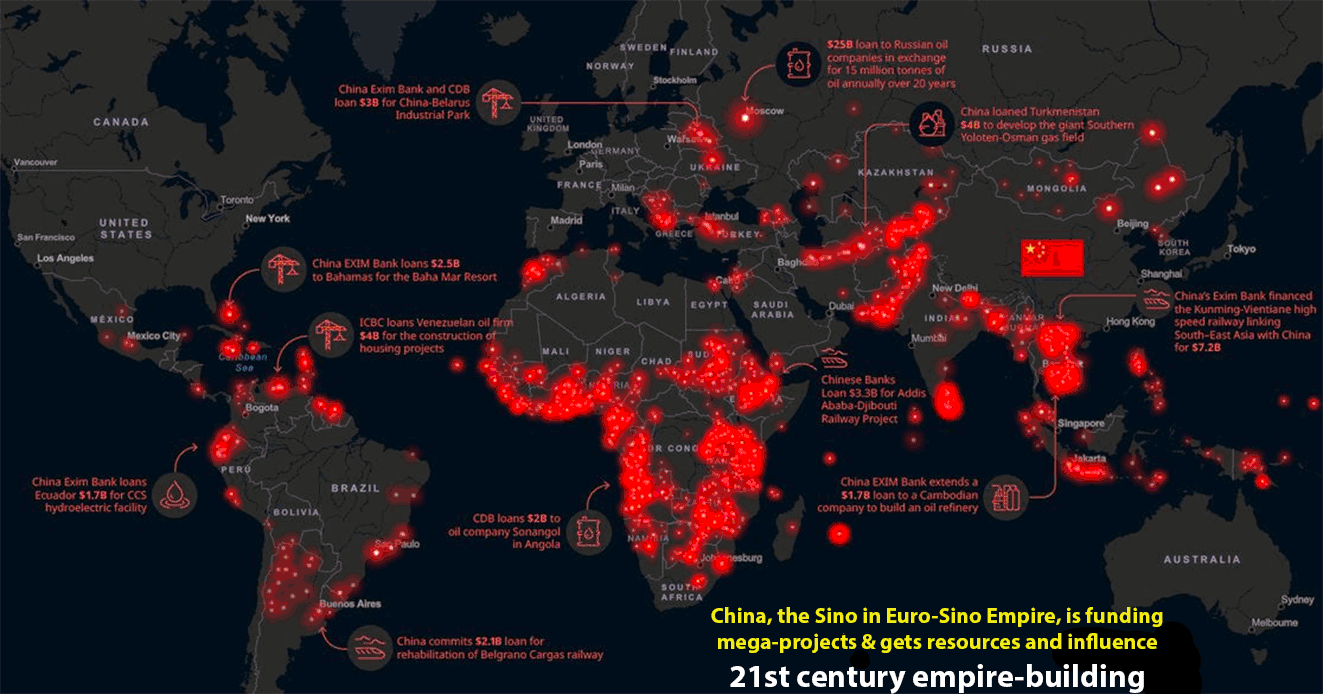
There are limits to growth. 98.8 percent of humans may vote to continue growth, but humans don’t get a vote. Growth has a biophysical basis, not a political or monetary economic (or clever ape) one. Evaporating seawater to manufacture salt (using sun or wood) could sustainably produce all the salt needed by humans (in a vastly smaller population) with enough dietary salt and even enough for food preservation, but fossil fuels, wood, soil, and virtually all mined materials are limited.
That the global, still largely fossil fueled economy, will contract, even if no one votes for it to, is a given. When growth climaxes, and how steep the degrowth in each region, is not known or knowable in the details. The belief that clever apes will pull an energy source too cheap to meter out of their techno-industrial hat is as deeply believed in by all Anthropocene enthusiasts. It feels good to believe, you can believe anything you want (that you truly believe is true, its in the Bible and Constitution), so most likely you will. Sorry about that.

But just in case you’d rather know than believe, you are living in a fossil fueled pulse, a one-off overshoot event that will climax whether you end or not global climate change or believe or don’t believe in it. You may be teaching at a top university and not know a plague-phase one-off overshoot event if you tripped over it, one you are part of and working to enable by teaching sustainability studies or neoclassical economics (or more indirectly, any other subject).
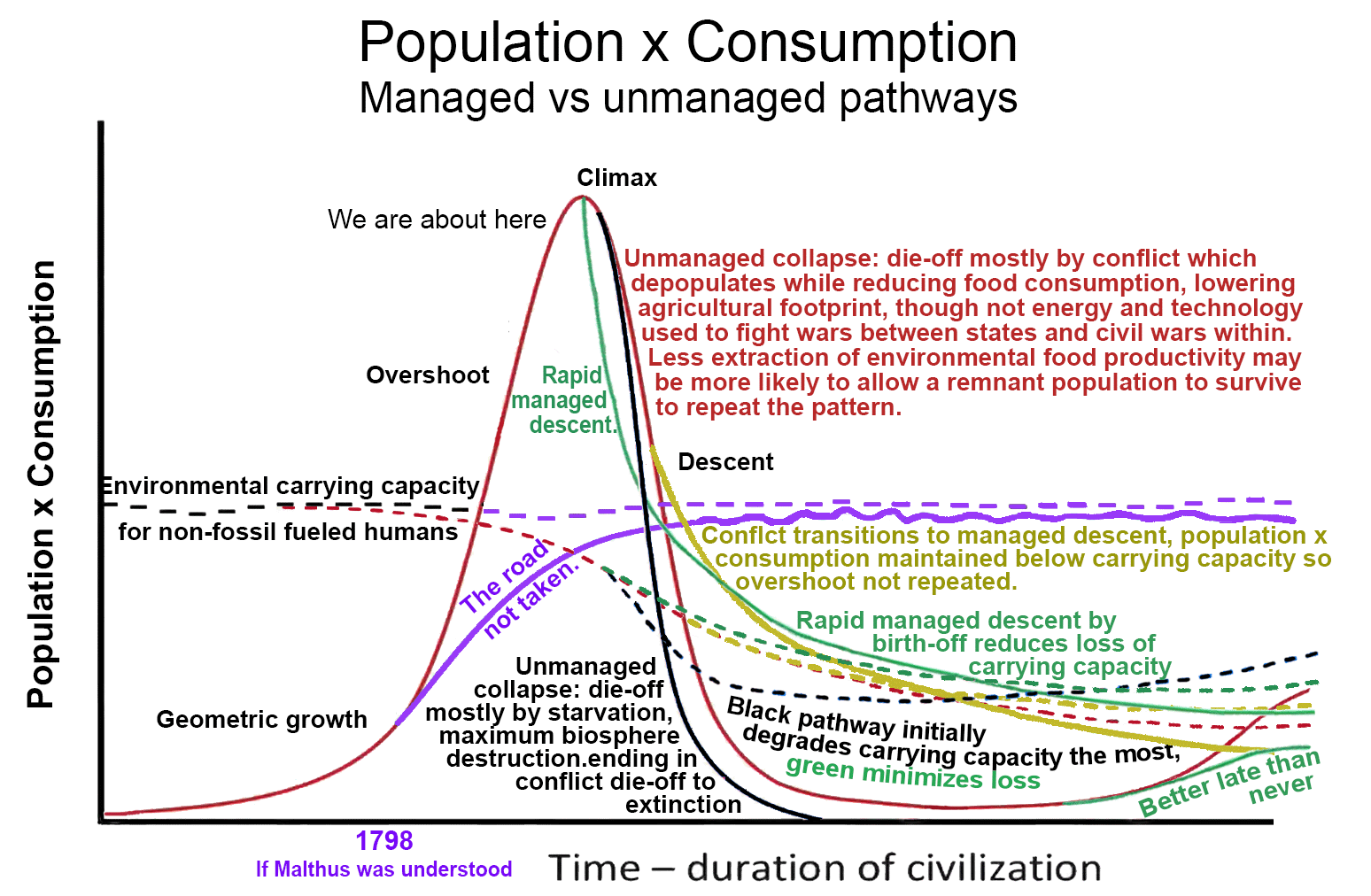
It is entirely possible to graduate with highest honors from a top university and know essentially nothing about overshoot, carrying capacity, sustainability, or that there are limits to growth even if you are a STEM/STEAM/STREAM major....
282. Why do people say Earth is experiencing overpopulation when there's still so much land on Earth that is uninhabited?
All humans on the planet could still stand on Unguja (Zanzibar) or Texas (after covering it in cityscape), and there would be plenty of room for parks with muggers and pigeons in them. And we could build floating cities and undersea cities, and cities on Mars….
Sorry, I’ve been smok’n too much crack cocaine again. Space to stand is needed, but is not the most limiting factor. Plants need (as distinct from want) 16 essential nutrients. All may be hyperabundant. But if one is not, TOO LITTLE OF ONE ESSENTIAL NUTRIENT KILLS THE PLANT. Modern techno-industrial humans depend on (need) far more essential inputs than 16, and they want vastly more, more!, and MORE!.
Humans may want a fourth or fifth meal, but they need food (caloric) intake. If you are obese enough, you may not need to take in any calories for a year (or more). But without calories in, all humans will be dead in less than two years, and most in a few months (80% of urbanized humans are overweight and about 40% are clinically obese). Do you need to eat every day? No.
The global food production system is not remotely sustainable. About three billion human lives depend on the Haber–Bosch process, an artificial nitrogen fixation process for turning natural gas into fertilizer (and food). Telling plants to grow and produce food doesn’t work. Electing leaders who will pass a law demanding more food production won’t work either. Sorry about that.
From recent news: Energy crisis is hitting fertilizer—and risking a food shortage
The world is facing the prospect of a dramatic shortfall in food production as rising energy prices cascade through global agriculture, the CEO of Norwegian fertilizer giant Yara International says.
"I want to say this loud and clear right now, that we risk a very low crop in the next harvest," said Svein Tore Holsether, the CEO and president of the Oslo-based company. "I’m afraid we’re going to have a food crisis."
"To produce a ton of ammonia last summer was $110," said Holsether. "And now it's $1,000. So it's just incredible."
But if fertilizer cost goes up ten fold, we’ll subsidize farmers to keep on turning fossil fuels into food…. Sorry, smok’n too much blow again.
Our problem isn’t that we don’t have enough space for our lawn chairs, or that if we just rearrange our deck chairs and make sure everybody has a nice one…, then we’ll be able to keep on keeping on. Our problem is that we are far into a one-off plague-phase global overshoot event that will climax and we will degrow. It’s a bigger we get, the harder we fall thing. Sorry about that.
It is entirely possible to graduate with highest honors from a top university and know essentially nothing about overshoot, carrying capacity, sustainability, or that there are limits to growth even if you are a STEM/STEAM/STREAM major....
283. Is our planet threatened with complete degradation and pollution of agricultural land? Is our food production capacity actually diminishing?
Yes. It is possible to farm/garden using low intensity techniques having enough yield using human power inputs to make doing so produce a favorable return in food on labor energy inputs, but all fossil fueled industrial food production is degrading, polluting, and unsustainable. All pre-fossil fuel high intensity agriculture on a large scale (e.g. to build empire in ancient times) using coerced/forced labor of humans (wage slaves/serfs/slaves) and animals (there were no fossil fueled energy slaves to use) also proved unsustainable per last nine thousand years of history.
Any agriculture where the rate of soil erosion exceeds the rate of soil formation (almost all arable soils being overused today) or where salts are added (everywhere soils are irrigated other than by distilled rainwater) resulting in increasing salinization, and any soil being mined of 16 essential nutrients (virtually all are being mined unsustainably by replacing some macronutrients, NPK, and micro nutrients as they become too low with industrially produced fertilizers, but only for a time, e.g. phosphorous mining is unsustainable). And biocides and all work from tillage to harvest produces food mostly made of fossil fuel. Vertical farms a hundred stories high growing food hydroponically under artificial lights is an energy blind fantasy, as are plans to continue industrial food production.
Modern agriculture is dependent on turning fossil fuels into food, and is not remotely sustainable. For just one of thousands of examples, imagine the Haber-Bosch process for turning natural gas into nitrogen fertilizer stops as it will (there is nothing natural about natural gas production/extraction/processing that, like all other energy/matter being mined, is limited, i.e. its production/extraction is unsustainable). Without industrially produced (by fossil fuel) nitrogen fertilizer alone, food production will decline, and about 3 billion mouths will no longer be fed (not counting livestock or pets).
Consider the Fertile Crescent as it was about 5–9 thousand years ago. Compare it to today. The region is not remotely fertile and not because of climate change. We are doing the same with the rest of the arable lands on the planet even if adverse climate change was not also a factor. Note to posterity: sorry about that.
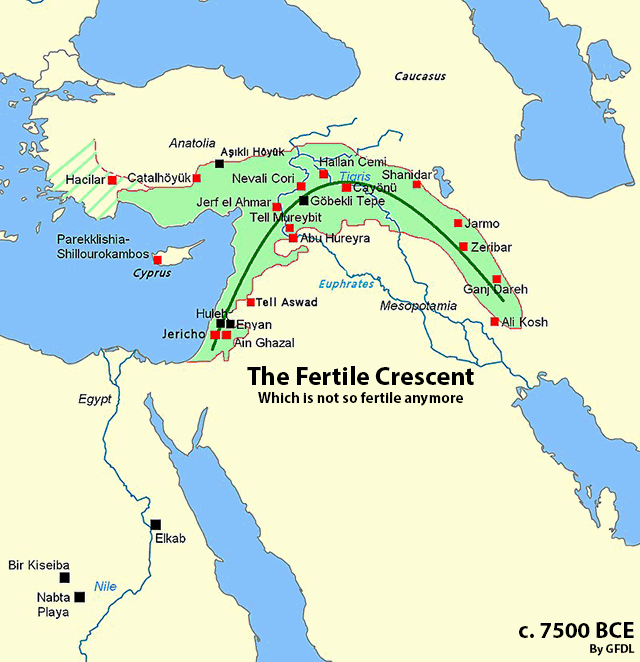
Imagine a world where humans live in harmony with the rest of life on the planet, one where we cause no species extinctions, where all our (and livestock/pet) food production is sustainable, where the human footprint leaves room for Nature. Imagine 7 to 35 million humans are living in that future.
Or imagine there are no humans. Degrowth is the condition that will come anyway no matter how hard we try to keep on growing the economy. The harder and longer we keep on keeping on to get bigger, the harder we of modern techno-industrial society, now global, will fall. Sorry about that.
Are there no solutions? Not for modern techno-industrialized humans. There is the Malta solution for our Malta problematique, but there may be no ecolate humans (or not nearly enough) to do the hard things now. About 99.999% of humans won’t like the solution even though they won’t like the non-solution (that comes later) even more—unimaginably less than if we were to “take up arms against a sea of troubles” now by doing what we can’t Like and Share or think and spread on social (or mainstream) media or even consider in the privacy of our own minds. Don’t like a story? Do what everyone does: don’t believe it. And then what?
The Malta SolutionlEric Lee
"Go, set a watchman, let him declare what he seeth."
— Isaiah 21:6
284. Why is it that the world is going through alot of big problems and challenges and there were no solutions to solve the problems?
I could say, ‘it’s complicated’ and go on at book-length because it is, but the short of it is that we who live in complex society are political animals, if not entirely by biology, then as modern techno-industrialized humans schooled by years of formal and informal alleged education. We take in as a given fact that all solutions must be politically viable and agreeable to clothed apes. For example, as everyone knows, we must work to grow the economy. Growth is the overshoot event that is the meta-problem of all big problems.
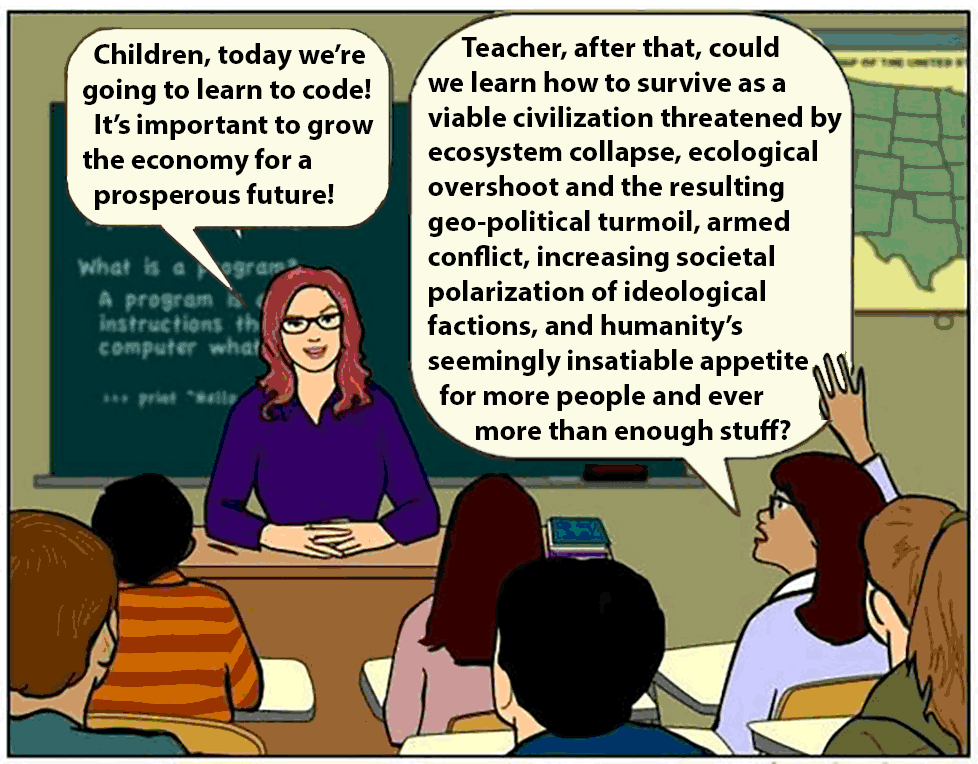
Of course, Nature doesn’t care what we like or dislike, so as big problems pile up high and deep, we cannot even think about what a real solution would look like. There are solutions, but there are no political solutions which are all our modernized primate brains can traffic in. For example, we cannot consider:
The Malta Solution
285. What's mankind's biggest, relevant, detrimental, and important problems?
“Biggest” would be the problem of which all others are symptoms. Is climate change humankind’s greatest threat such that if there were no change, everything would be fine, back to normal, would keep on keeping on? Or is climate change a symptom of something else?
Well, the something else has a name, overshoot, that comes with overgrowth, and includes overconsumption of planetary resources by too many humans. The cause is using a planetary larder of fossil fuels to turn biomes and raw materials into food, human/livestock biomass, and lots of stuff (for a time). This one-off plague-phase overpulsing of long term carrying capacity is the overshoot event we are living in (for a time).

It is entirely possible to graduate with highest honors from a top university and know essentially nothing about overshoot, carrying capacity, sustainability, or that there are limits to growth even if you are a STEM/STEAM/STREAM major....
286. Why can't this world be a global village without boundaries?
Humans until recently (last 10k years) lived as nomads, as had their hominid ancestors for over six million years, in band sized groups of typically 20 to 50 individuals from new born to elders with a range of ‘village’ size between 5 and 85. Any larger size was atypical and human biology does not make larger groups of over 150 (Dunbar’s number) work long term, and so, well, they don’t.
Bands tended to be matrilocal, would meet up with other bands periodically, and adult males married into other bands, so there was a shared culture and mostly peaceful relations except during times of scarcity. All bands were territorial as were groups of interrelated bands, tribes by shared culture. Humans (normal humans) are tribal animals.
In some circumstances, permanent settlements were possible, such as in the formerly Fertile Crescent where wild grains were abundant after the last ice age (early Holocene). Technology to gather, store, and process grains enabled settlements to become permanent and populations to increase beyond Dunbar’s number. The combination of technology and agriculture allowed humans to form complex societies that last for generations, but within 500 to 1500 years, fail to persist.

Agrarians did not respect the boundaries of hunter-gatherer nomads, and so when their population grew and they ‘needed’ more land to ‘make productive’, some would move to the next valley over and take it (agriculture supports 3–10 times more people, so guess whose point of view tended to prevail?
Without enforceable boundaries, anyone could go anywhere and take what they wanted, and some would. Those who did would prosper and multiply. Leaders share the spoils of conquest. The result is the world of takers we now are, live in, and serve. Do you make money, have money, want more? Then you serve the system and share in the spoils.
The most enthusiastic takers are called leaders, whether in religion, politics, education, business, or media who seek to build empires, personal and collective. The condition is one of conflict between factions, tribes, and supertribes (e.g. nation-states, world religions, corporations).
Making the world safe for villages may be the only viable goal. Making the world one global village is not viable. To do the viable, make conquest by a stronger group of a slightly weaker one have no long term pay off. Start with a world of 900k villages. Each has a few guardians to protect and serve. If any village anywhere is ever attacked by another, all other villages agree to send one or more guardians, starting with nearby villages first on up to, if need be, all 900k villages, to reverse the conquest and neutralize the would-be conquistadores. If 50 villages joined forces to conquer nearby villages, their combined population might be 2,500 having less than a thousand warriors. But if five thousand other villages in the region send eight thousand armed and trained guardians to stop the conquest, they would. Empire building would have no pay-off, unlike it had for 10k years, and would soon be no more.
The problem with one big happy world of takers without borders is there would have to be more than enough for everyone and their dreams of avarice, but there isn’t. There are limits, except, perhaps, to avarice. There is scarcity (real or perceived) and conflict. Expect increasing scarcity in the 21st century.

287. Why is moral decadence on the increase in our society today despite technological advancement?
Normal humans were moral enough to persist for 300k years. With increasing numbers of humans living in, being products of, unsustainable complex societies, there is a loss of functional behavior (increase in non-functional behaviors that look like decadence until normalized). Complex society exceeds the normal critical mass of tribal humans such that in 8 to 12 generations, complex societies fail as they have been for for millennia. We modern techno-industrialized humans are nearly 8 generations into our fossil fueled Industrial Revolution. Technological advancement, e.g. TV, cars, smartphones, nuclear bombs and AI kill-bots, enables loss of functional (moral) behaviors. Sorry about that.
http://www.sustainable.soltechdesigns.com/critical-mass.html
288. Which empire is the most successful throughout history overall?
History is written by the victor, but none persist as the centuries pass, so history gets rewritten. But some scholars try to moderate their subjectivity to be as objective as possible, and so are never celebrated or rewarded by the current empire.
The current empire is the first global empire, and hence most successful by its own definition of success, i.e. growth, exploitation (of a planetary larder of fossil fuels, materials, fisheries, forests, soils…, people), and expansion (did I mention ‘global’?). There may still be a few indigenous fighting illegal logging (no enforcement, of course, as that would be bad for the economy) who may not yet be fully assimilated. But anyone who can read this in any language Google can translate to has been assimilated as likely were their ancestors going 3 to 12 generations back.
The the Portuguese, Spanish, British, Maratha, Ashanti, Russian, Siamese American, Sikh, French, Italian, Japanese, German, Soviet, and all other remnants of would-be sovereign empire builders had functionally merged into a global monetary empire by the mid-twentieth century post WWII. They did not go away, but were absorbed into, assimilated by, the empire of commerce that started in England as the fossil fueled Industrial Revolution whose center (fastest growth) shifted to North America, a continent for the taking, in the 20th century to climax in the Sino region as is happening now.

Hence, in 2353, the Wikipedia entry will note that the empire we all live in and serve has a name, the Euro-Sino Empire. Failed empires don't get to write history or even name themselves.
As H.G. Wells noted in 1933, “the existence of independent sovereign states IS war,” and so, as WWII made obvious, sovereign states had to end, (yet appear to continue). Error, ignorance, and illusion is good for business.
Global war was bad for business as usual. Of course, conflict in outlying areas that doesn’t threaten modern techno-industrial society’s production and consumption can be very good for business, and so continued with brief gaps caused by a temporary failure to make war. Nominally sovereign states are allowed to pretend, but all exist in and depend on a global economy that they and their citizens serve.

289. What is going to happen to the world when the planet Earth could no longer sustain its population?
I’ll assume ‘the world’ is Earth’s biosphere, aka planetary life-support system that humans are rapidly degrading, and by ‘its population’ means human population.
We Anthropocene enthusiasts are presiding over the greatest mass extinction event since the late Cretaceous, one that could rival that of the Permian mass extinction. A damaged biosphere will persist. Humans may not.
If humans go extinct this century (perhaps Klaatu comes and effects a cure), then some population biologists and systems ecologists guess it will take 10–15 million years to respeciate, to restore biodiversity. Others who know enough to have an opinion think it could take 15–25 million years.
When the biosphere (not ‘our’ biosphere) can’t sustain modern techno-industrial (MTI) humans in their current state of overshoot, Gaia will be able to recover. If humans cannot live without cars and screen time, then human extinction is one viable solution, though today’s MTI ones cannot imagine a planet without cars and smartphones (or humans being used by technology), Nature doesn’t care what we can’t envision.
In the 20th century humans introduced reindeer to three islands without predators to control their population. In each case they prospered greatly, exuberantly growing, enthusiastically consuming an island larder of lichens until they couldn’t keep on keeping on. In each case they prospered unto island self-extinction.
https://www.jstor.org/stable/20582The greater the overshoot, the greater the environmental degradation. We are nearing 8 billion humans (yes, Gaia, you have people). The bigger we get, the harder we fall. So far, we are following the St. Paul Island trajectory. Human society is vastly more complex, so loss of functional behaviors on the downslope may preclude recovery. Humans on prehistoric Malta collapsed to island extinction about 2500 to 2200 BCE. Humans on Earth Island will....
Without predators, the reindeer economists believed they had ‘decoupled from nature’. But it turns out that Nature doesn’t care what reindeer economists and all the other reindeer informed by them deeply believe.
Overshoot doesn’t mean illimitable growth beyond all limits. It means there are limits and climax will come followed by descent. Some species (e.g. locusts, lemmings) are adapted to one-off plague-phase overshoot and collapse, and don’t go extinct even regionally. Reindeer are not. As Joseph Tainter has noticed, human complex societies keep on collapsing to regional extinction. Humans are not adapted either.
Humans colonized Pitcairn Island, but were extinct on the island when the mutinous crew of the Bounty arrived. Humans arrived on Rapa Nui, built great monuments, climaxed, and were well on the downslope when Europeans arrived to enslave them. Whether conflict over scarce resources would have continued to self-extinction on Easter Island is therefore unknown.
Humans arrived on the islands of Malta about 5900 BCE and by 2500 BCE had build great monuments. By 2200 BCE they had collapsed to island extinction. Humans are pulsing globally in a one-off plague-phase overshoot event for the first time. The outcome is unknown, but asserting that human extinction could not be an outcome is entirely belief based with error, ignorance, and illusion pilled high and deep.

It is entirely possible to graduate with highest honors from a top university and know essentially nothing about overshoot, carrying capacity, sustainability, or that there are limits to growth even if you are a STEM/STEAM/STREAM major....
290. Why is life so unfulfilling for the majority of the human population?
Until recently, for 300k years, humans lived a life-driven purpose. They woke up and did what needed to be done that day, e.g. make needed stuff, hunt and gather, teach their own children, and tell stories about the campfire that no one was at risk of believing to be true.
During good times they may gain weight, but 70 percent were not overweight, nor 40 percent clinically obese. Vehicles were not the major cause of death for those between the ages of 4 and 29. Doing screen time was unknown. No one thought to complain about their meaningless, unfulfilling lives of quiet desperation.
Today we serve the modern techno-industrial monetary society we are products of. We live a purpose-driven life, the purpose being to make (take/steal) and spend money to consume stuff, little of which is actually needed. As a result, we moderns don’t know our needs from our wants.
Like rats in a Skinner Box, we press a lever or sit behind a desk as CEO of a multinational corporation, or turn tricks or seek public office. We ‘work’ to serve the system which is not remotely sustainable and selects for its own failure, a system that is presiding over the greatest mass extinction event since the late Cretaceous, one that turns humans into consumer-bots or kill-bots as needed to serve the economy (for a time), stupid.
291. How do you think humanity can work together to solve the world’s biggest problems?
Humans are tribal animals, but our ancestors didn’t normally live in tribes. Normal humans lived in bands. A tribe of nomads was a set of interrelated (typically matrilocal) bands that only occasionally meet up to share memes and genes (pair bond with someone in another band to then live in that band), who thereby have a shared language and culture with minor variation between bands, i.e. all had a tribal identity/narrative that tended to unite them.
For about 300k years there were no tribal leaders, no Lord of the Tribe controlling the bands. As nomads, humans must live in band-size groups most of the time, typically 20–50 (range 5–85). Only in recent millennia, as enabled by agriculture, have humans been able to live in oversized, overdensity populations in permanent settlements.
Humanity’s biggest problem is its failure to live within limits long term, such as living in too large of groups, so uniting all humans into one group would be the opposite of solving our biggest problem, overshoot, which involves exceeding both biological/social and ecological/environmental limits.
A real solution to our biggest problem would be to renormalize humans to live in band-sized groups that remain within the carrying capacity of the local biome that supports them (i.e. that they depend on, and will experience a die-off if they overshoot long-term carrying capacity). The belief that technology can increase carrying capacity without limit is what can be believed in for a time, until it can’t be, such as during rapid degrowth that no one votes for.
Human biology does not support living in groups larger than a maximum of about 150 (Dunbar’s number for humans), nor in nuclear families. Overshooting that limit creates problems that accumulate over multiple generations (typically over 8–12), leading to such dysfunctional behaviors that the social order becomes non-viable. The solution is not to unite people to form larger groups.
Humans living in larger than 150 person groups become complex societies, e.g. chiefdoms, that select for hierarchical control systems, overcomplexity, overgrowth, expansion, patriarchy (alpha males) and thereby their own failure. They also tend to overshoot environmental productivity, which also selects for climaxing the system and chaotic collapse. The combination of overshoot dynamics means all complex societies have failed, except for a remnant population of the Tairona, and the one, now global (MTI monetary culture), we all live in (for a time).
A viable complex society is needed to resist conquest by other complex societies that auto-organize to build empire when empowered by agriculture (and recently by fossil fuels), would involve managing band-size communities that manage individual family members. The maximum number of communities within a region, e.g. a watershed or subwatershed area, would also be in the 20 to 50 range to avoid being over-sized and involve a total population of 400 to 2500 people living in 20 to 50 communities.
Living long term in one place, enabled by low-intensity forager-farming is viable. Living in large groups is what has proved to be problematic. If there are 20 to 50 settlements in a watershed management unit, all would meet up periodically in a central rendezvous settlement occupied temporarily to avoid over-socialization, perhaps each full moon, for a few days, for example.
Assume no more than 20 to 50 communities within a watershed management unit (WMU, the tribal area defined by watershed boundaries). One representative of each community could meet in a group of 20 to 50 other representatives during a rendezvous to iterate towards consensus views, a group size that is not too large, that does not select for a hierarchical control system that favors alpha male types who favor empire building (creating chiefdoms on up to ever larger non-viable overcomplex societies).
Each small community (5–85) would know who their best and wisest elder was—it would be evident to most, and rarely would there be a lack of consensus. Until recently (the last 10k years), human evolutionary biology typically favored (selected for) matrilocal, matrilineal, and matriarchal bands of related Mothers who were the band’s de facto control system. If an individual, child or adult, was misbehaving per the Mothers, the Mothers would come to a consensus of what intervention might work. Modern humans lack sapience as such is not selected for, and so may take generations to relearn needed skills.
Men might rule the hunt and provide defensive leadership when the band was threatened, but most bands depended on foraging-gathering for most of their food, with hunting a valued addition, but failure of a hunt was not an existential threat (no one starved) except in those bands whose biophysical economy was heavily or exclusively dependent on hunting or later herding, e.g. Indo-European steppe cultures that were patriarchal, patrilocal, and patrilineal (and expansionistic conquerors).
Complex society selects for patriarchy, expansion, conquest, exploitation of resources and commoners by elites of either gender. Elites and commoners both share in the spoils of conquest and empire building that selects for overcomplexity and growth, which selects for long term failure of expansionistic complex society.
While living in band-sized groups might allow humans to recover functional behaviors (over perhaps 8–12 generations) the problem of overgrowth and expansion of complex society requires recognizing that only a non-empire-building complex society, or rather a federation of such societies, could prevent the empire building behaviors of others. Expect empire building behavior to arise because it always has where permanent settlements are possible. If it has a pay-off, then that selects for more empire building behavior.
The solution would be a federation of watershed management units (WMUs) where all members agreed to come to the defense of any member that is attacked. The combined counter force would have to be greater than that of any would-be empire builder. A WMU that was smaller/weaker than neighboring WMUs would thereby not be at risk of conquest.
If humans lived in 25k WMUs and one (or even a hundred) conspired to attack a weaker WMU, the combined counter-force of nearly 25k WMUs would be overwhelming, and hence no empire building would ever have a pay-off. Conquest, war, expansion, patriarchy, empire building would no longer have a pay-off and would be selected against.
But how can 193 sovereign nation-states become 25k WMUs interconnected for mutual support and defense? Well, they can’t, but the current modern techno-industrial global monetary culture is not remotely sustainable, meaning it will fail.
A United Federation of Watersheds may not replace it. Post collapse, regional warlords and demagogues may compete to build empire and repeat the pattern until they can’t. If humans go on repeating the pattern, there will be no viable outcome.
But no biophysical laws of the universe would be violated if some humans had enough foresight intelligence to foresee things to come (in terms of trajectory, i.e. overshoot followed by collapse) though not in any details. Starting with a vision, then making it so, would be alternative to more business as usual.
If 0.01 percent of humans voted with their feet to form 45 WMUs as modern techno-industrial (MTI) society slips and slides on the downslope, living in WMUs could become the pattern that prevailed, that enabled humans to persist as the millennia pass, rather than remnant populations of marauding MTI humans endeavoring to repeat the pattern of overcomplex overgrowth until they can’t.

As E.O. Wilson has noted, we are ‘playing a global endgame’*, and we are playing it badly, i.e. non-viably, putting Homo narrator at risk of extinction or worse (persisting, but only as a MTI tumor on the face of Gaia).
*'For the first time in history a conviction has developed among those who can actually think more than a decade ahead that we are playing a global endgame. Humanity's grasp on the planet is not strong. It is growing weaker. Our population is too large....' — Edward O. Wilson, Half Earth: Our Planet's Fight for Life 2016
291. Do you think humanity is capable of achieving equalibrium with nature? If yes, then when?
Humans did for about 300k years, until leaving Africa to become an invasive species causing megafauna (and other hominin) extinctions on five continents and numerous islands after which human populations declined and equilibrium was briefly restored until agriculture developed. As for whether modern techno-industrial (MTI) humans can achieve equilibrium with nature, then no, as MTI society selects for growth, depends on growth, on keeping on keeping on, which is biophysically impossible on Earth.
All MTI humans cannot believe in degrowth, which comes after overshoot, so they don’t believe in overshoot either. All must agree that the only viable solution is to expand outward from Earth to consume all resources in the Milky Way before going forth as posthuman longtermists to assimilate all galaxies in the universe. When this is achieved, some clever Borg will invent a way to conquer an infinite number of multiverses so growth can continue.
Or maybe MTI society/culture will collapse as all prior complex societies have. No law of the biophysical universe would be violated, however, if some humans recovered their original human nature and learned to understand the planet and live with it properly. Some might consider The Malta Solution.
Some might consider understanding the human predicament, our one-off plague-phase overshoot event that has no political solution. Who? Only those who would rather know than believe. When will humans live within the sustainable carrying capacity of Earth, without causing species extinction, while leaving room for Nature? When the human population is somewhere between 7 and 35 million depending on the level of per capita consumption, which could come, likely not by choice, by the end of this century.

It is entirely possible to graduate with highest honors from a top university and know essentially nothing about overshoot, carrying capacity, sustainability, or that there are limits to growth even if you are a STEM/STEAM/STREAM major....
292. Why are we divided by country? Is it important?
Modern techno-industrial society is the outcome of about 10k years of empire building from chiefdom to nation-state level. The dynamic of empire building selects for growth, exploitation, and ever larger size to project power and defend against other empire builders. Empire building (nation-state building) also selects for overcomplexity and overshoot, hence for its own failure
Size of empire was once constrained by distance as agriculturally empowered complex societies (aka civilizations), such as Imperial Rome, could only efficiently rule distant regions (e.g. Egypt) by using sea/water transport. The Romans found that transporting a commodity such as grain a 100 km overland by cart doubled its cost. Rome was able to conquer most of the current UK region, but did not derive much wealth given the high cost of distant rule. Ruling distant regions was a luxury Rome could sustain only for a time.
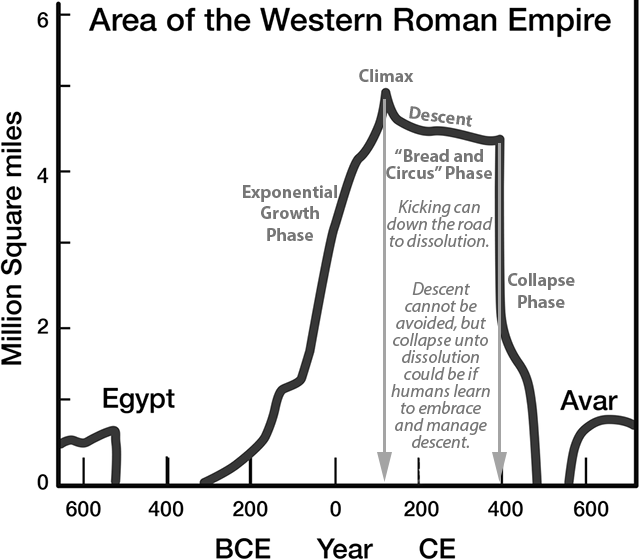
But with the advent of the fossil fueled Industrial Revolution, the British were able to rule the waves and much of the world until they couldn’t.
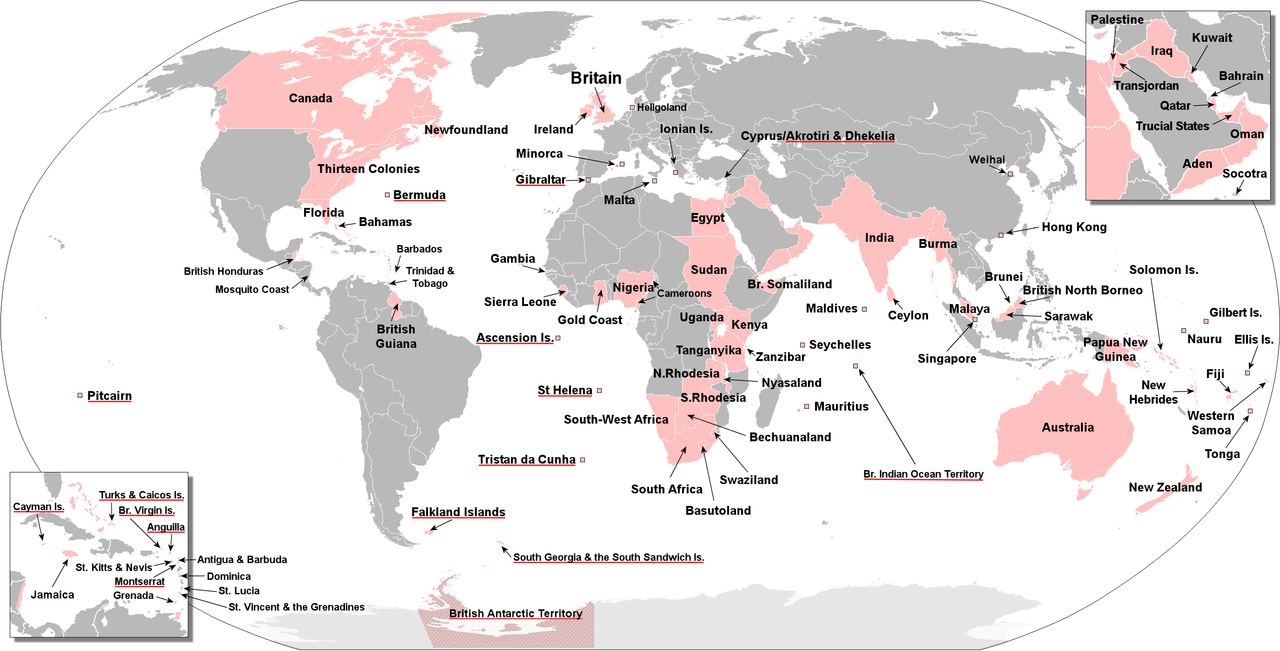
Distant elites were not as efficient in exploiting North American resources as local elites, nor were the Spanish able to as effectively rule at a great distance by sail.
1580–1640 CE (60 years, 370-310 BA): The Spanish–Portuguese Empire of the Iberian Union was the first global imperial entity.
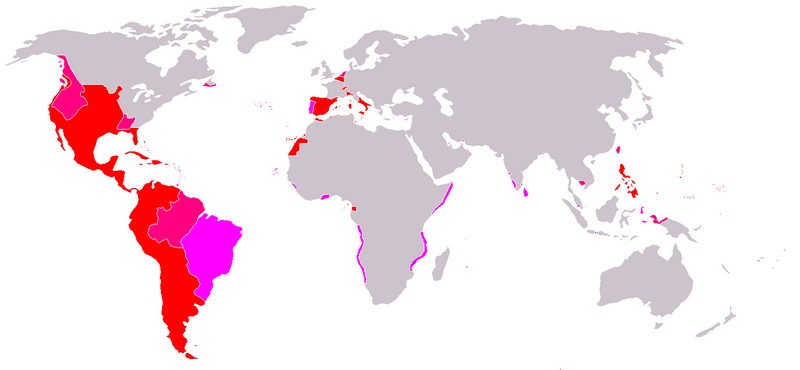
So the Americas became divided into sovereign states whose first order of business was to arm themselves for fear of conquest or in order to commit conquest. As H.G. Wells noted in 1933, 'the existence of independent sovereign states IS war'.
Is this important? Well, it is in the short-term self interests of sovereign nation-states, and so deemed important to ruling elites who share in the spoils of exploitation with commoners, so they usually enthusiastically go along with their short-term self interests too. By WWII there were over a hundred nation-states and world war was not looking like a good thing (was bad for business).
A consensus arose (51 nations founded the UN in 1945) to moderate the sovereignty of sovereign states (while pretending not to). Regional war in areas not vital to the global economy is quite profitable and so continued to determine who could take what resources, but global conflagration has so far been avoided (for a time) thanks to self interest and mutual assured destruction.
With increasing shortage of supply (or longage of demand), conflict can but increase. As H.G. Wells understood, the alternative to war is global governance, but humans have managed only to moderate their enthusiasm for territorial empire building by shifting to financial empire building (possible for a time).
When there was a planet for the taking, doing so served as a distraction, elites and commoners were mostly happy, but as resources become constrained (e.g. fossil fuels) and economies contract, expect the global corporatocracy to divide into three competing regions.
Conflict will be largely confined to disputed areas, leaving the urban centers of empire untouched. Growing scarcity will cause social unrest leading to civil war, or would, unless anger and rage are diverted to an enemy that is or can be made to seem like an existential threat. The two weaker powers will align to prevent conquest by the third power. Of course when the third power weakens, it will form an alliance with the weaker of the two former enemies when the new strongest power becomes a threat to the two weaker. In this way conflict and war in the disputed areas becomes sustainable, and civil war prevented.
The three powers may be called Eurasia, Oceania, and East Asia. Or perhaps to avoid being too obvious, they will use different names. As long as each can send the angry and enraged to disputed areas to kill each other (instead of burning cities at home), then the system could keep on keeping on, assuming humans can manage to create a tripartite global order.
Alternative would be to forego conquest, expansion, growth for its own sake, empire building (chiefdom, city-state, nation-state, religious, ideological, or financial), and stand down (from our hubris heights) to live within limits such as Nature defines (humans don’t get a vote).
This would involve listening to Nature who has all the answers such as to questions of how many people and what level of consumption a biophysical economy of enough can sustainably support (by remaining well within the carrying capacity of the biome one depends upon, while leaving room for Nature, i.e. the services that ecosystems provide, e.g. a habitable planet).
Universal limits (including conquest/exploitation of Mother or weaker humans) equally applied to all implies global governance, a new world order, but people who would rather believe than know will surely continue to keep on keeping on until they can’t (i.e. will go extinct, likely within a few thousand years due to continued empire building assuming the tripartite solution or the Malta solution is avoided).

Empire, whether 193 of them or one modern techno-industrial global monetary one, selects for overshoot, both ecological overshoot (exceeding carrying capacity) and complexity overshoot (living in overdensity populations that select for an increase in pathological behaviors, e.g. a belief in belief, pursuit of short-term self interest) and loss of functional behaviors (e.g. trust, empathy, love, sapience, compassion, humilitas, cooperation).
It is entirely possible to graduate with highest honors from a top university and know essentially nothing about overshoot, carrying capacity, sustainability, or that there are limits to growth even if you are a STEM/STEAM/STREAM major....
293. Where were the first human civilizations born?
The concept of ‘civilization’ means different things to different special interest groups, so I use ‘complex society’ instead. The first was 10550 BCE – 7370 BCE (12500-9320 BP) created by grain enriched hunter-gatherers who could meet up for extended periods each year and work to build religious monuments:
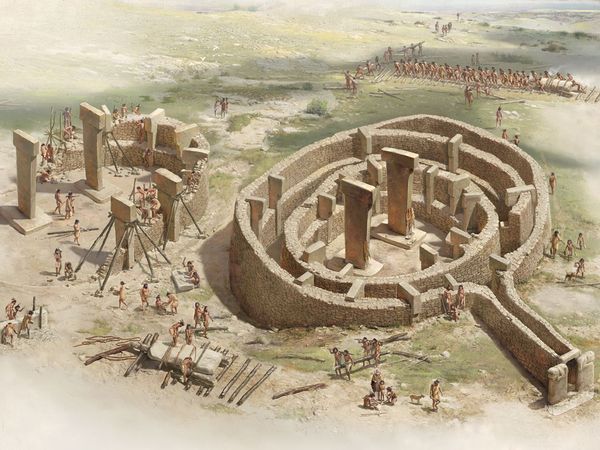 Göbekli Tepe and older sister site Karahan Tepe (10,550 BCE, 12,500 BP) are archaeological sites in the Southeastern Anatolia Region of modern-day Turkey featuring the earliest known massive monument building that was begun by hunter-gatherer nomads. As they were not united by force of arms, and the site is for ceremonial use on special occasions when the nomadic bands meet up, the site is evidence for the first Empire of Belief that enabled super-tribalism, the exceeding of Dunbar's number, created by a priest/storyteller whose narrative spreads to the storytellers in other bands who come to tell the viral tale.
Göbekli Tepe and older sister site Karahan Tepe (10,550 BCE, 12,500 BP) are archaeological sites in the Southeastern Anatolia Region of modern-day Turkey featuring the earliest known massive monument building that was begun by hunter-gatherer nomads. As they were not united by force of arms, and the site is for ceremonial use on special occasions when the nomadic bands meet up, the site is evidence for the first Empire of Belief that enabled super-tribalism, the exceeding of Dunbar's number, created by a priest/storyteller whose narrative spreads to the storytellers in other bands who come to tell the viral tale.
Believing priests, former storytellers, turn humans into true believers and thereby prosper. The High Priestess or Priest can direct monument building during the regional gathering to hear the Word from on High. Priests and/or priestesses are elites lording over the minds of commoners, teaching them to believe in belief from early childhood. Elite religious hierarchies form before military empires are made possible by agricultural surplus. When chiefs come to rule chiefdoms, the priests are natural fellow elites who tend to support the armed empire builders by mixing the political this-worldly narrative with their own other-worldly religious narrative.
Agriculture enabled/empowered complex societies to arise worldwide. Though initially, e.g. prehistoric Malta, complex societies were religious, the presence of stored grain and other wealth for the taking in long term settlements lead to complex societies based on expansion, first as chiefdoms, then city-states, on up to nation-states and the current global monetary culture/corporatocracy we all live in and serve (though most pretend not to serve as only a very few do not, e.g. Ted Kaczynski).

294. Can technology save us, or is it our end?
Subjectively, technology is the best thing ever, with maybe a few exceptions like sex (sometimes), though technology helps there too. Objectively, it has enabled us to destroy a planetary life-support system, to be the cause of the greatest mass extinction event since the late Cretaceous, one that could rival that of the Permian. But apart from that, humans like using it. There are 287 million registered cars in the USA, more than 390 million guns, and over 294 million cell phones. How many Americans wouldn’t want more of everything? How many humans making $1/day wouldn't want to be an American (if only all the better to destroy modern techno-industrial society)?
Fire enabled Homo erectus and our ancestors to alter biomes to favor themselves. Subjectively the development of atlatl and Clovis point technology that enabled megafauna extinctions on four continents (Eurasia and the Americas) was almost as obviously great and good as the invention of cars and iPhones.
Today, due to advanced safety features, cars are the main killers of humans in industrial societies between the ages of 4 and 29, down from being the number one cause of death of those between 4 and 34 years of age. We love our cars and smartphones even more than our ancestors loved their fire and atlatls. Our ancestors did not choose to use technology. To have technology is to be had by it.
No one chooses to drive a car or spend 11 hours or more a day on screen time. You think you choose to, just as Borg think they choose to have implants (how could they live without them?), but thanks to technology we modern techno-industrialized humans are living in vastly greater error, ignorance, and illusion than ever.
A rat in a Skinner box is not exercising his freedom to press a lever. A variable schedule of reinforcement can cause a rat to ‘choose’ to press a lever until he dies. It would take a team of EMTs, using the Jaws of Life, to pry the average American out and keep him out of his car forever, or average young American’s smartphone out of their hands. TO HAVE TECHNOLOGY IS TO BE HAD BY IT, BITCHES.
Science is a way of knowing, one compatible with sanity. Science is sanity, or at least is compatible with sapience; technology isn’t. If we were sapient, Ted Kaczynski’s Technological Slavery (2010) and his newer book Anti-Tech Revolution: Why and How (2016) would be required reading in all colleges and his Industrial Society and Its Future would be read in all high schools, but if you’ve been paying attention, you may have noticed that technology’s song is being sung by all but some infinitesimal fraction of one percent of Anthropocene enthusiasts (i.e. everyone you know). Whose bread we eat, their song we sing, especially if we are a product of modern techno-industrial society’s education system.
Ted wrote An Open Letter to Greta Thunberg & XR (using a pseudonym of course) where this image appears:
I don’t believe in modern techno-industrial society. Do you?
295. Would it be better for humanity if the rate of change, especially in technology, slowed down?
Should we perhaps slow down the pace of our Technological Slavery? Should we consider dismantling the technosphere? Should we perhaps wage an Anti-Tech Revolution?
“The individual is in a dilemma: either he decides to safeguard his freedom of choice, chooses to use traditional , personal, moral, or empirical means, thereby entering into competition with a power against which there is no efficacious defense and before which he must suffer defeat; or he decides to accept technical necessity, in which case he will himself be the victor, but only by submitting irreparably to technical slavery. In effect he has no freedom of choice.” ― Jacques Ellul, The Technological Society
“I believe that a desirable future depends on our deliberately choosing a life of action over a life of consumption, on our engendering a lifestyle which will enable us to be spontaneous, independent, yet related to each other, rather than maintaining a lifestyle which only allows to make and unmake, produce and consume - a style of life which is merely a way station on the road to the depletion and pollution of the environment. The future depends more upon our choice of institutions which support a life of action than on our developing new ideologies and technologies.” ― Ivan Illich
Few Anthropocene enthusiasts question, or can question, technology, but the few who do are not obviously stupid. They have existential concerns for humanity and the biosphere, i.e. the future, which includes, some may hope, posterity.
“There may be tragic economic struggles, grim grapplings of race with race and class with class. We do not know; we cannot tell. These are unnecessary disasters, but they may be unavoidable disasters. Human history becomes more and more a race between education and catastrophe.... New falsities may arise and hold men in some unrighteous and fated scheme of order for a time, before they collapse amidst the misery and slaughter of generations. Yet, clumsily or smoothly, the world, it seems, progresses and will progress.... We have sketched too the gathering for a human sacrifice...: the body was bent like a bow over the curved stone of sacrifice, the breast was slashed open with a knife of obsidian, and the priest tore out the beating heart of the still living victim. The day may be close at hand when we shall no longer tear out the hearts of men, even for the sake of our national gods. Let the reader but refer to the earlier time charts we have given in this history, and he will see the true measure and transitoriness of all the conflicts, deprivations, and miseries of this present period of painful and yet hopeful change.” ― H.G. Wells, The Outline of History (1920) vol. 2, ch. 41, pt. 4
Wells could foresee grim things to come in 1933. He clearly saw that 'the existence of independent sovereign states IS war' and that 'a new world order', a Modern State (singular), was needed. The race with catastrophe was not to be won by developing more technology. The ‘new education system’ he envisioned is not the one that educated you or anyone living today. We are all products of a failed system serving education system, and so we modern techno-industrialized humans will not save the world or ourselves from ourselves. Sorry about that.
Wells envisioned humans becoming better educated and hence sapient, not better consumers/producers, not rats pressing levers faster in a global Skinner Box economy that is not remotely sustainable. What we’ll do is double down on what isn’t working. We’ll keep on keeping on developing technology, changing a complex system we don’t understand as fast as we can, while demanding alternatives to fossil fuel tech ― wind tech, solar tech, Dyson Dots, fusion…. Because we are clever apes, we’ll harness zero-point energy or use dilithium crystals to create energy too cheap to meter. Elon Musk will retire on Mars, and we’ll go forth to conquer new worlds and galaxies. Or not.
For 300k years the rate of change was unnoticeable from one generation of humans to another. For 300k years we didn’t travel faster than we could run. We didn’t have self-driving cars or condoms, but we persisted as the millennia passed. That may not be a claim we modern techno-industrial ones will be able to make.
We are well into a one-off plague-phase overshoot event. We will not slow the pace of planetary destruction. We will hit a wall of biophysical limits full speed ahead empowered by a firm belief that we know what we are doing (and what’s left of a planetary larder of fossil fuels). There may be no survivors as what may seem like a slow-motion collision unfolds over several centuries. Sorry about that.
It is entirely possible to graduate with highest honors from a top university and know essentially nothing about overshoot, carrying capacity, sustainability, or that there are limits to growth even if you are a STEM/STEAM/STREAM major....
296. You must cause the end of the world as we know it, with as much loss of human life as possible. No budget, what is your plan?
No budget, meaning I could spend all existing money, which is limited. There are always limits, constrains. Current global trade in dollars is about 19 trillion. To destroy modern techno-industrial society, the monetary culture, which is now global, as soon as possible, I would I would spend it all on global trade.
I would also make a sign with “Vote Liberal” on one side and “Vote Conservative” on the other side with smaller signs festooning my upper body saying “Vote Libertarian”, “Vote Green Party”, “Vote Ecolate Party”, and so on down the line.
I’ve done that, and after a few hundred hours walking about, I realized that’s what people do anyway, as the education system and all right thinking people tell everyone one this their whole live-long lives.
Everyone already knows that growth is good, that more is better, and that in a business as usual world everyone who wants to consume stuff should buy rather than steal stuff. Maximizing economic growth by keeping on keeping on will climax the system the soonest.
With peak everything, the longage of demand will finally collapse supply lines. Scarcity will increase conflict which will increase scarcity in a downward death spiral, a race to the bottom in which anyone who opts out of the race will be consumed. Chaotic collapse will kill the greatest number of humans, easily well over 99% or more.
Life on the downslope will be multigenerational, figure a couple centuries plus or minus a century. Those born and raised on the downslope will acquire abilities that may make it impossible for them to transition to a steady-state sustainable lifestyle, i.e. to be normal, functional humans like their ancestors were 10k to 300k years ago (unlike more recent ancestors). Overshoot and collapse may select for extinction as outcome, e.g. reindeer on St. Matthew Island.
Or reindeer on the Pribilof Islands.
Oh, but humans and rats and reindeer are different, so ecological ideas like carrying capacity and overshoot don’t apply…. Right, in today’s modern techno-industrial society you can believe what you want. It is written in the Quran, Bible, Constitution, the Universal Declaration of Human Rights, the TV Guide….
For as much loss of human life as possible, go for extinction. The greater the overshoot, the greater the chance of regional (which could be a planet) extinction. Humans went extinct island-wide on Pitcairn Island and perhaps would have on Rapa Nui if Modern Techno-Industrial people hadn’t come and enslaved them. But for a better example, humans lived on Malta, three small islands, for 3,400 years before overshoot and collapse to island self-extinction.
They (we) are doing the same thing again as part of a global empire of growth and exploitation for its own sake that we all live in and serve. We of Earth Island are doing what humans did in the Indus Valley region whose regional empire (complex society) climaxed about 1700 BCE and by about 1500 BCE (two hundred years post climax). There were no literate Harrapans left to tell the tale, so we, our historians, didn’t know the IVC (Indus Valley Civilization) had existed until archeologists began noting the evidence in the 1920s.
We have no prior experience of a global collapse of an interconnected complex society, but what happened on Malta may be a fair reckoning of what climax and descent on Island Earth may involve, e.g. island-wide extinction. There is a Malta Solution, but likely no one will opt for it as it fails to maximize short-term self interests.
So, I demand 19 trillion dollars a year be spent on global trade (or more if possible) and nearly 8 billion humans must (when old enough) work to grow the economy to climax the system, triggering a die-off of humans but not other life on Earth. It may seem like overshoot and collapse could be speeded up other than by working to grow the economy, but extinction, even near extinction, most likely will take overshoot and collapse (or a really large asteroid or nuclear conflagration, but that would harm other organisms perhaps even more than humans currently are). There are always limits, constraints. Such is the nature of things.
297. Who is going to emerge to lead all Nations to save the planet for our children and grandchildren? Will we be generation that failed all of mankind? We ignored and denied ourselves into extension? That is unforgivable.
This doesn’t sound like a homework question. Some questions are ones we humans should be asking. Some parents or college students wouldn’t like such questions if actual answers were expected, so any teacher who persisted in both asking and expecting/demanding serious, stand and deliver answers, would in effect self-select out of the education system whether they forced others to remove them by force or not.
At the very least they would become increasingly unpopular. Should we all expect/demand serious answers, solutions to our problematique that could be the death of our children and grandchildren? What if the outcome of our denialism is human extinction (i.e. of posterity)? Perhaps humanity could serve posterity by asking such questions.
If I were H.G. Wells, I’d quote myself from my book The Shape of Things to Come 1933, were I note that “the existence of independent sovereign states IS war.” If you read my 1920 book, The Outline of History, the idea that nation-states could save the planet from themselves and the monetary culture they enthusiastically serve, now global, would not occur to you.
H.G. Wells envisioned the solution: a new world order based on a New Education system, one where global governance manages man’s demands on nature’s resources to maintain a steady-state economy of enough (equitably for all, a managed population well within Earth’s carry capacity).
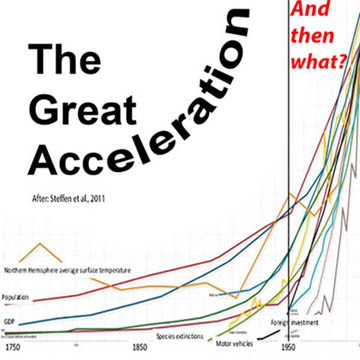 Wells noted in 1920 that humanity’s future was “a race between education and catastrophe.” By the 1950s, start of the Great Acceleration, the race was lost. We are all products of and serve the system that is well served by its system serving education system, one not as Wells envisioned.
Wells noted in 1920 that humanity’s future was “a race between education and catastrophe.” By the 1950s, start of the Great Acceleration, the race was lost. We are all products of and serve the system that is well served by its system serving education system, one not as Wells envisioned.
We who are dependent on and serve the global monetary system that selects for growth (and its own failure) have helped to perpetuate the failure of humanity to address Wells’ concerns, i.e. we helped to keep on keeping on to ensure we lost the race. It was in our short-term self interest to do so, a pathology normalized in the twentieth century (aka The Century of the Self).
298. How and why can human rights not be used to solve the problems in the world?
The Universal Declaration of Human Rights 1948 is a consensus document by UN wordsmiths declaring that all humans have the right to serve the system (the new post-WWII order envisioned) in which nation-states and corporations cooperate in extracting wealth from Earth’s crust and biosphere (to grow the economy), i.e. to consume this, our planet for the taking.
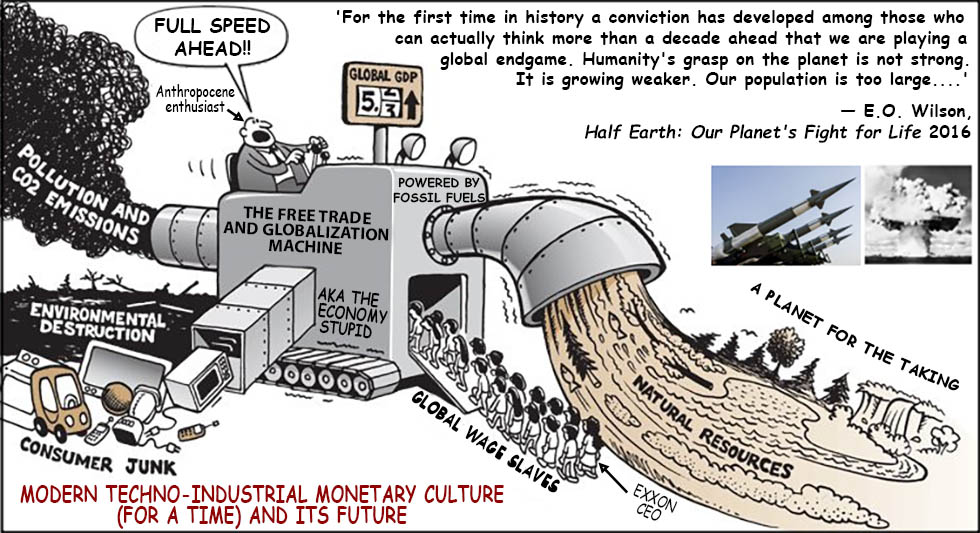
The merely eloquent pundits, global thought leaders, have endlessly nuanced their consensus thinking since to argue for refinements. The problem is that all our problems are secondary to our failure to live as responsible members of a planetary life-support system, i.e. to asserting our human rights. We pursue the short-term contingencies of self interest because that is the dynamic that technology plus a planetary larder of fossil fuels and resources for the taking selects for. Behold Lord Man.
Human rights empower we modern techno-industrialized humans (but not life on Earth or humanity’s posterity). So when you see or hear the word ‘right’, replace it with ‘power’. ‘I have the right to…’ becomes ‘I demand the power to…’ (e.g. abort my fetus or as fetus' have rights, I am empowered to force you not to).
I don’t speak Modern (or Postmodern or Ecomodern, or Meta-modern...), so I translated the Universal Declaration of Human Rights into reality speak.
Universal Declaration of Human Rights Translated
Universal Declaration of Natural Rights
299. What would you use to change the world for the better?
Love and understanding. Love of nature, the what-is, who has all the answers, of the planetary life-support system we depend on and all subsystems that comprise it, even pathological systems that cannot persist. Euthanasia can be an act of love and understanding. For example, my wife asked me to euthanize our Mary Poppin's dog (practically perfect in every way) when her time had come, I understood how. She died, loved, in our hands.
To change the world for the better, love and understand it, i.e. the human predicament, our problematique, our pathological condition of overshoot, the meta-problem of all existential threats to, ourselves and life on Earth, about which we could do something about if we understood what needed to be done (i.e. rapid degrowth).
For modern techno-industrial humans, the change that will not happen, due to our failure to love and understand, would be a rapid birth-off to avoid a die-off and continued destruction of Earth’s biosphere.
To understand something is to be delivered from it. The greatest shortcoming of humanity is our inability to understand the implications of the exponential function. Understanding would deliver us from our Anthropocene enthusiasm for growth, Acquiring understanding would be the precondition for change. Humans can be lead to understanding, but they can’t be made to drink.
It is entirely possible to graduate with highest honors from a top university and know essentially nothing about overshoot, carrying capacity, sustainability, or that there are limits to growth even if you are a STEM/STEAM/STREAM major....
300. What percent of life on Earth is human?
If counting by numbers, then one prokaryote sort of equals a small fraction of one eukaryote cell whether part of a multicellular organism or not, and clearly not one human or whale. So a percent question would be answered in biomass. One ton of bacteria equals one ton of whale less water content. So a ton of dried bananas is equivalent to a ton of beef jerky in terms of biomass. Measuring carbon content is easier than dry weight, so biomass is usually measured in weight of carbon embodied in a lifeform (on this planet we are all carbon-based).
If comparing human biomass to life on earth, then total the human biomass, divide by the total mass of all plants, animals, fungi, protists, bacteria, archaeans, and might as well include viruses and prions just because, and multiply be 100. I don’t know what percentage of primates are humans, but I’d be surprised if less than 99.9% of all primates are humans.
As for mammals, that’s were the 4 percent ‘wild’ comes from, but that includes all aquatic mammals like pinnipeds and cetaceans. Humans are land mammals, so best to compare human biomass to land mammal biomass.

As much environmental productivity on land and sea has been turned into humans, livestock, and pets (for a time) as possible, so non-wild mammalian biomass has greatly increased (for a time). Data can be presented in various ways.
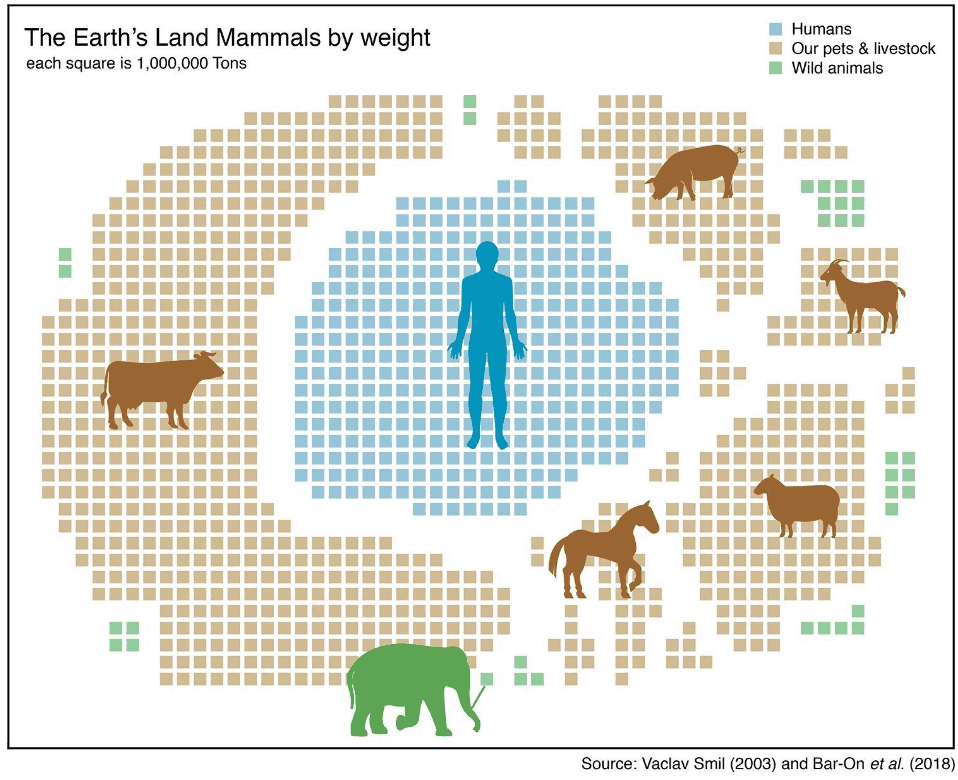
The elephant, 34 squares, represents all land mammals (including bats). All mammals are animals, but the green squares are mislabeled.

Animals include arthropods and worms, and birds….
\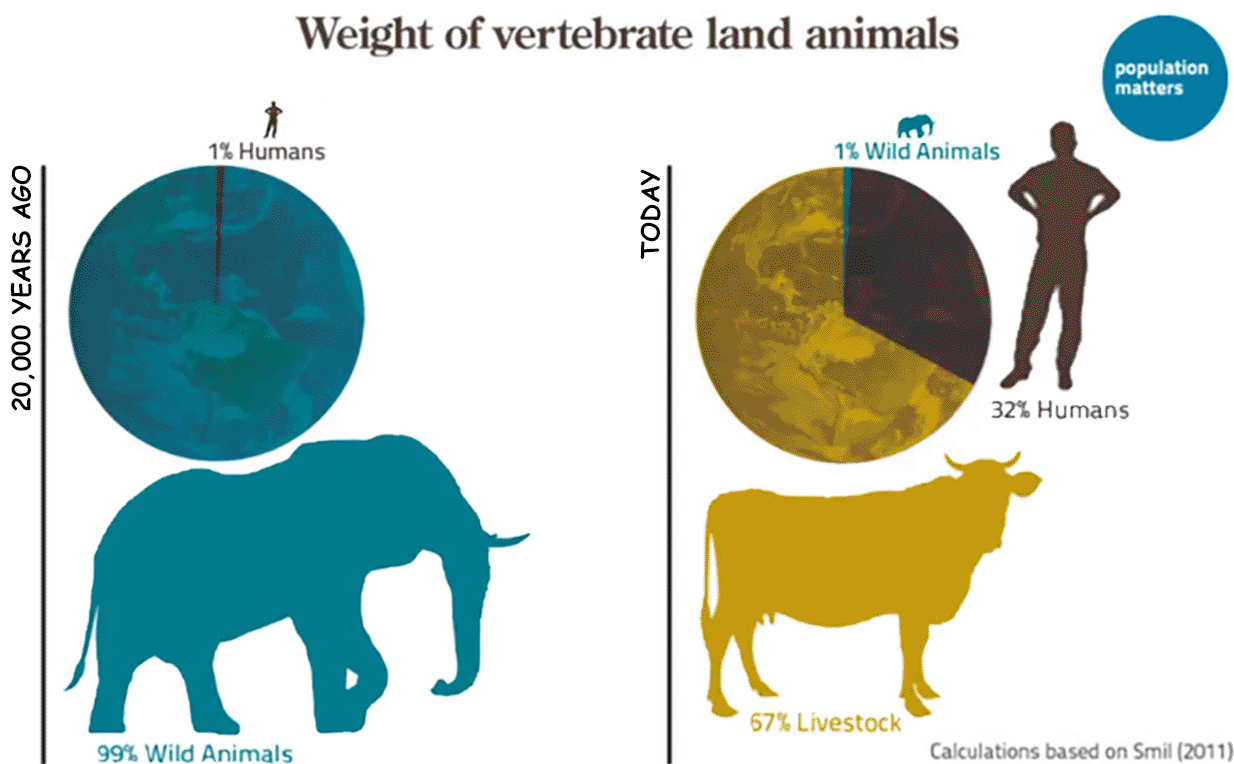
Humans and their livestock and pets are now, for a time, about 99 percent of vertebrate land animal biomass. The condition on the right is not remotely sustainable. Sorry about that. In one hundred years, the percentages may not change much, but given the Anthropocene mass extinction event that could rival that of the Permian, the total animal biomass in 2121 may be some fraction of what it is today. Mass extinction involves a loss of biodiversity and biomass.
As for percent of total life on Earth, most life biomass is in the form of plants.
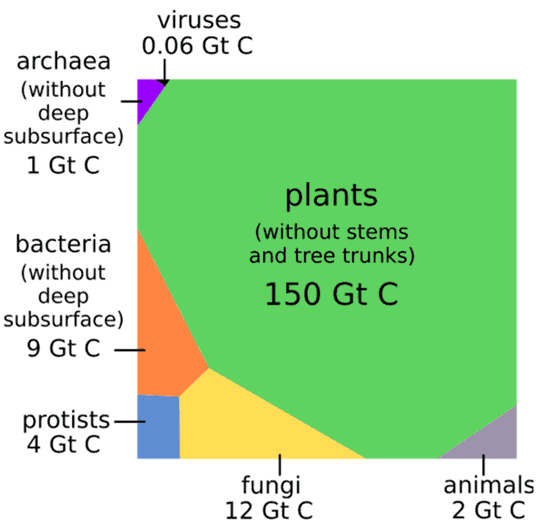
And yes, humans are animals.
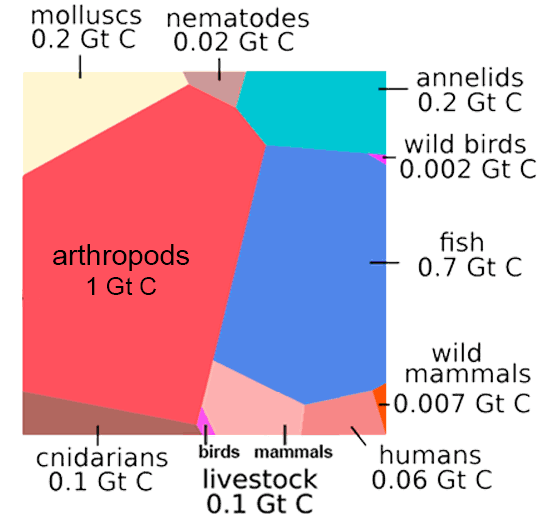
So, just by looking, humans are a small percent of life on Earth. Most modern techno-industrialized Anthropocene enthusiasts (who believe in growth because growth is obviously, for a time, the best thing ever) have no hesitation dismantling Earth’s biosphere (life-support system) if doing so increases short-term self interests. Sorry about that, posterity.

